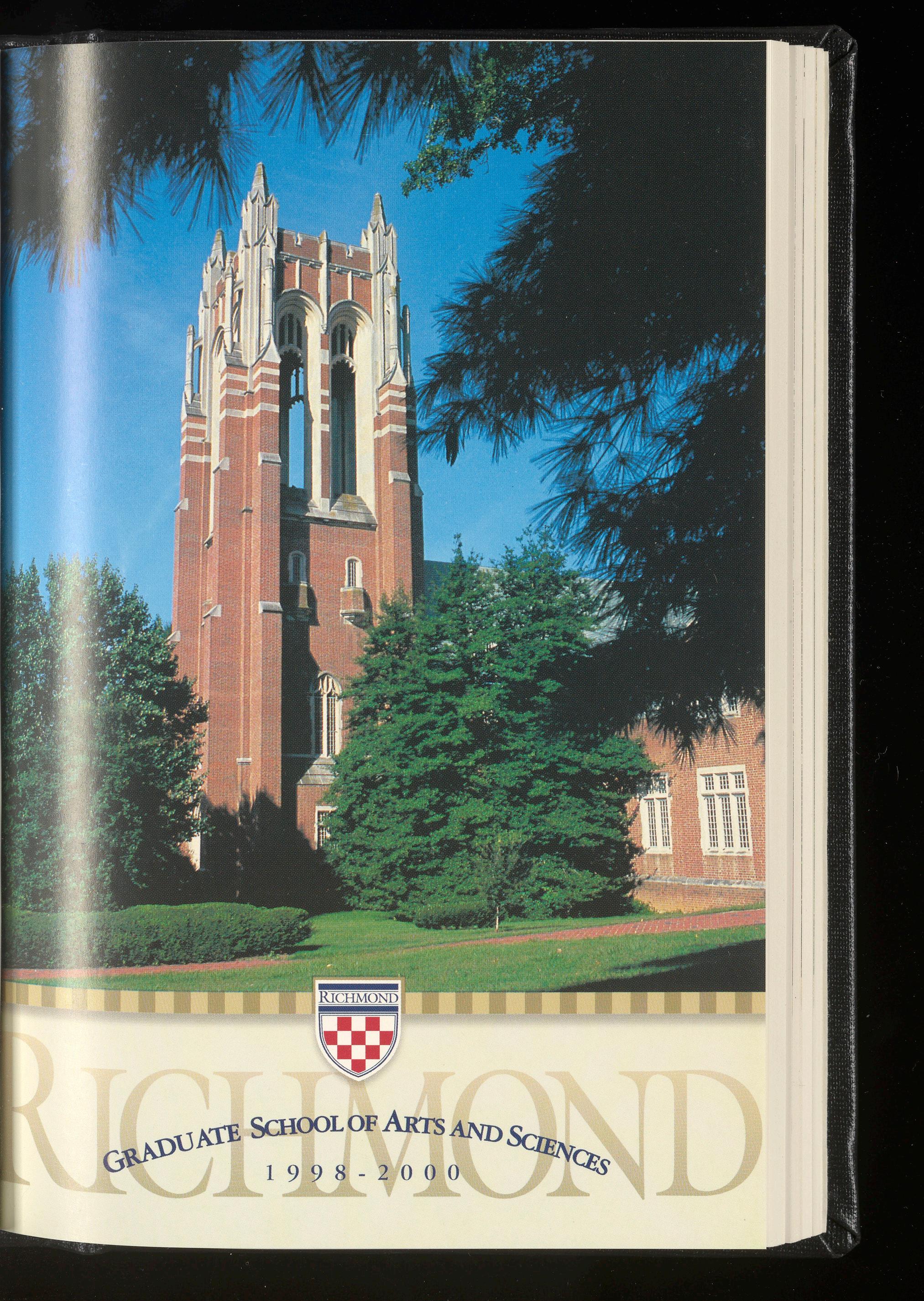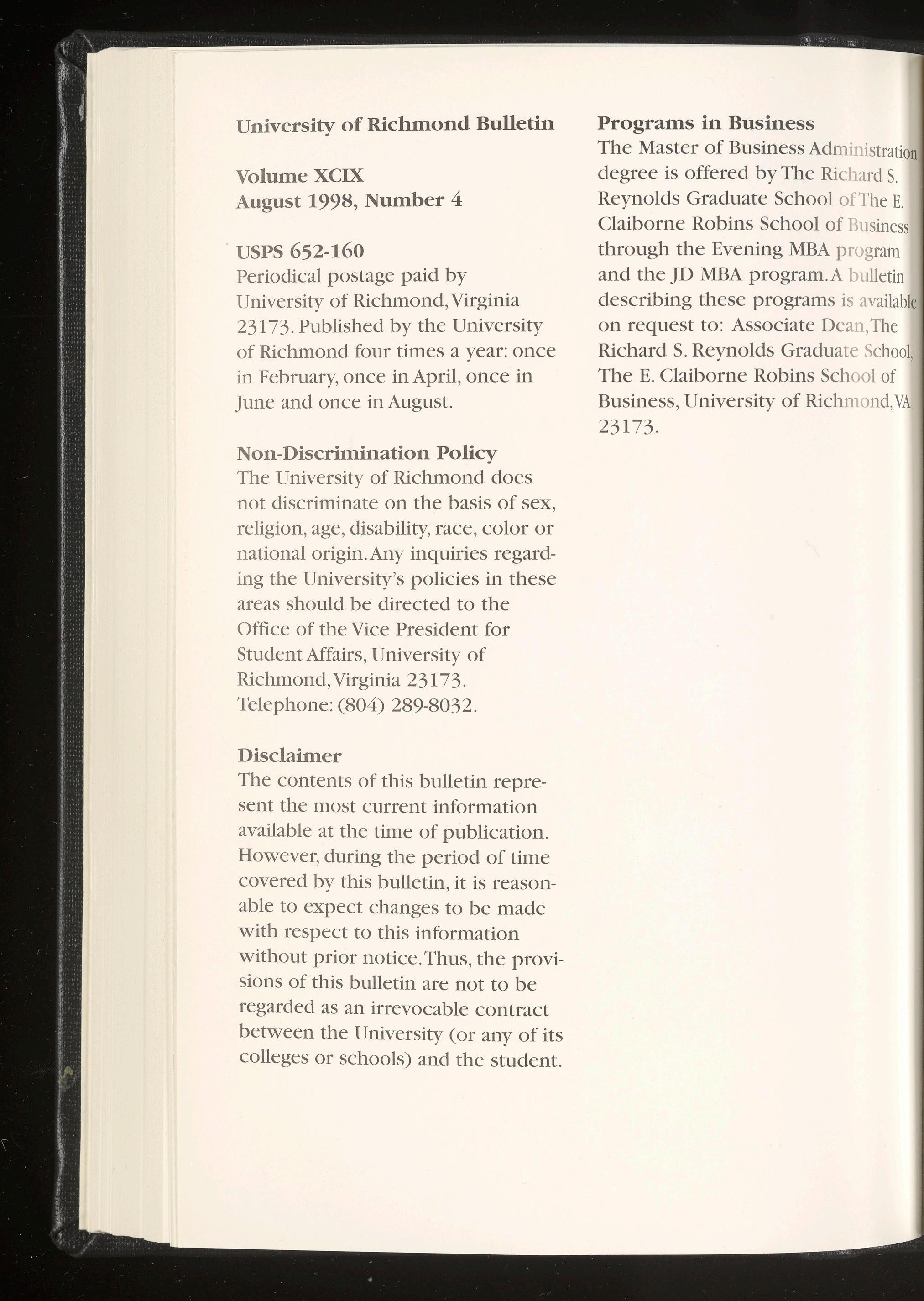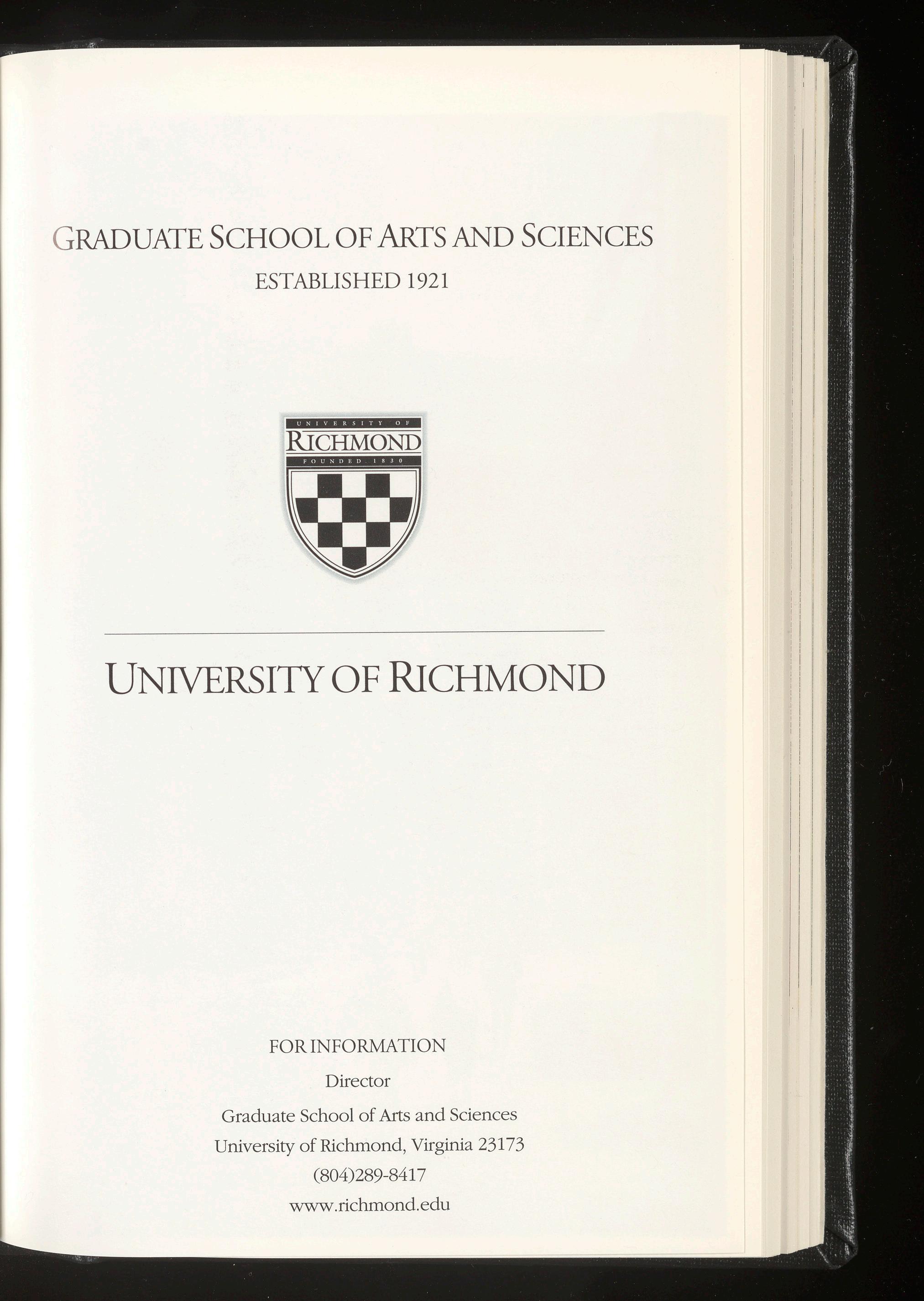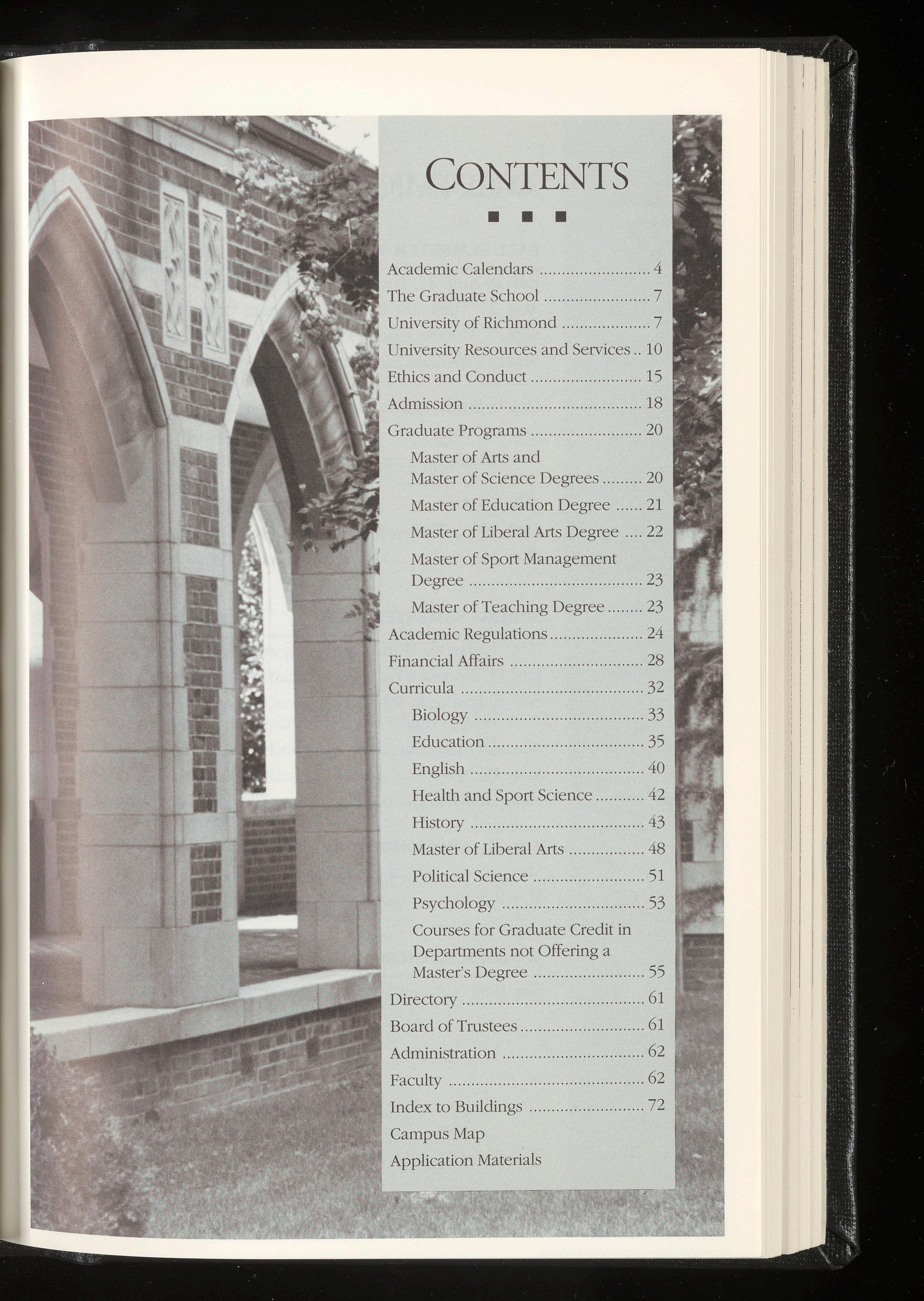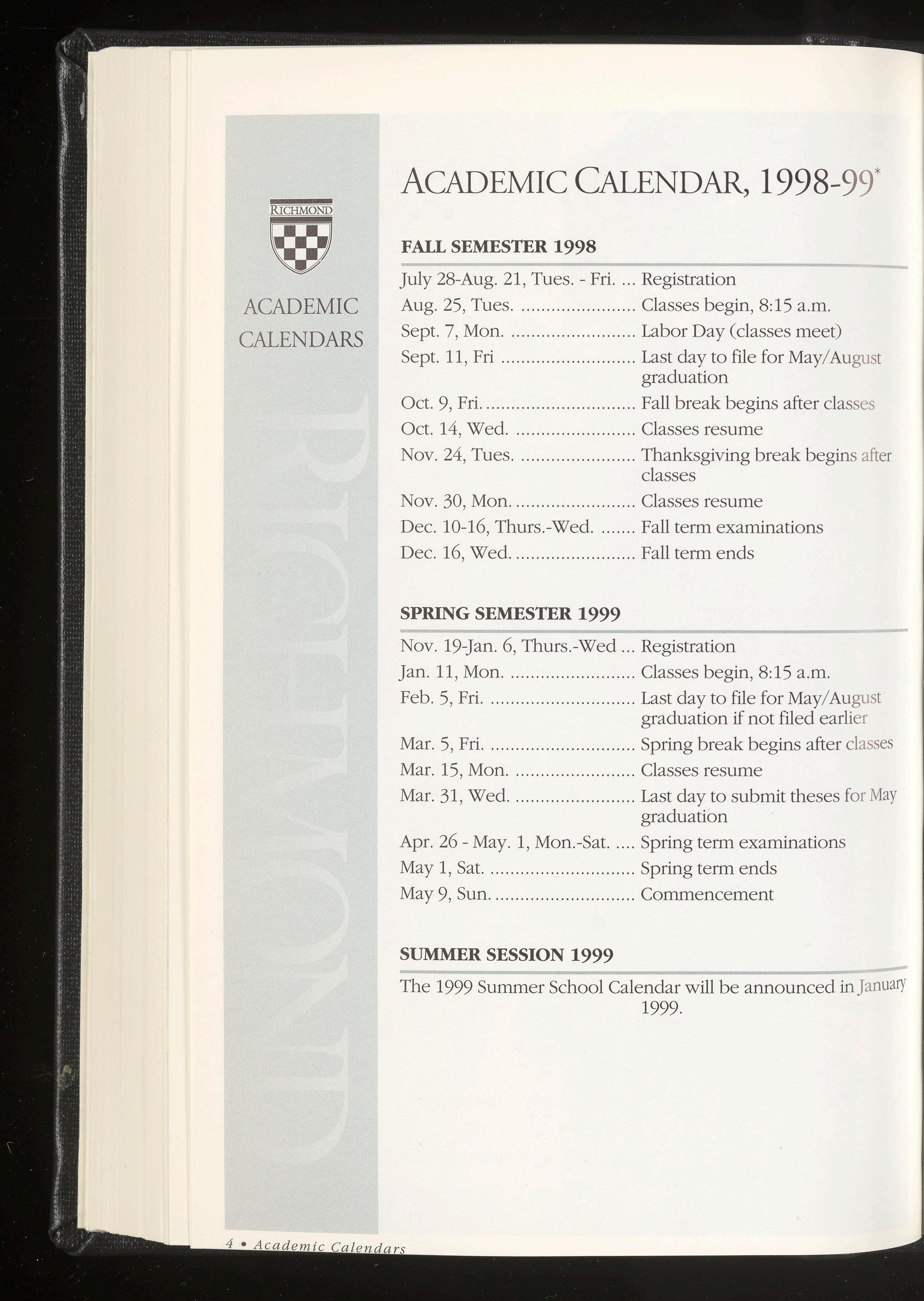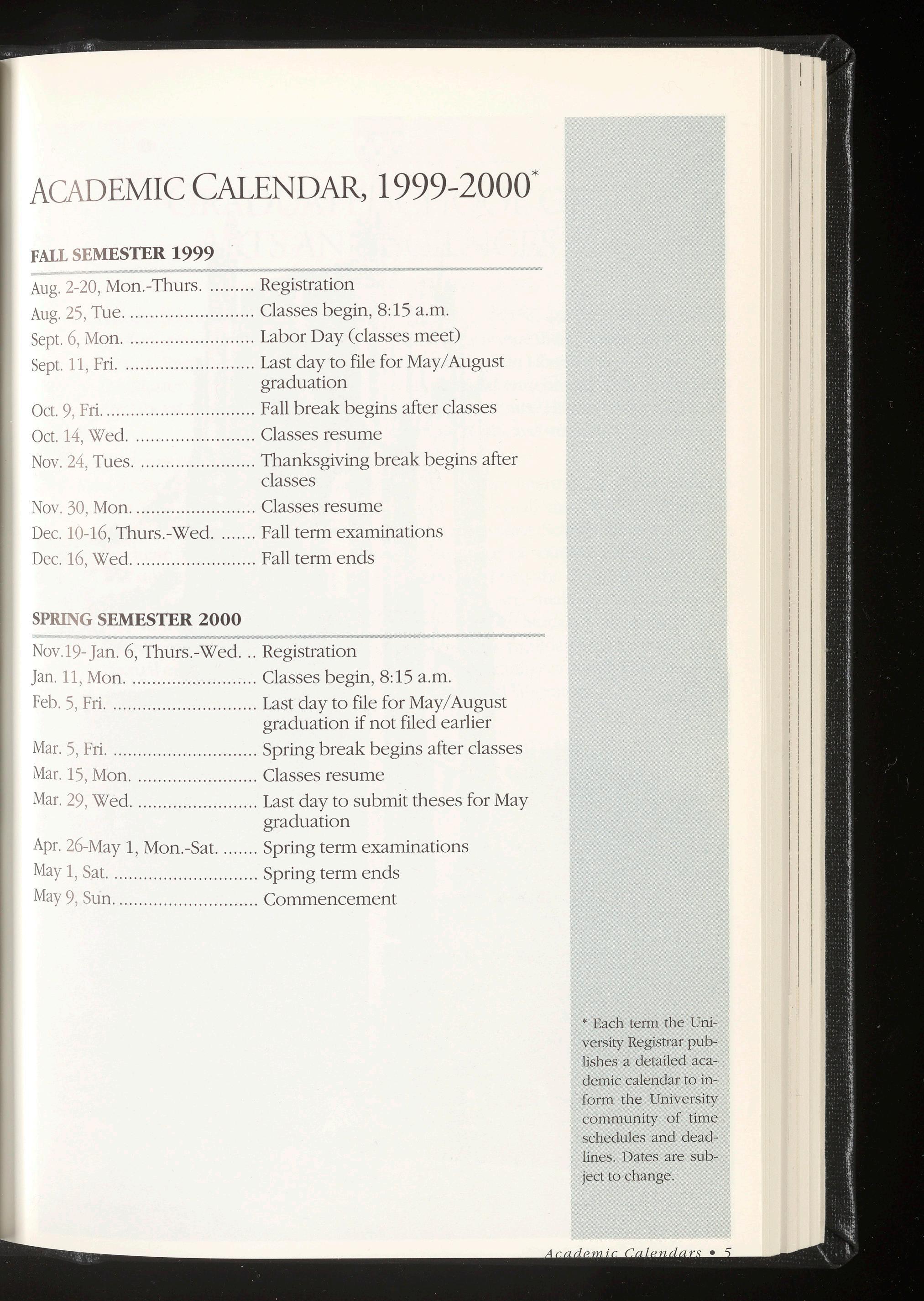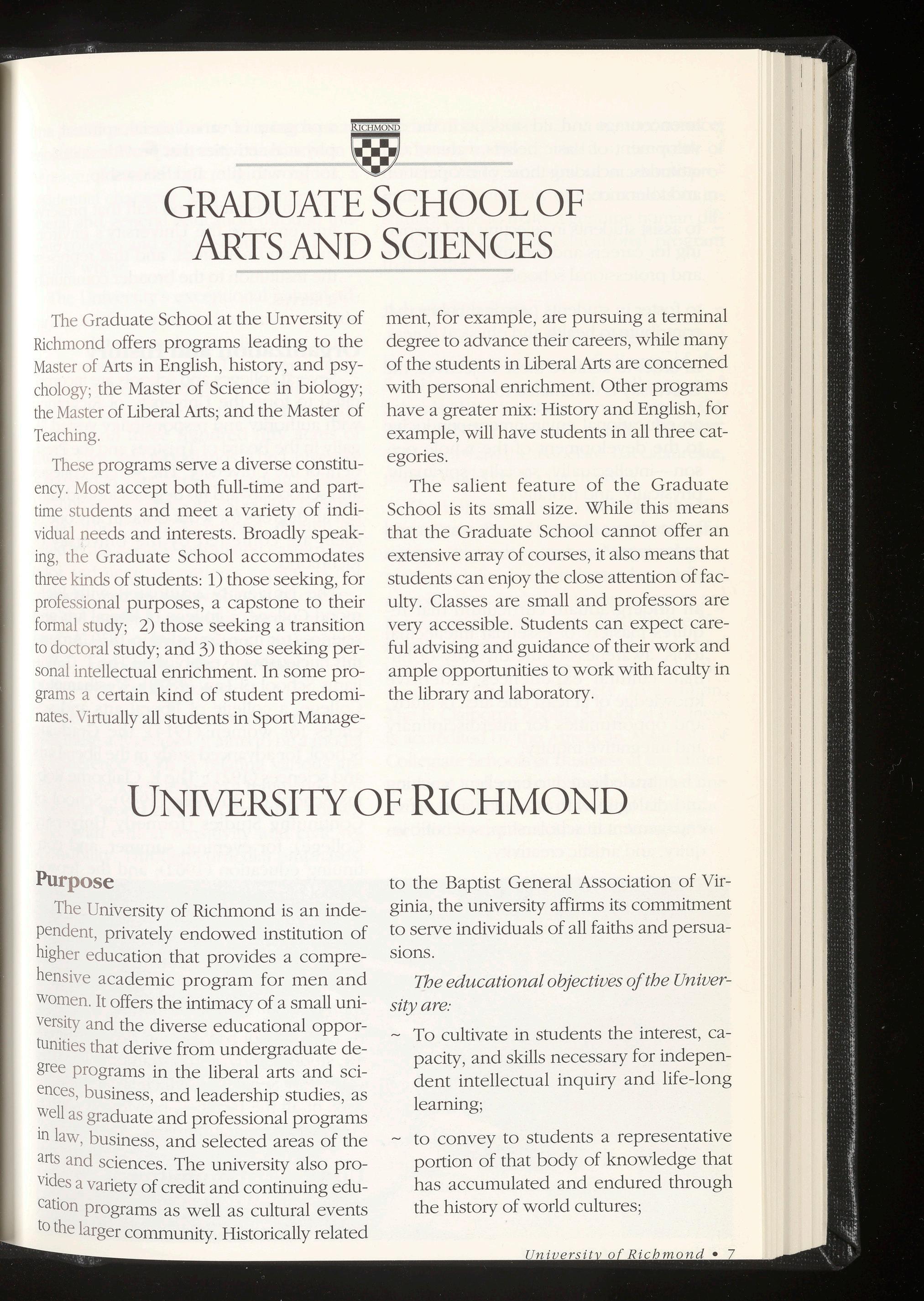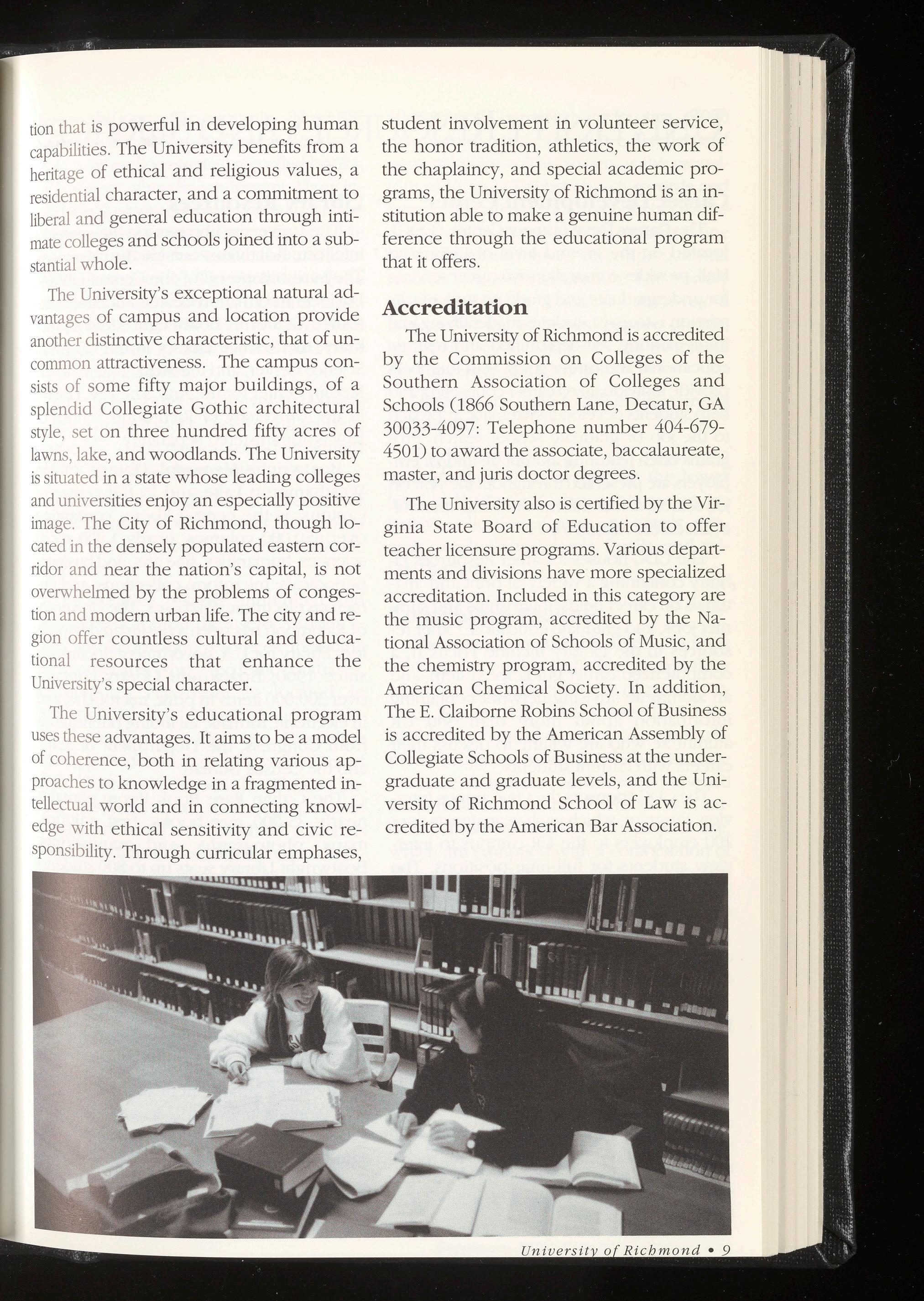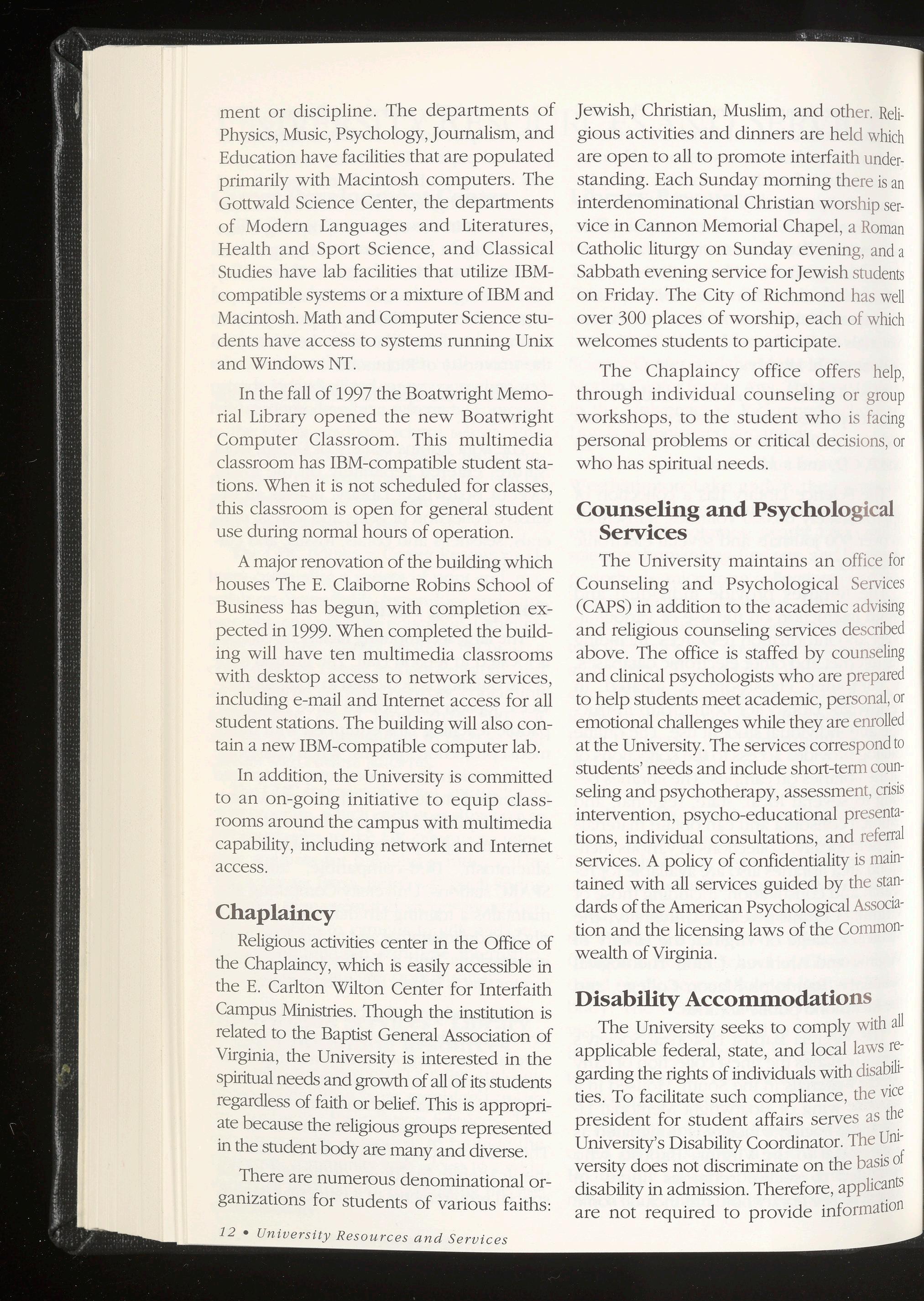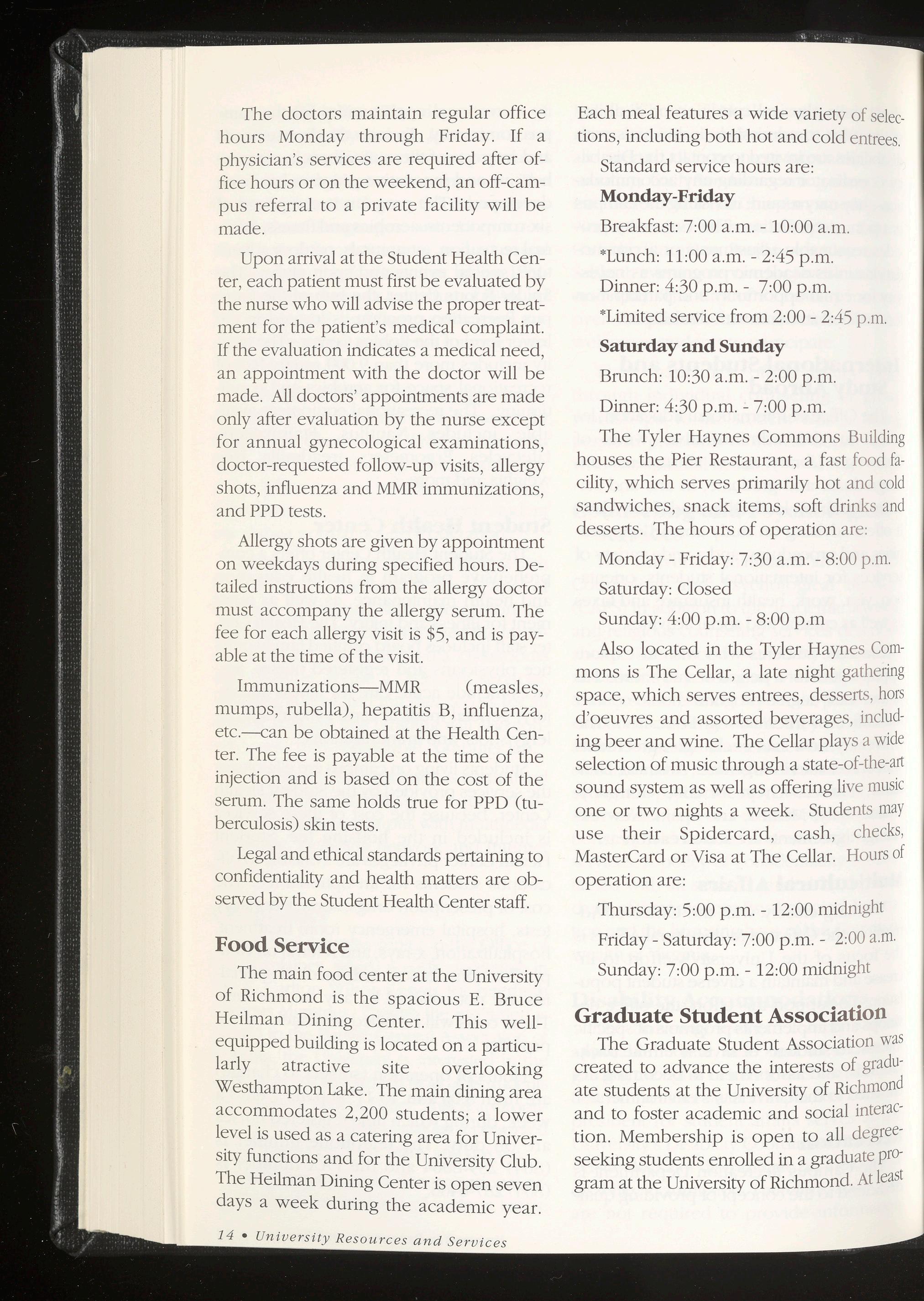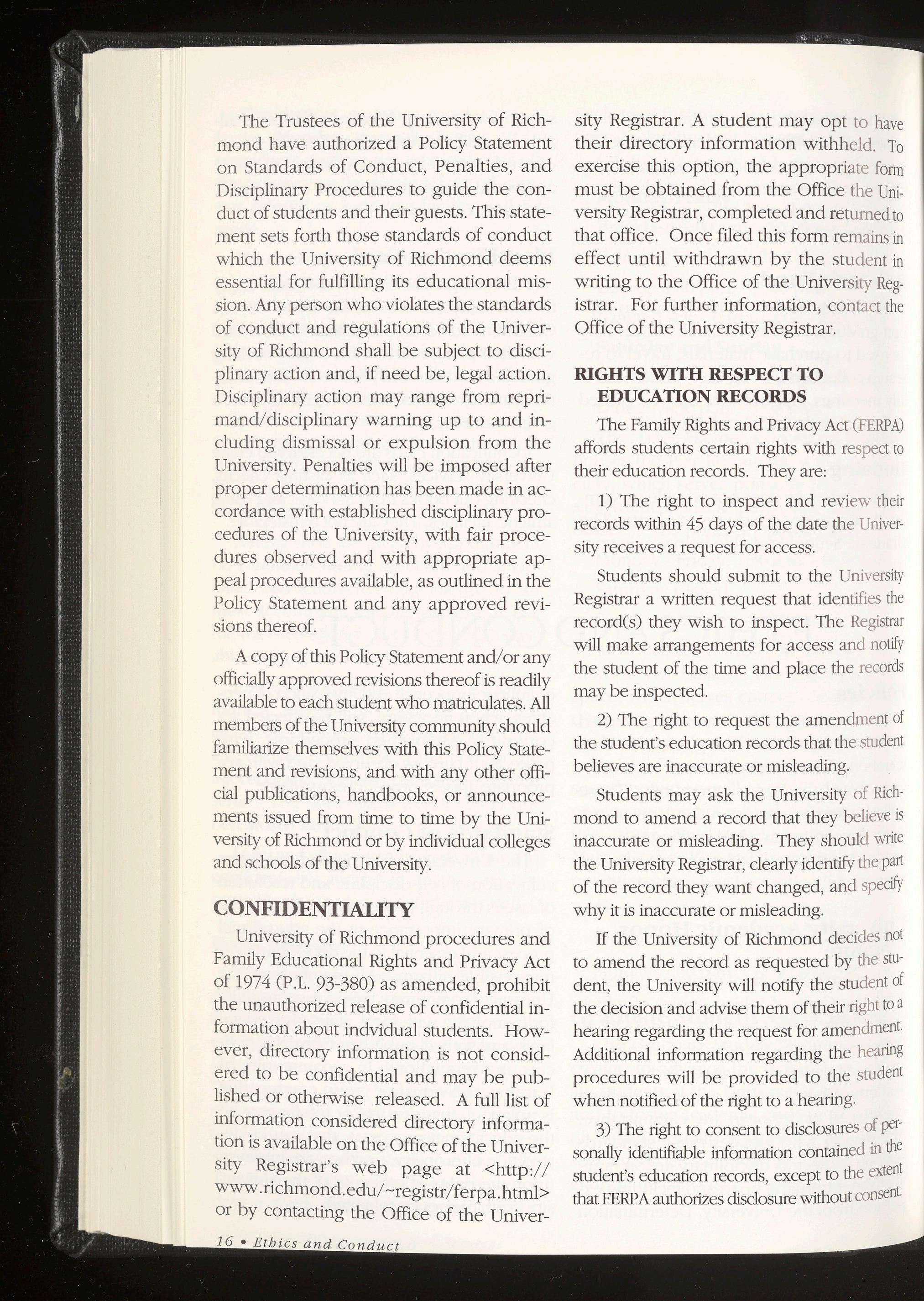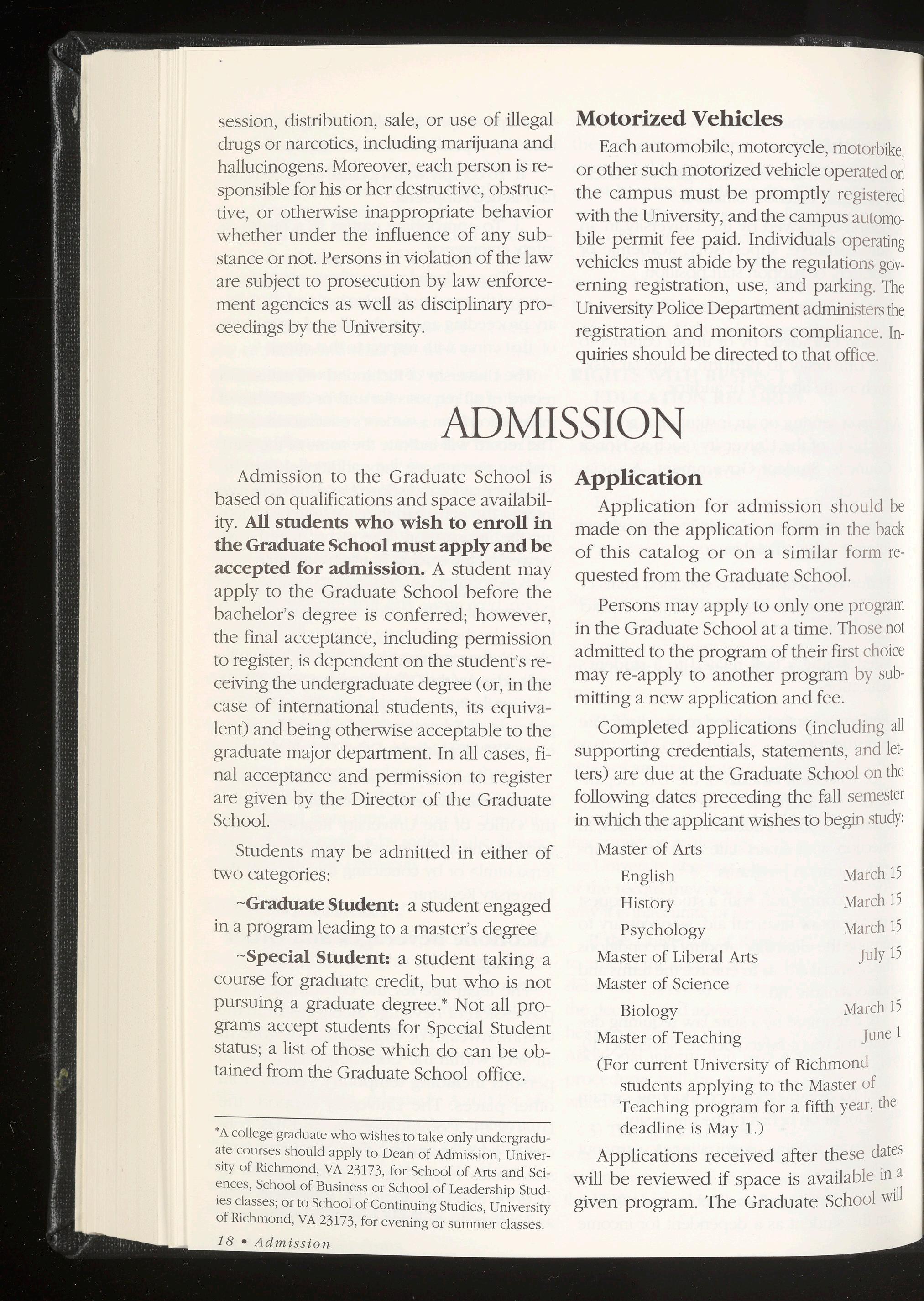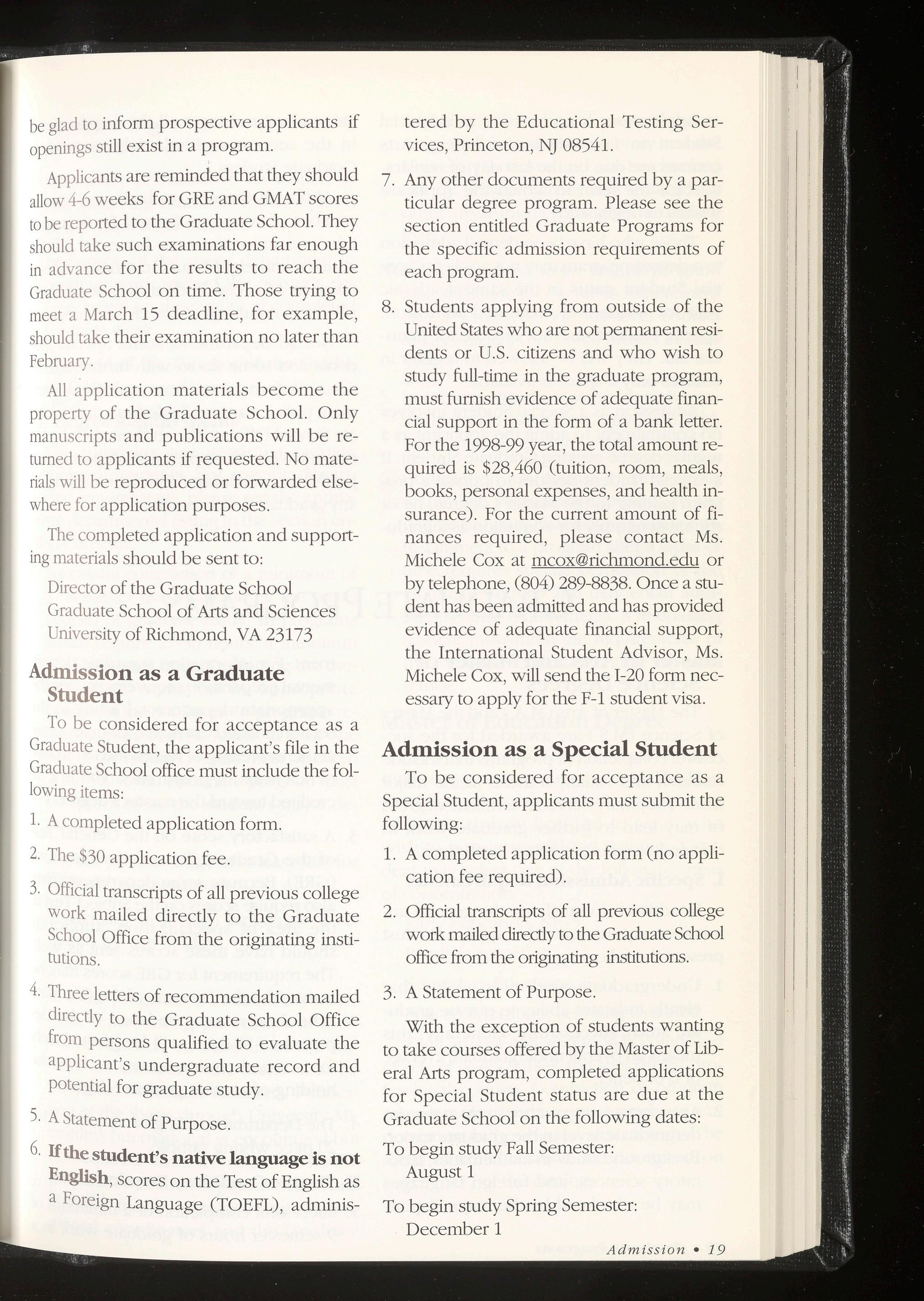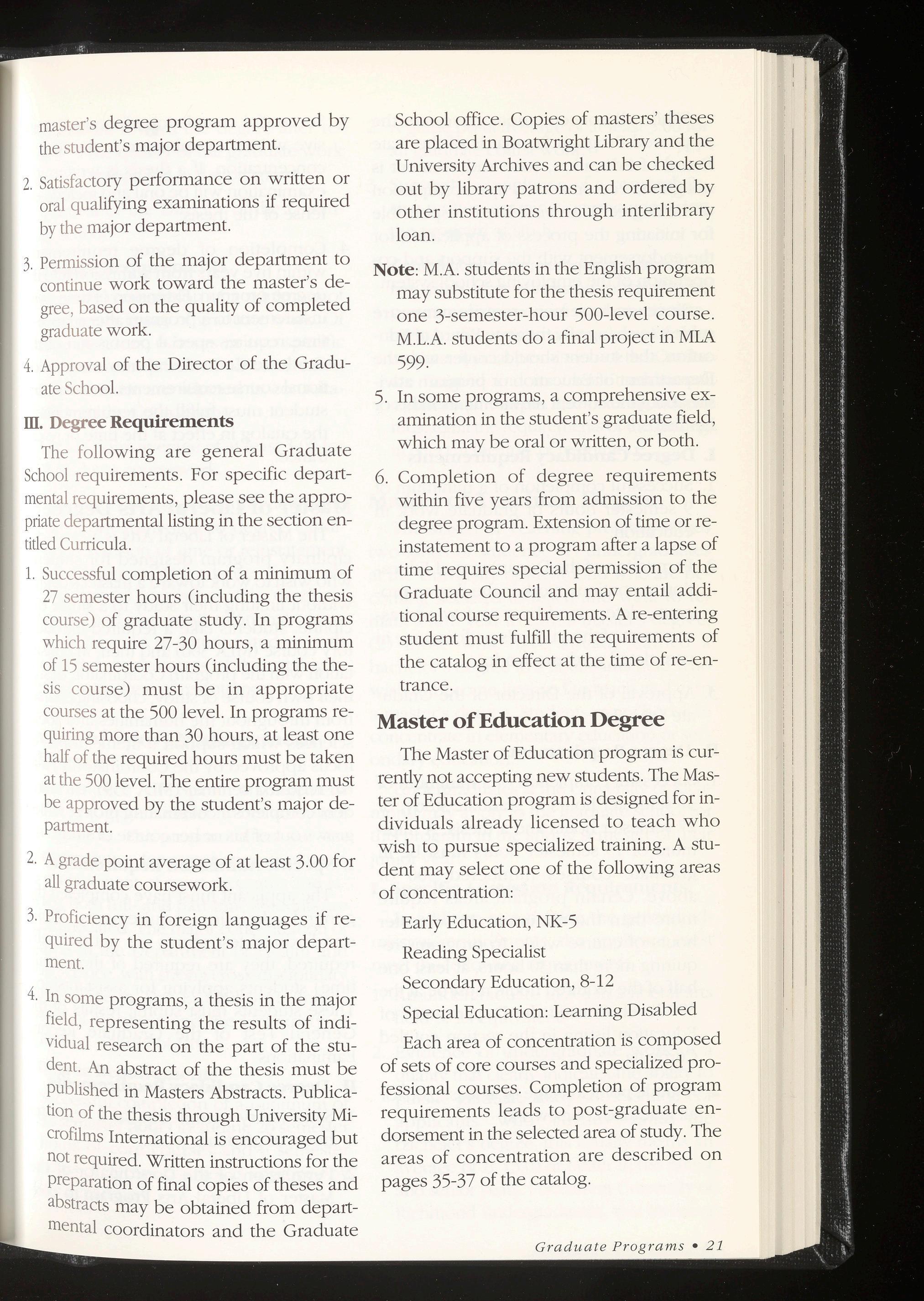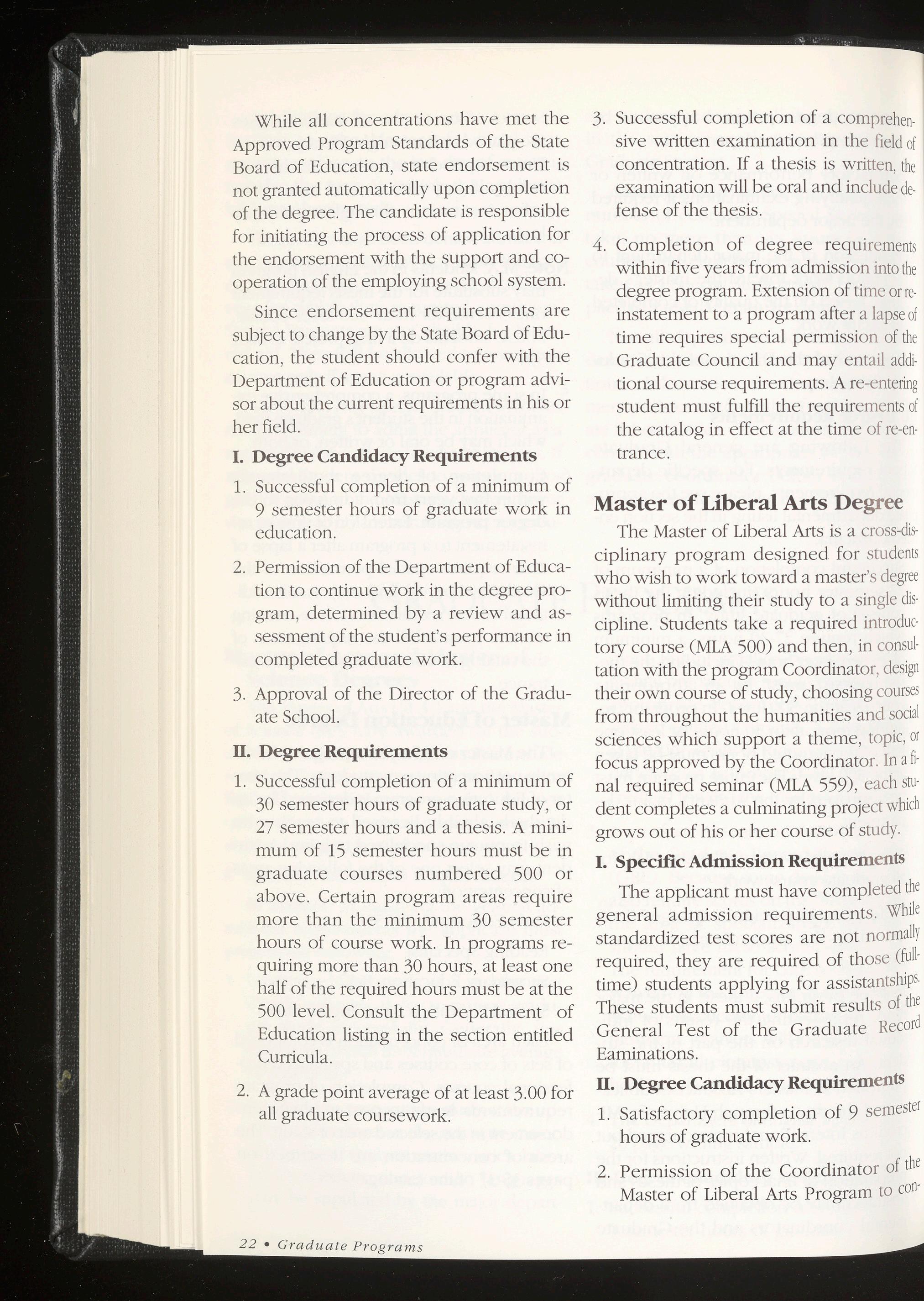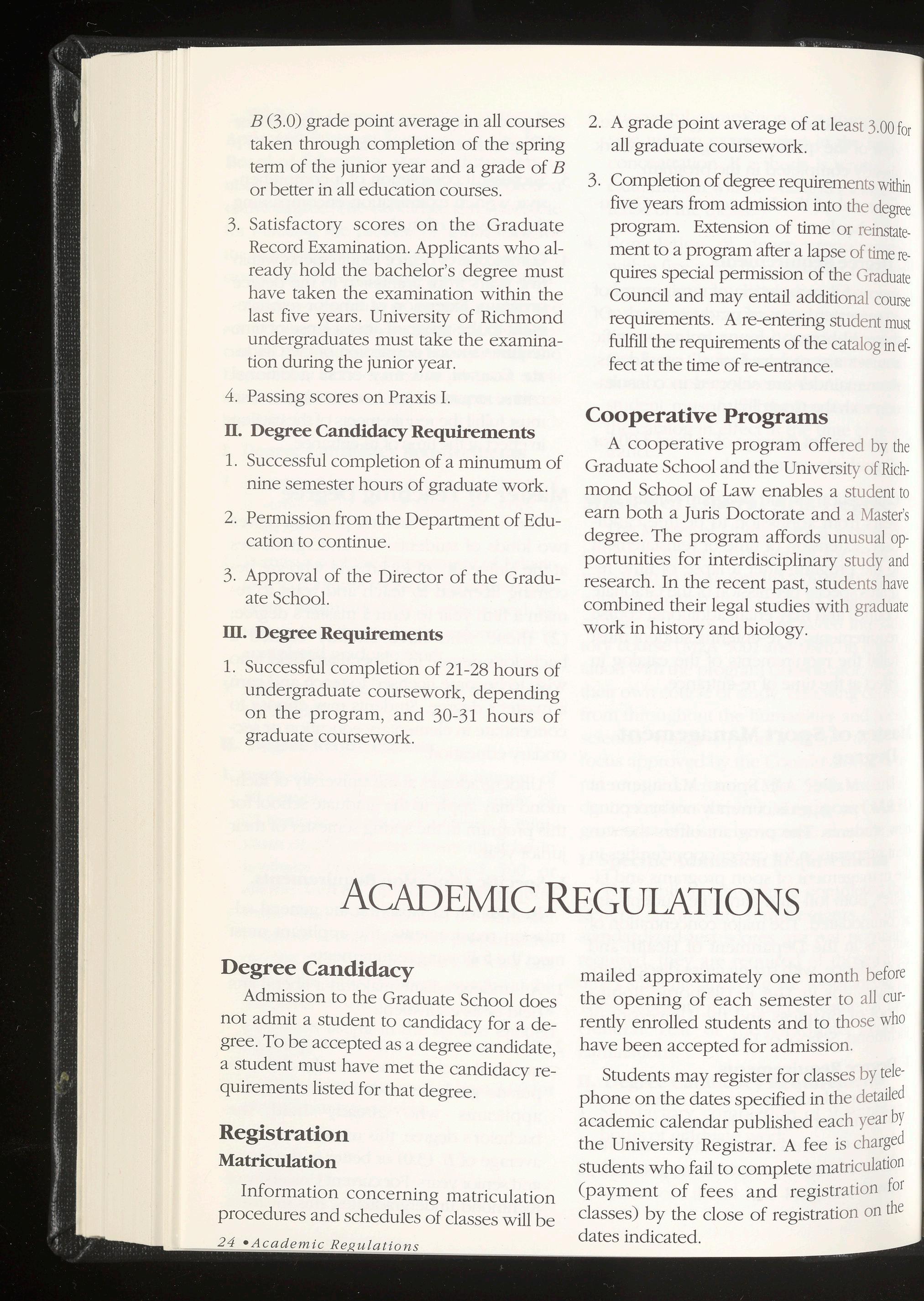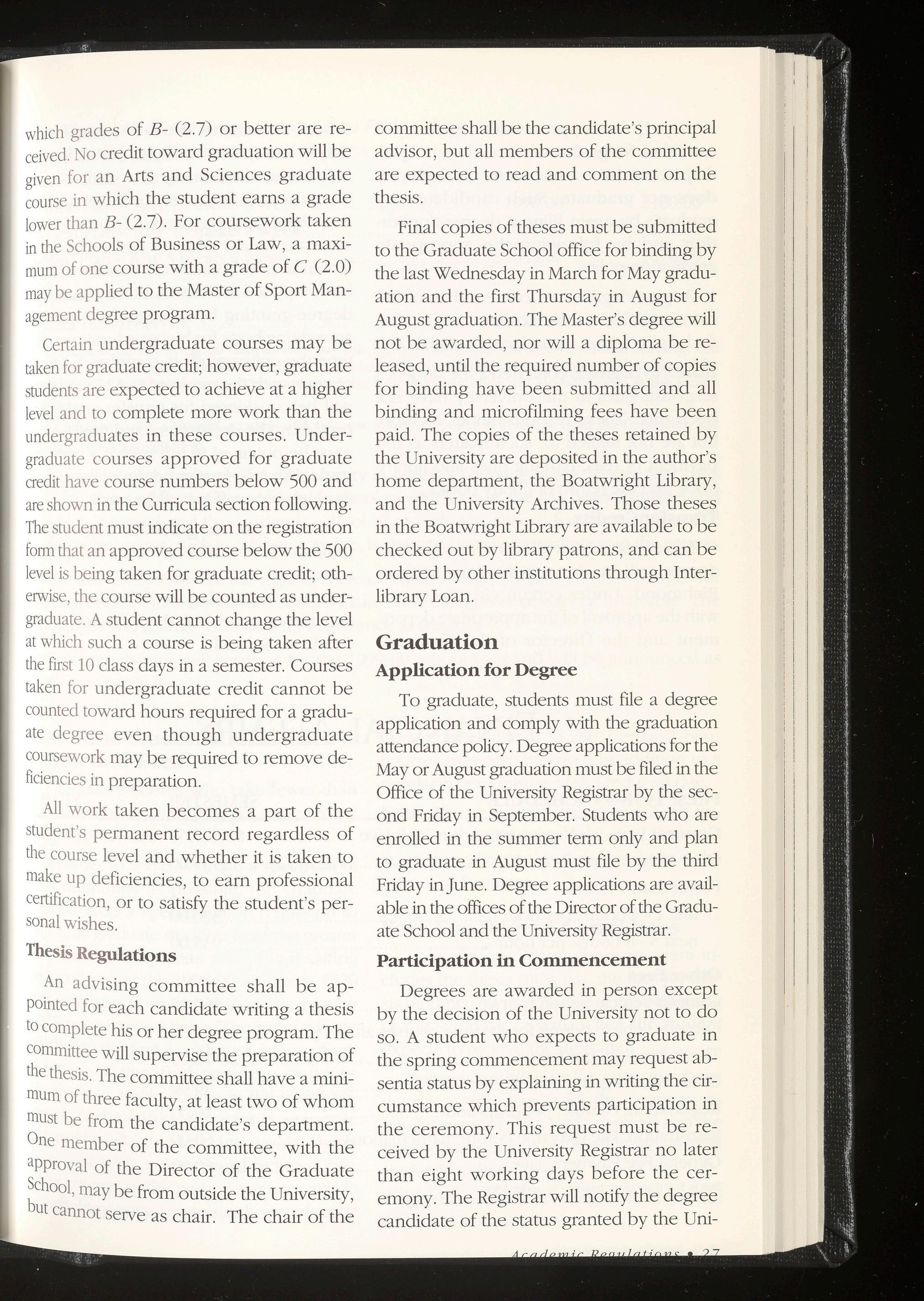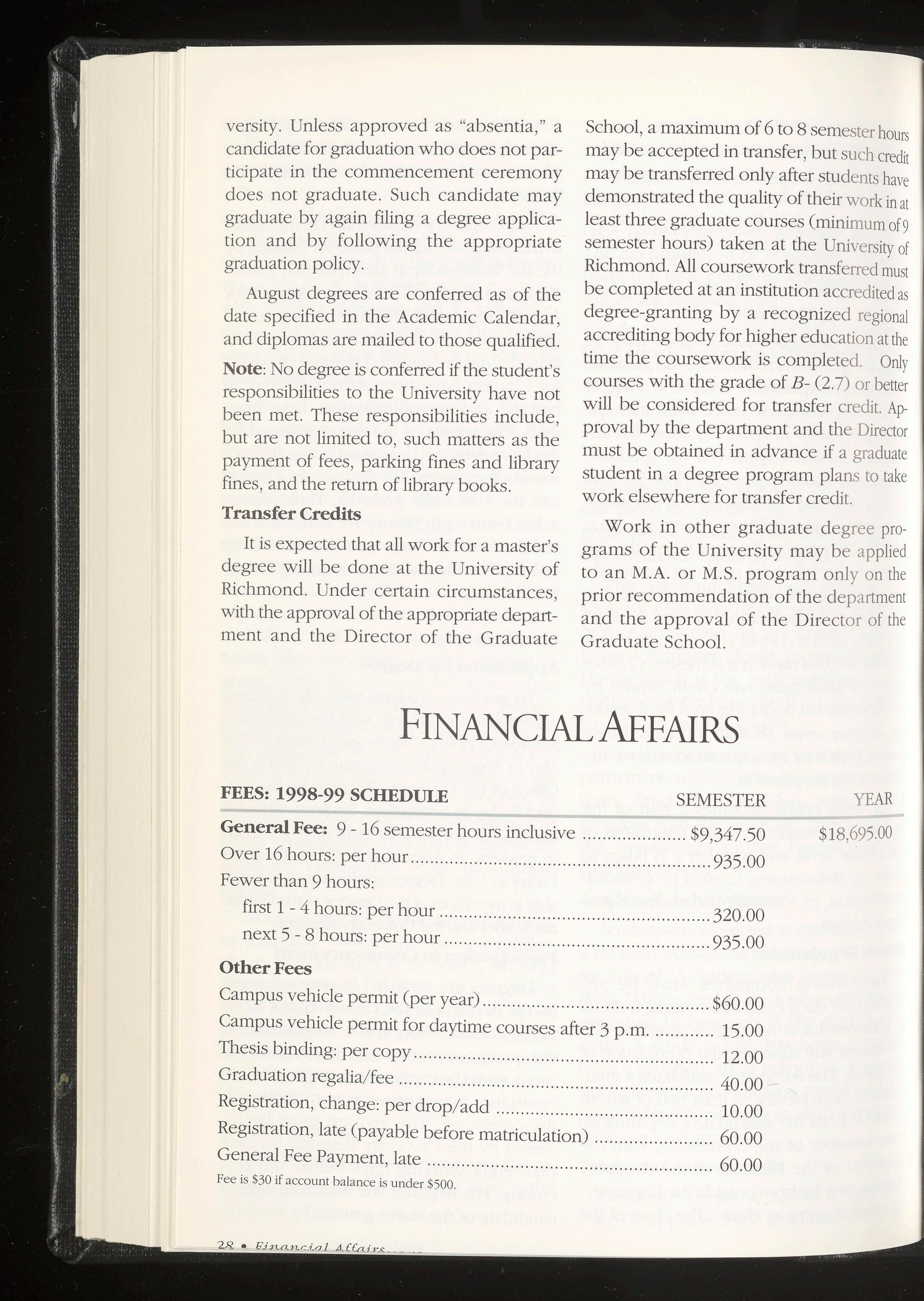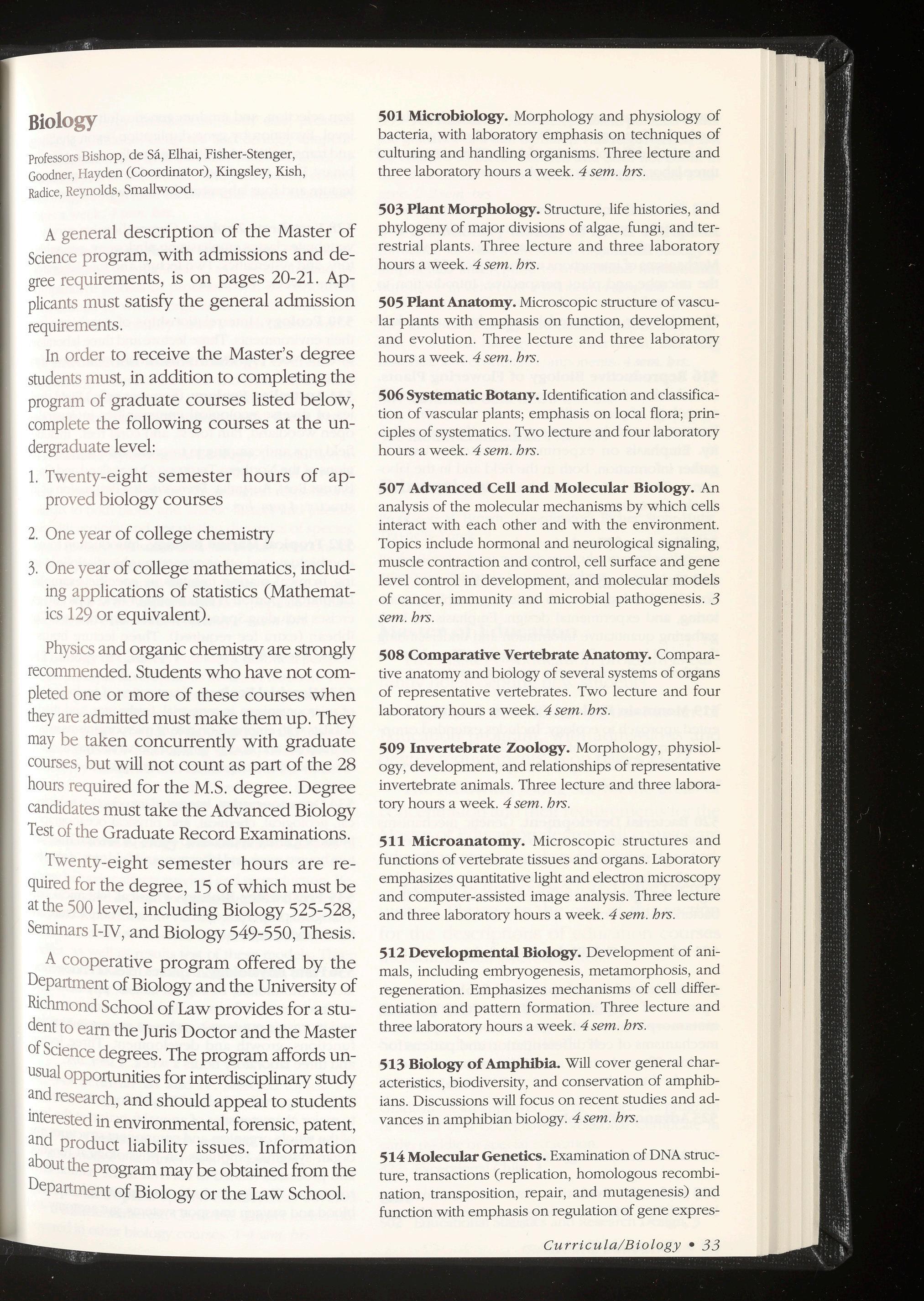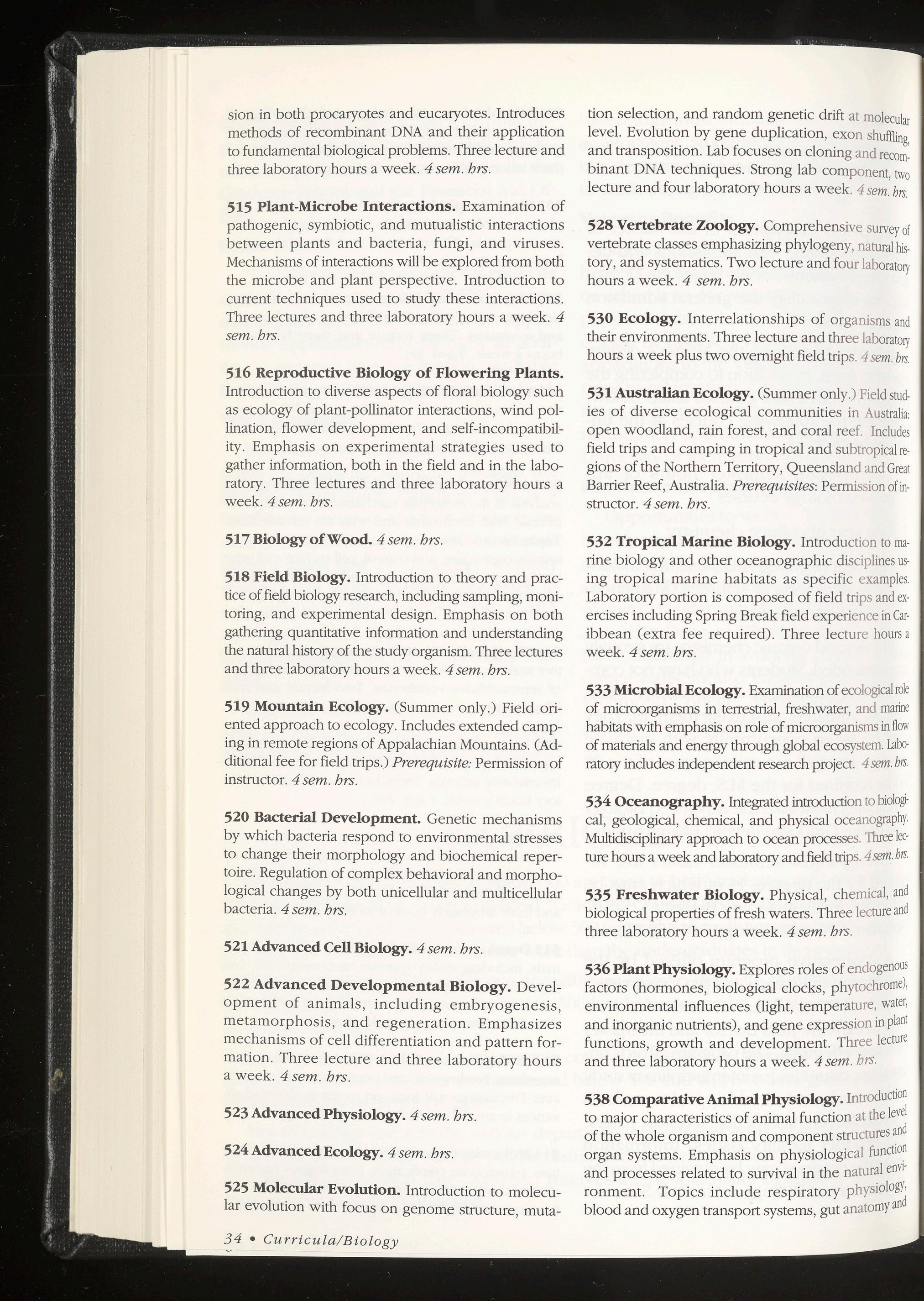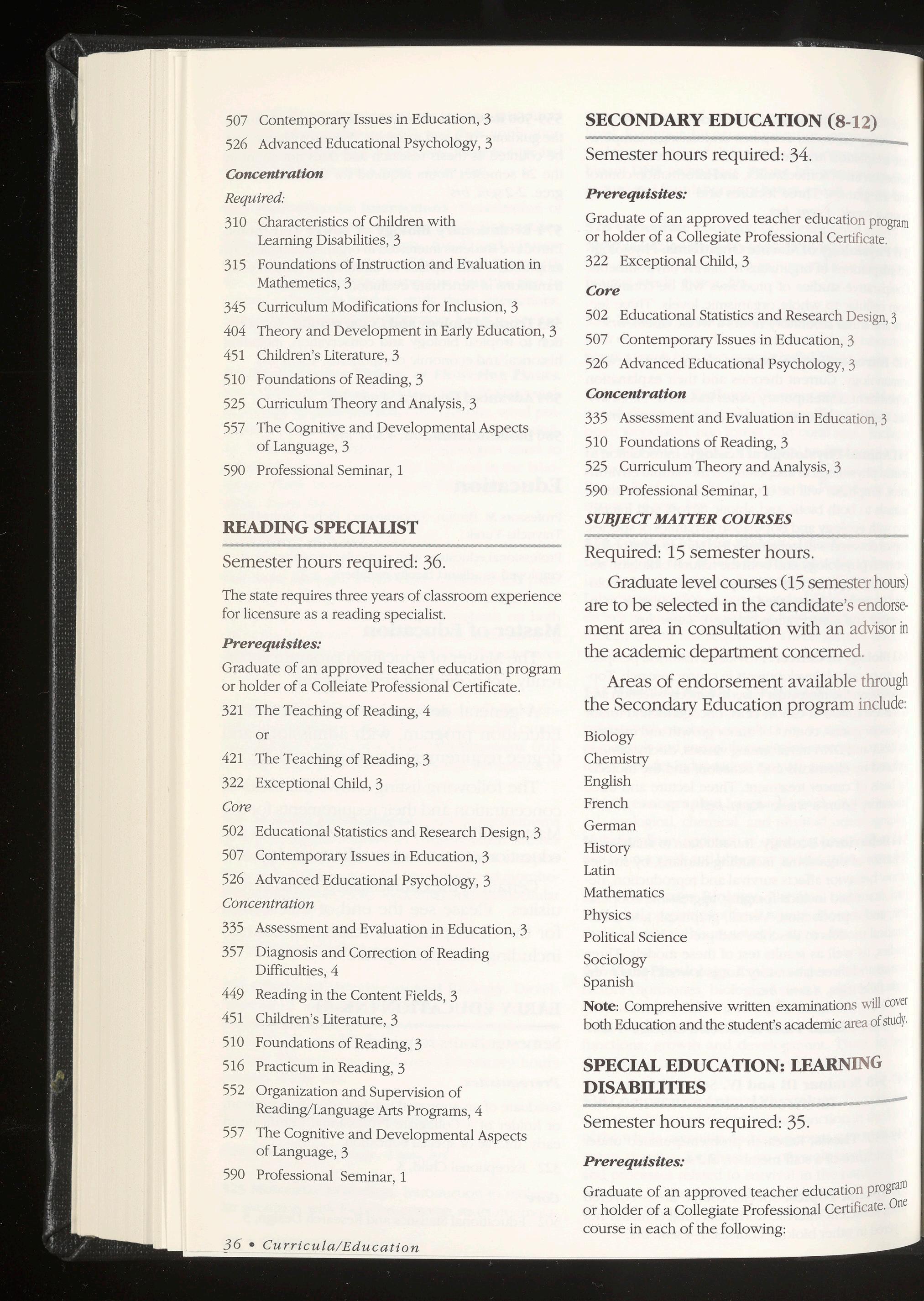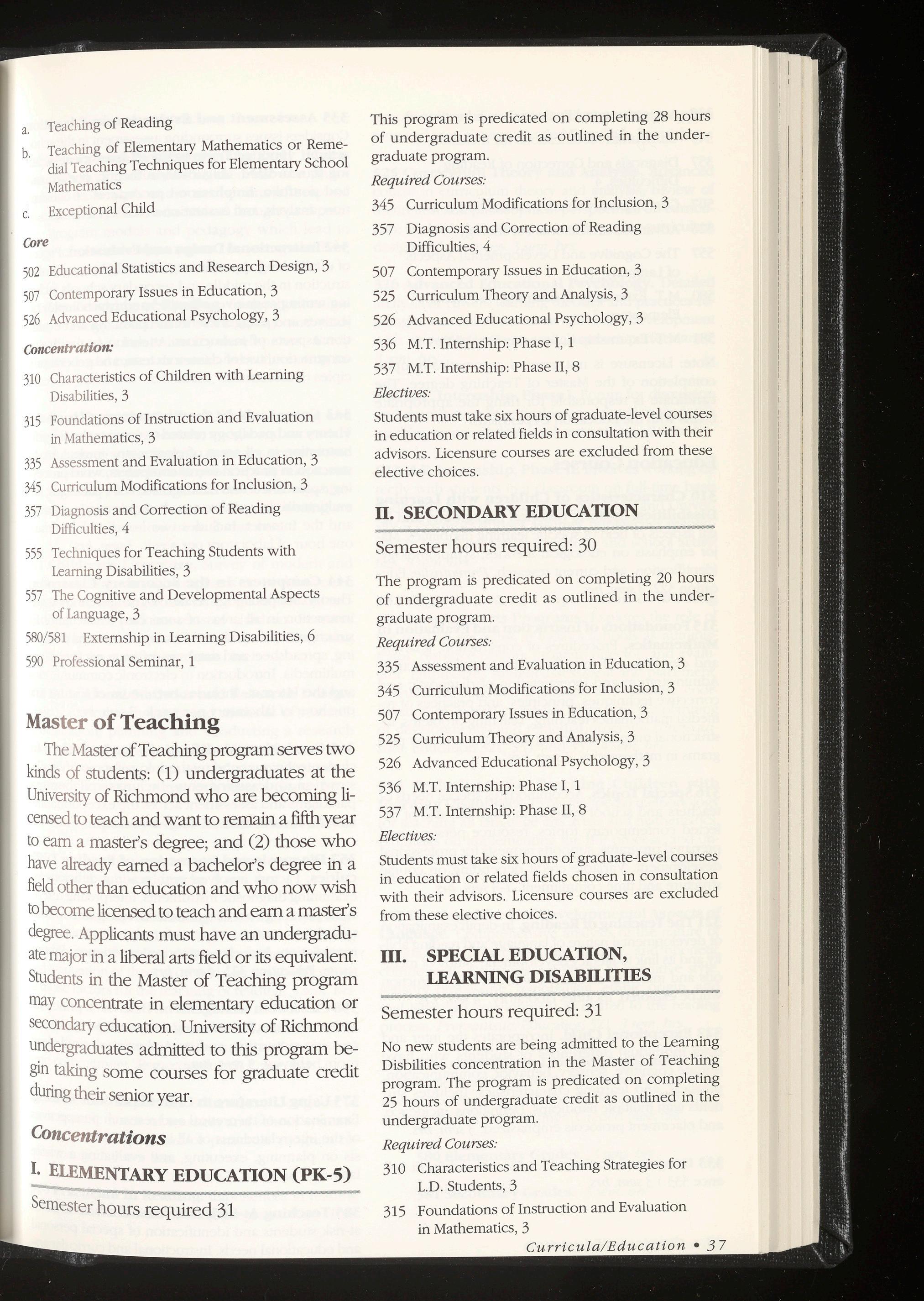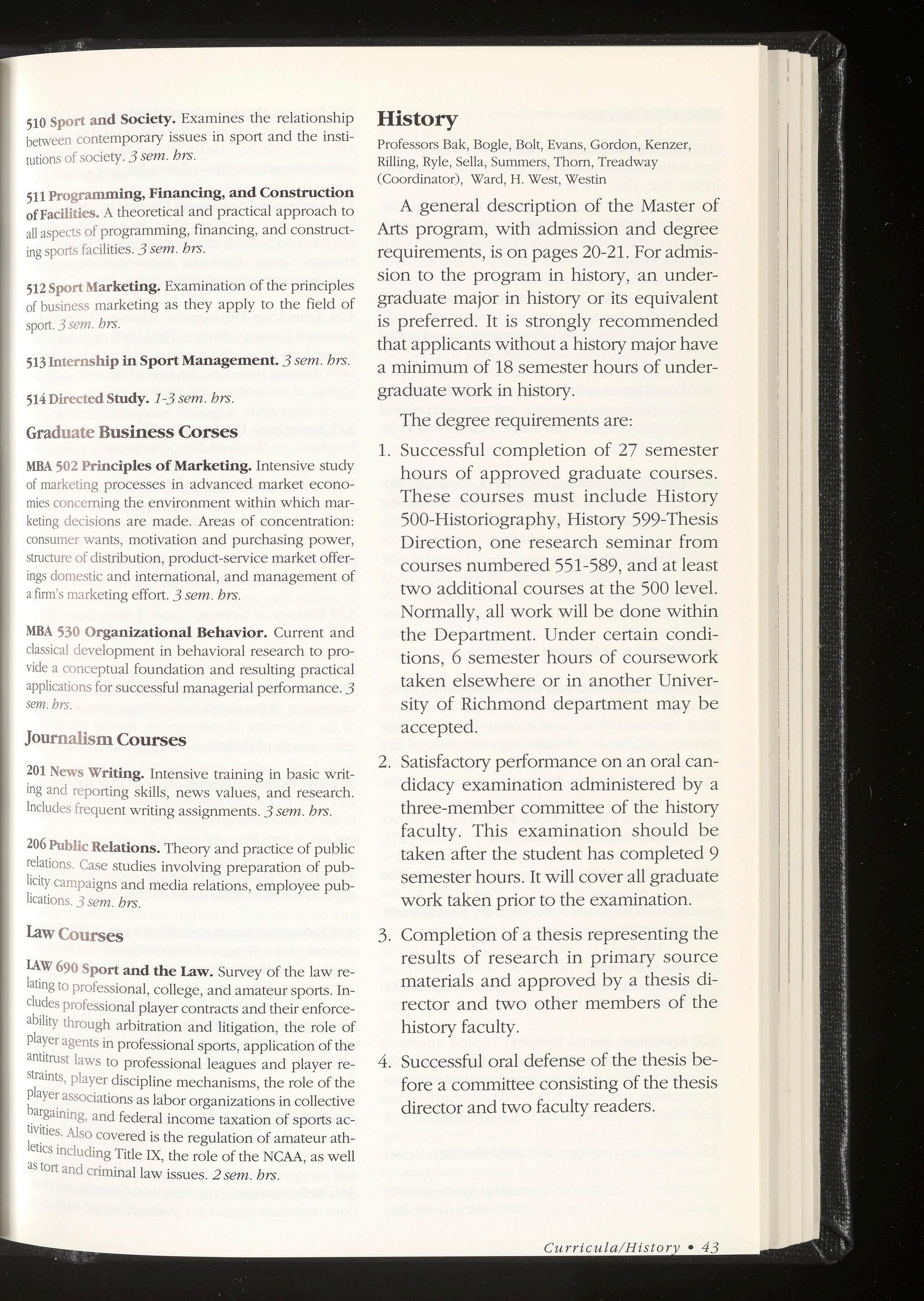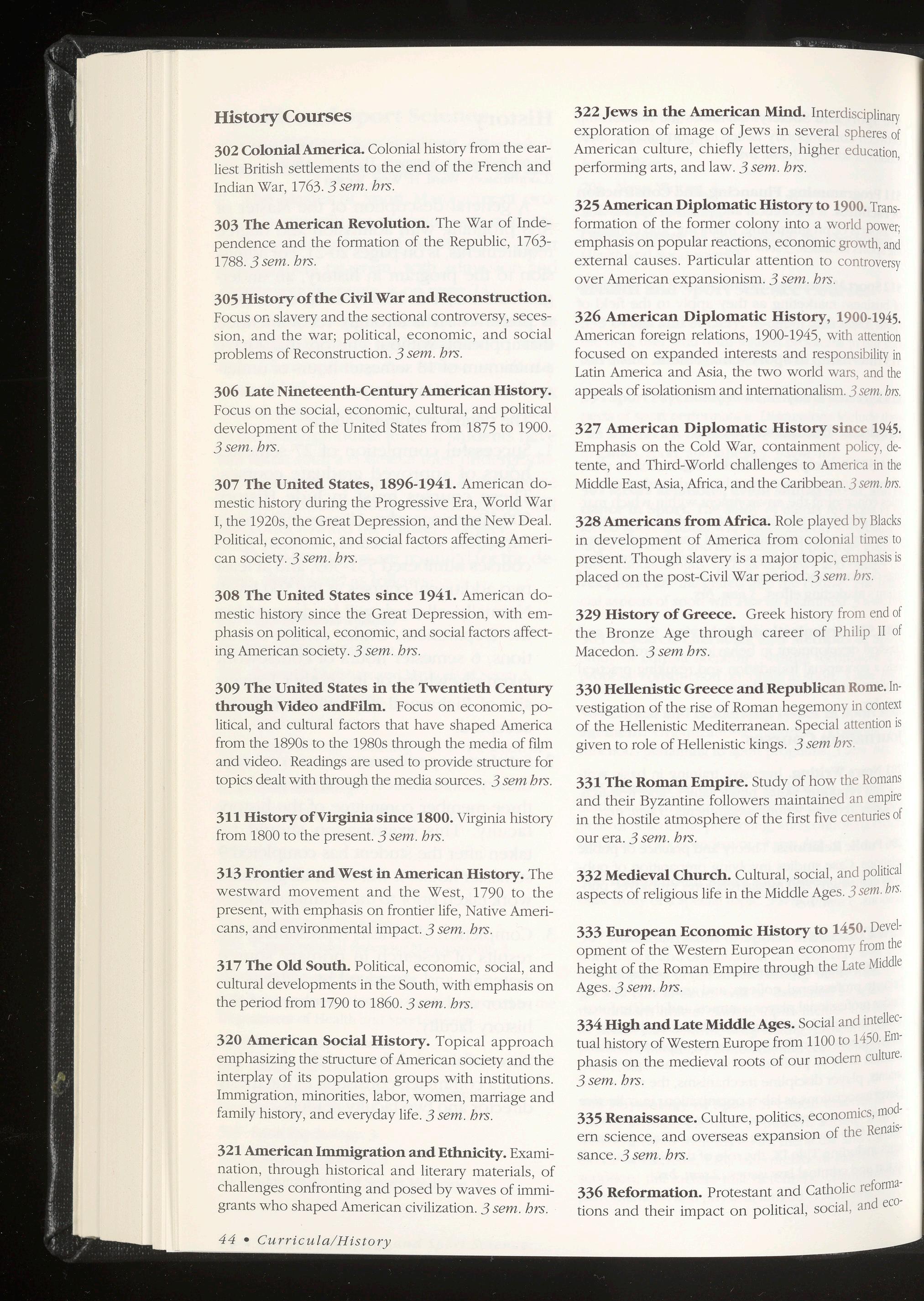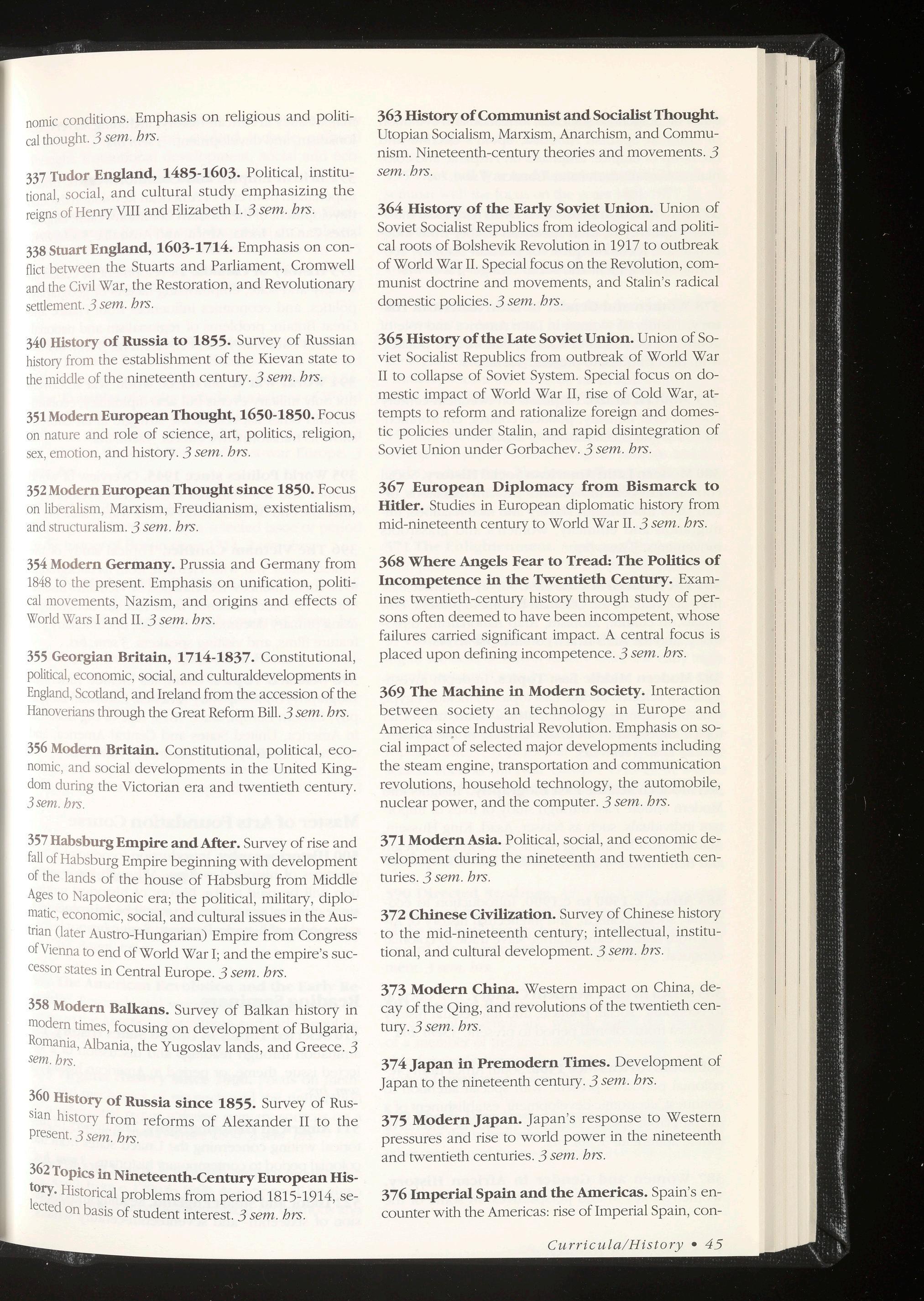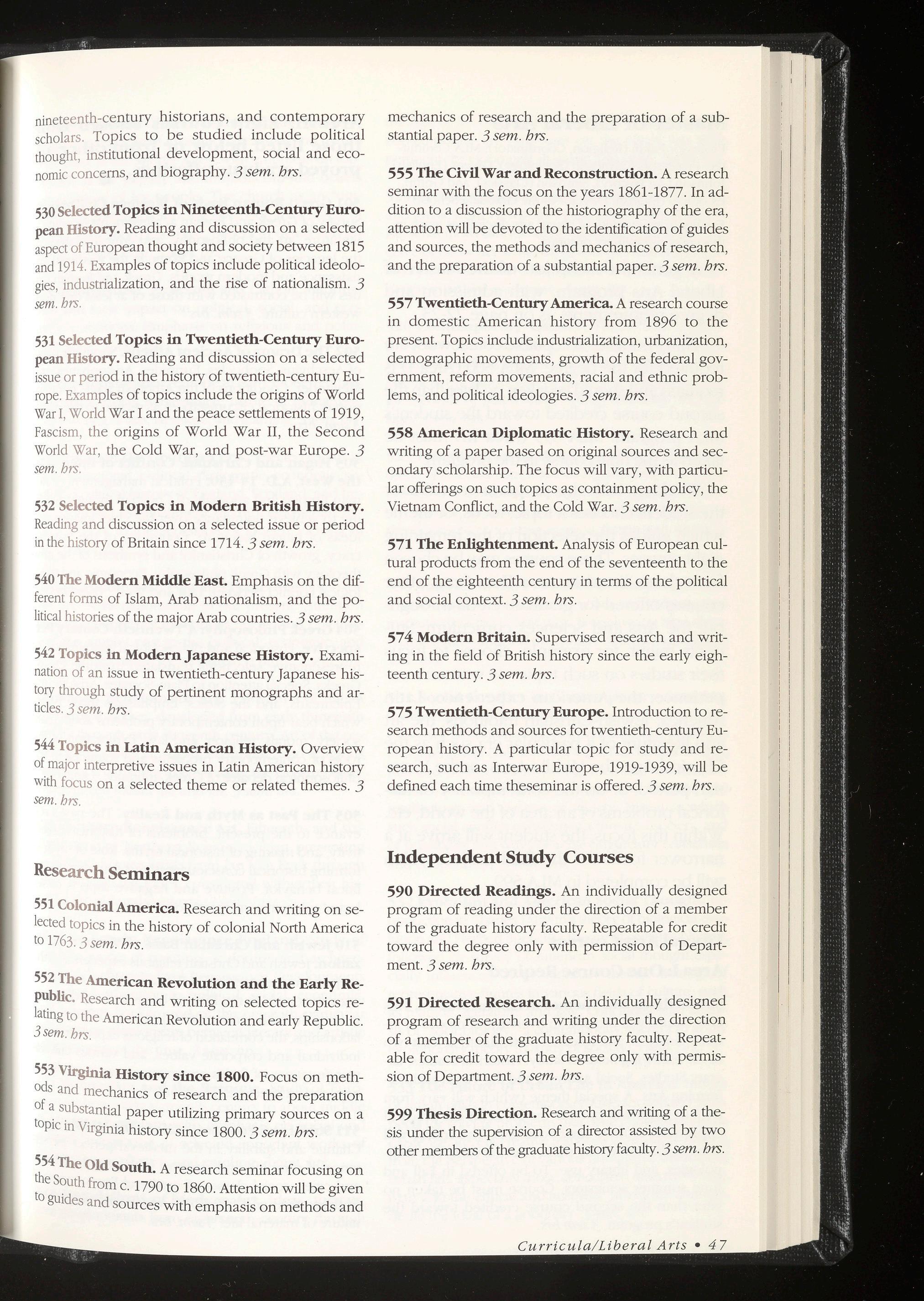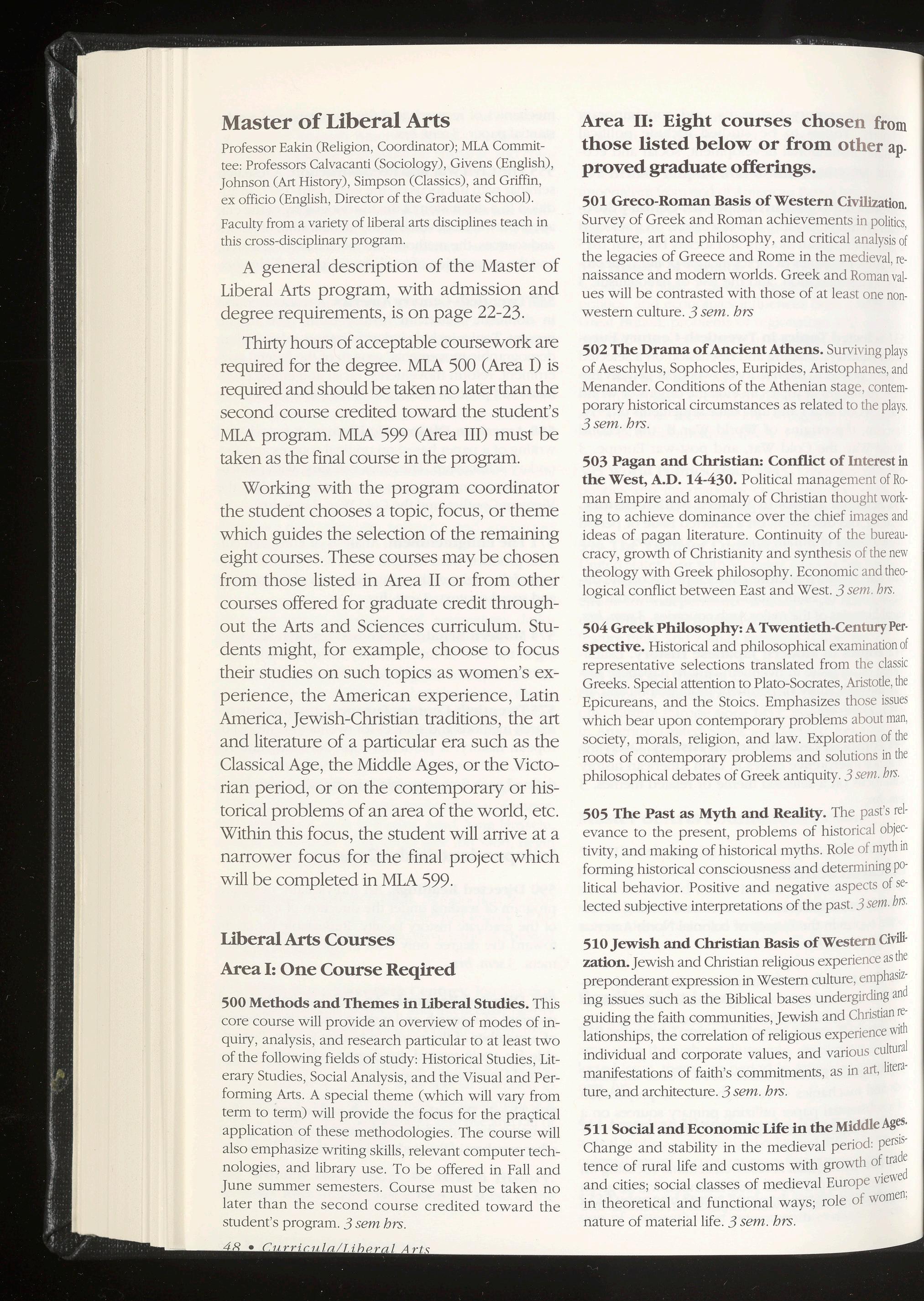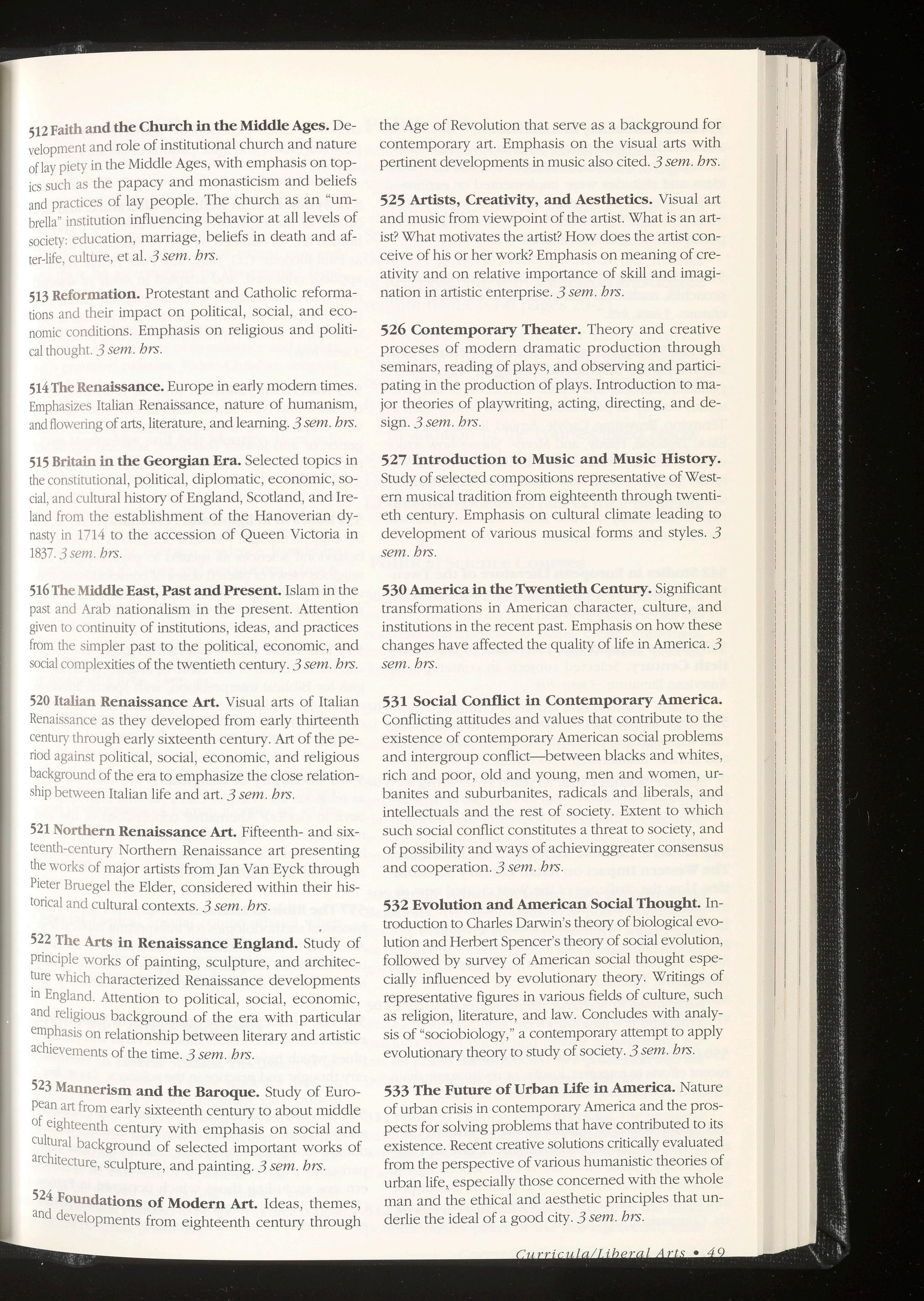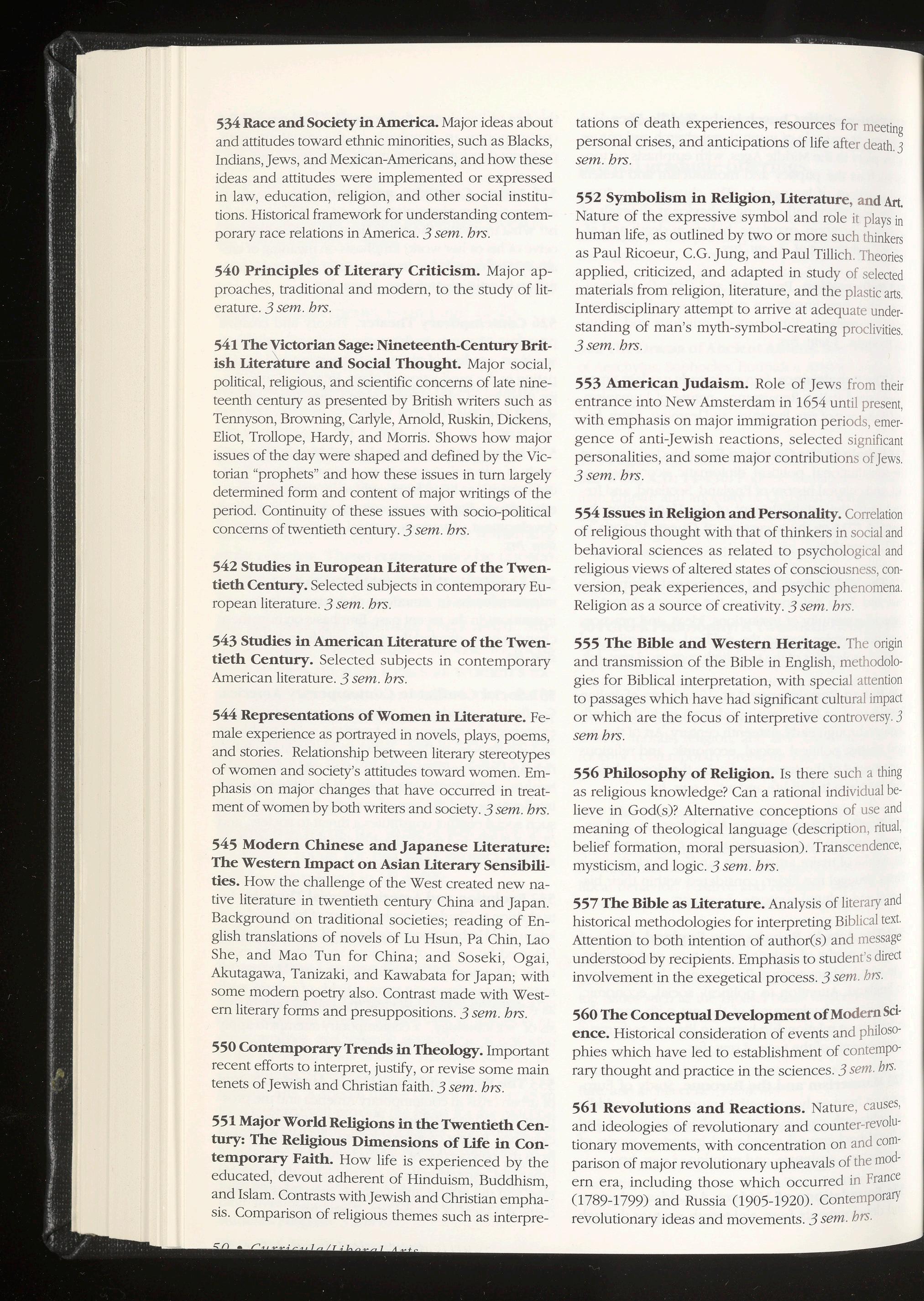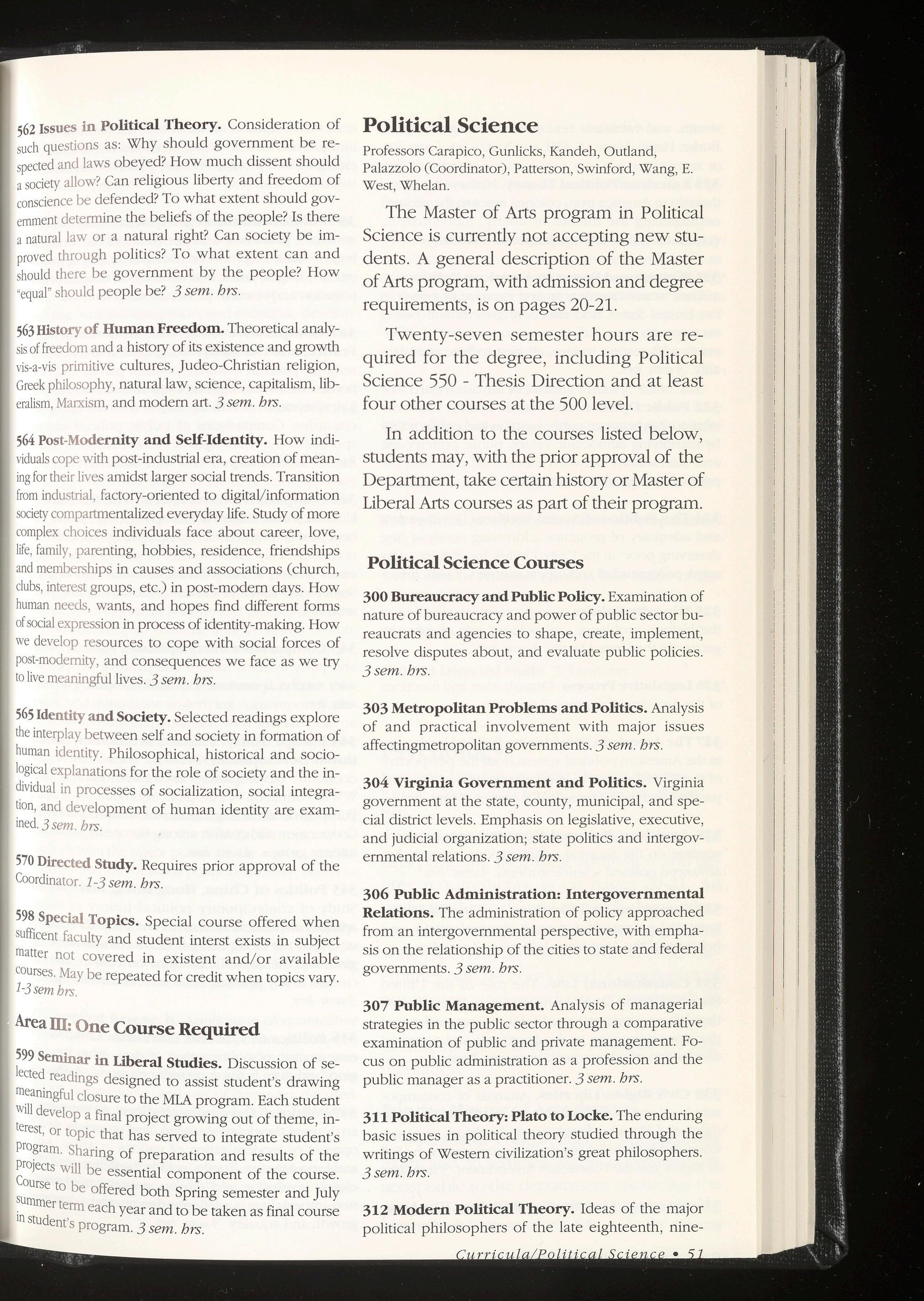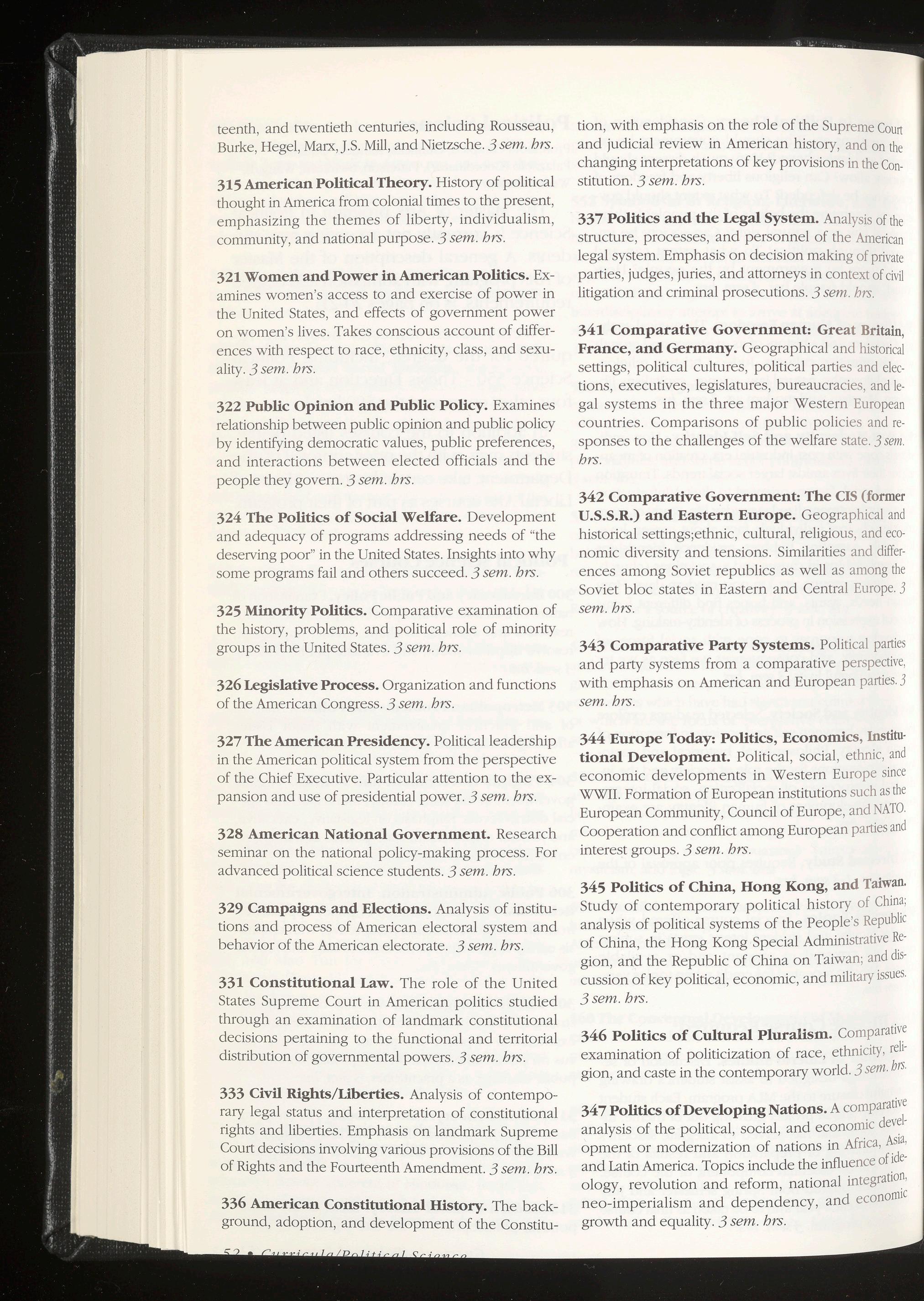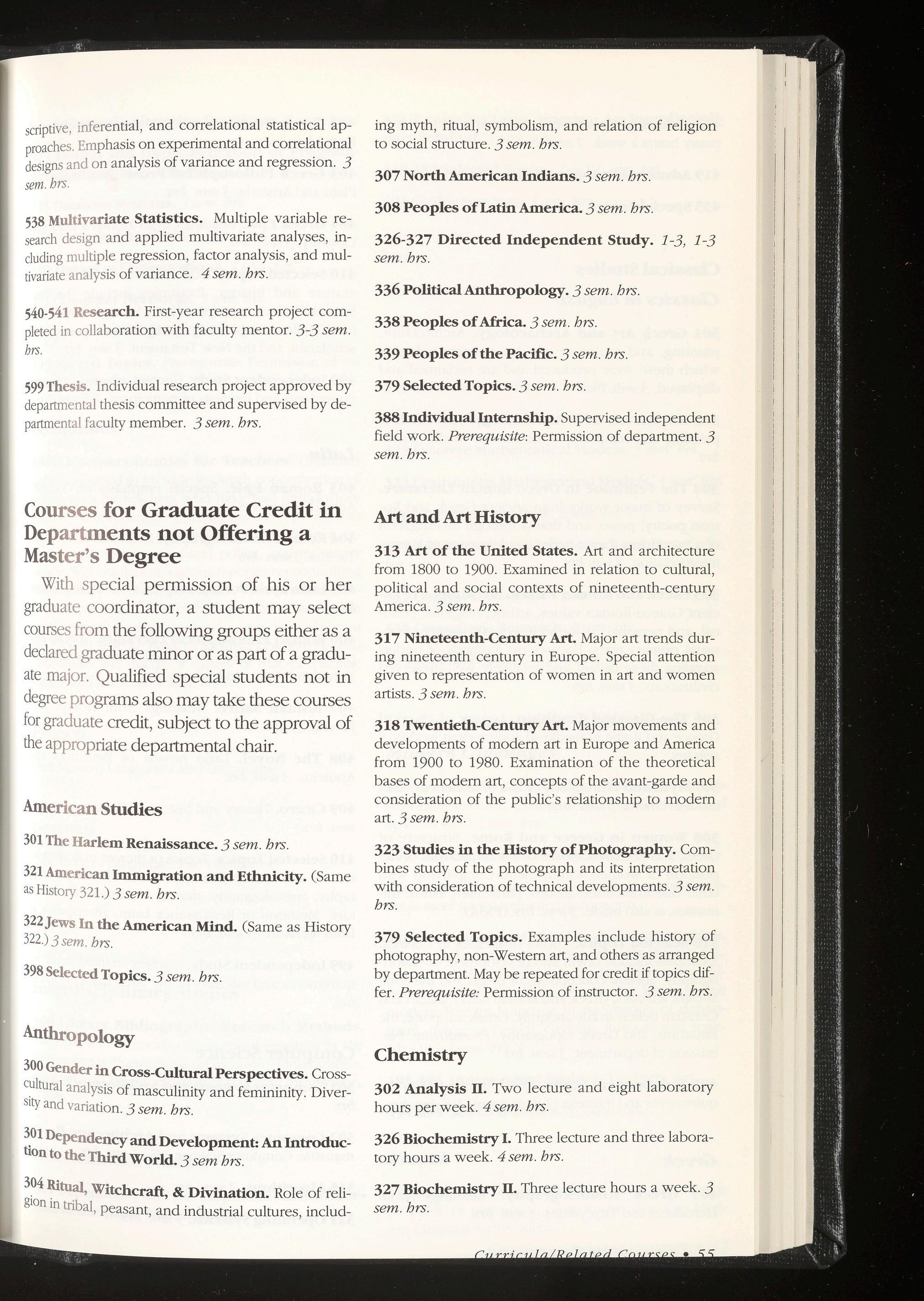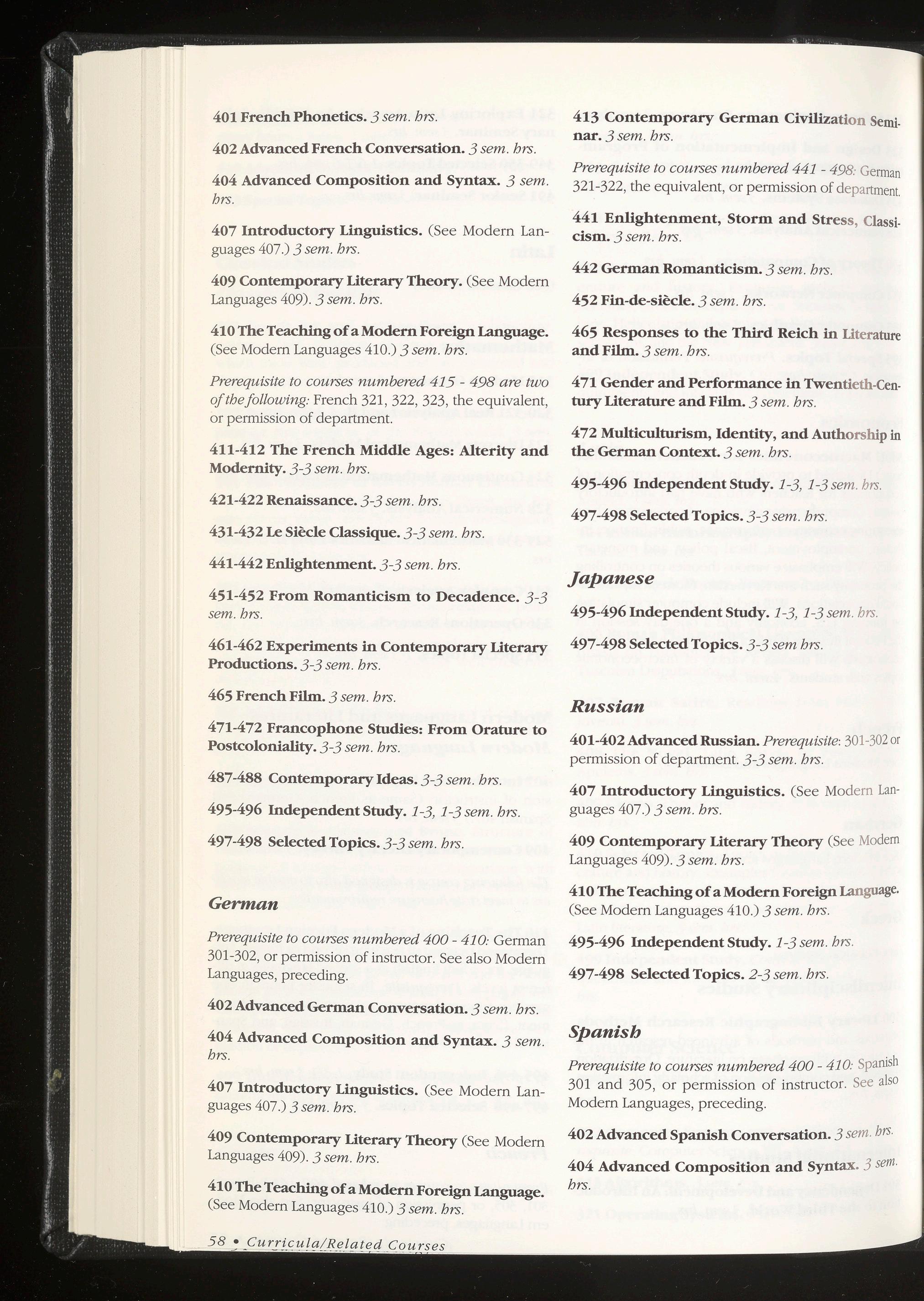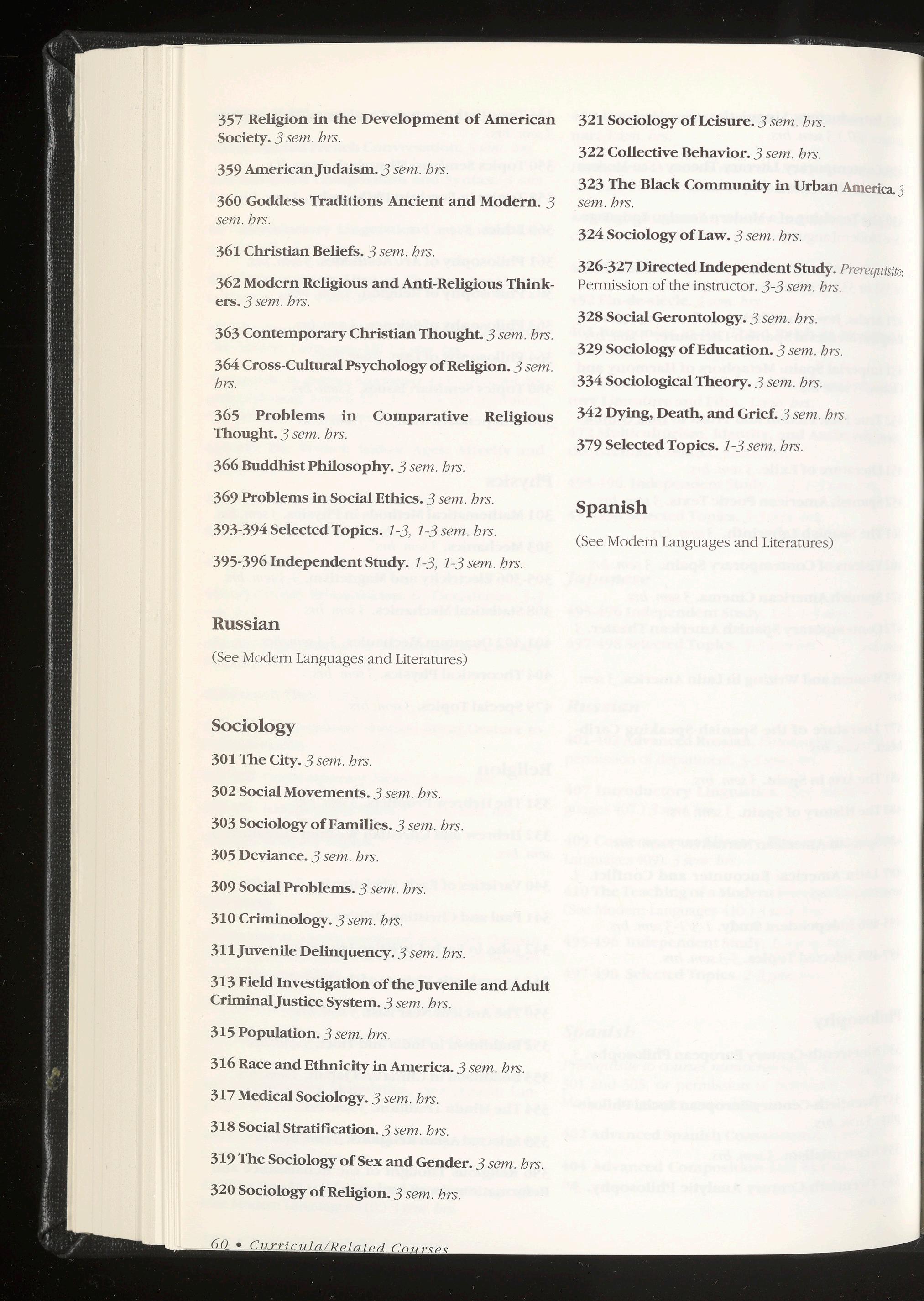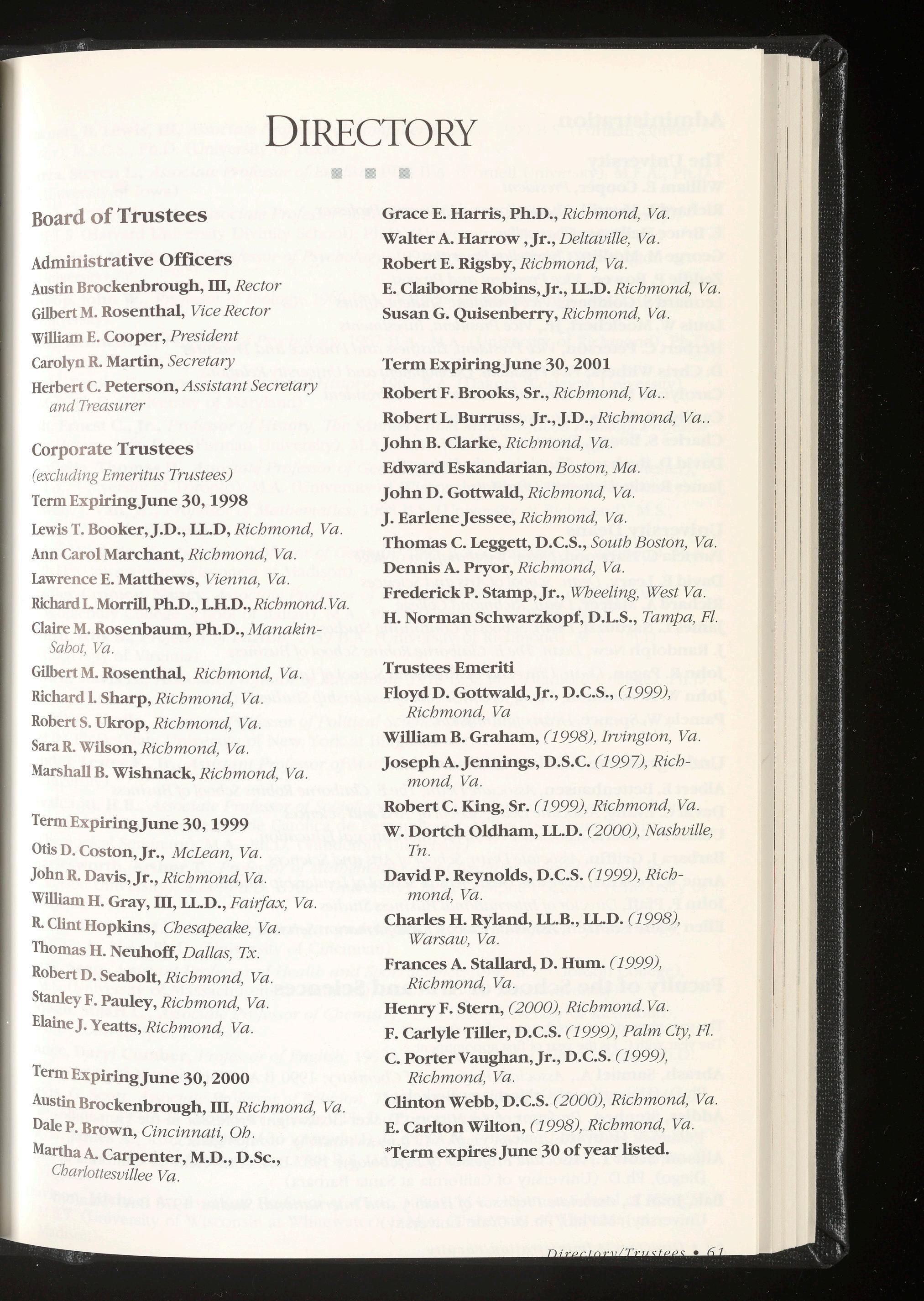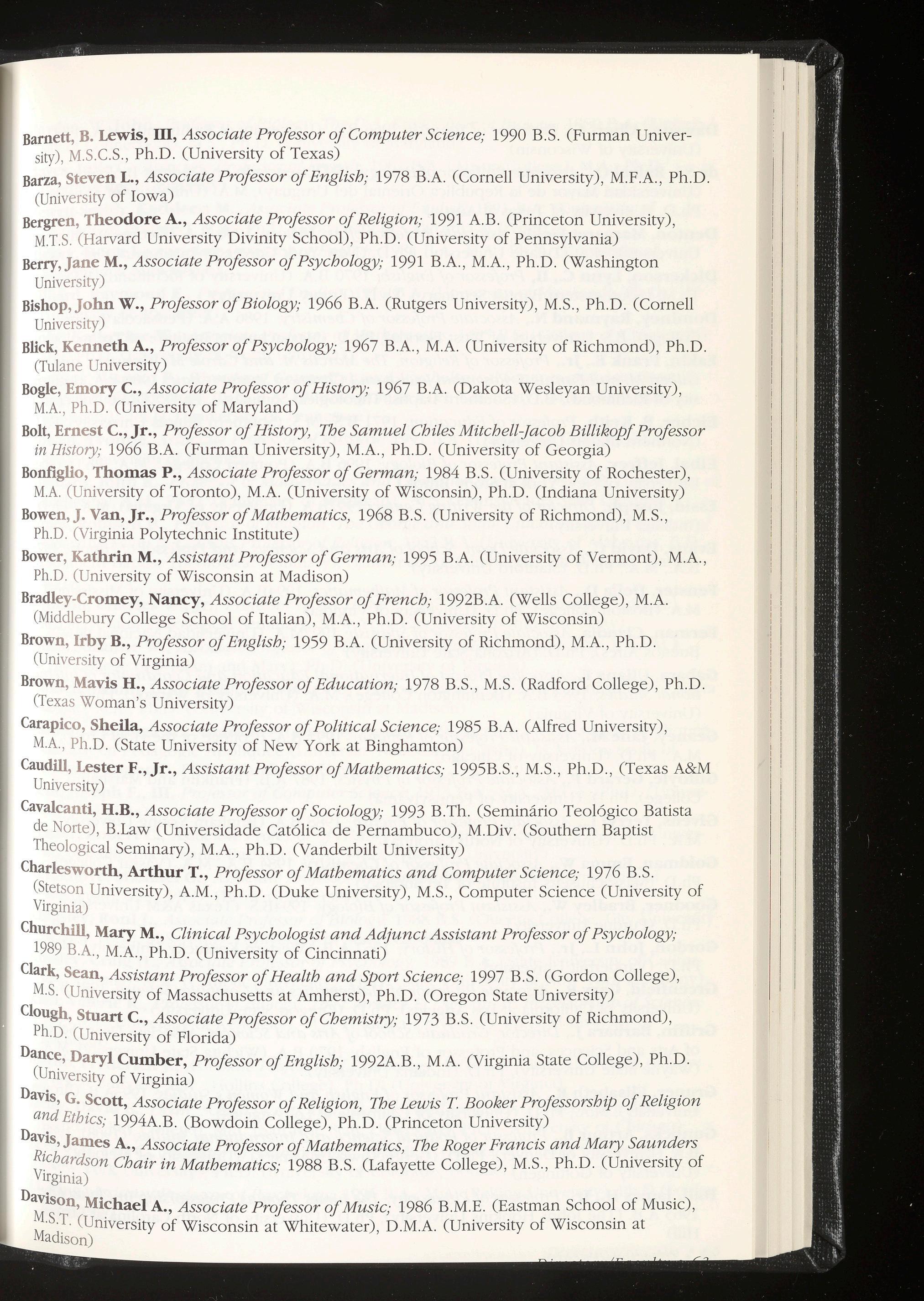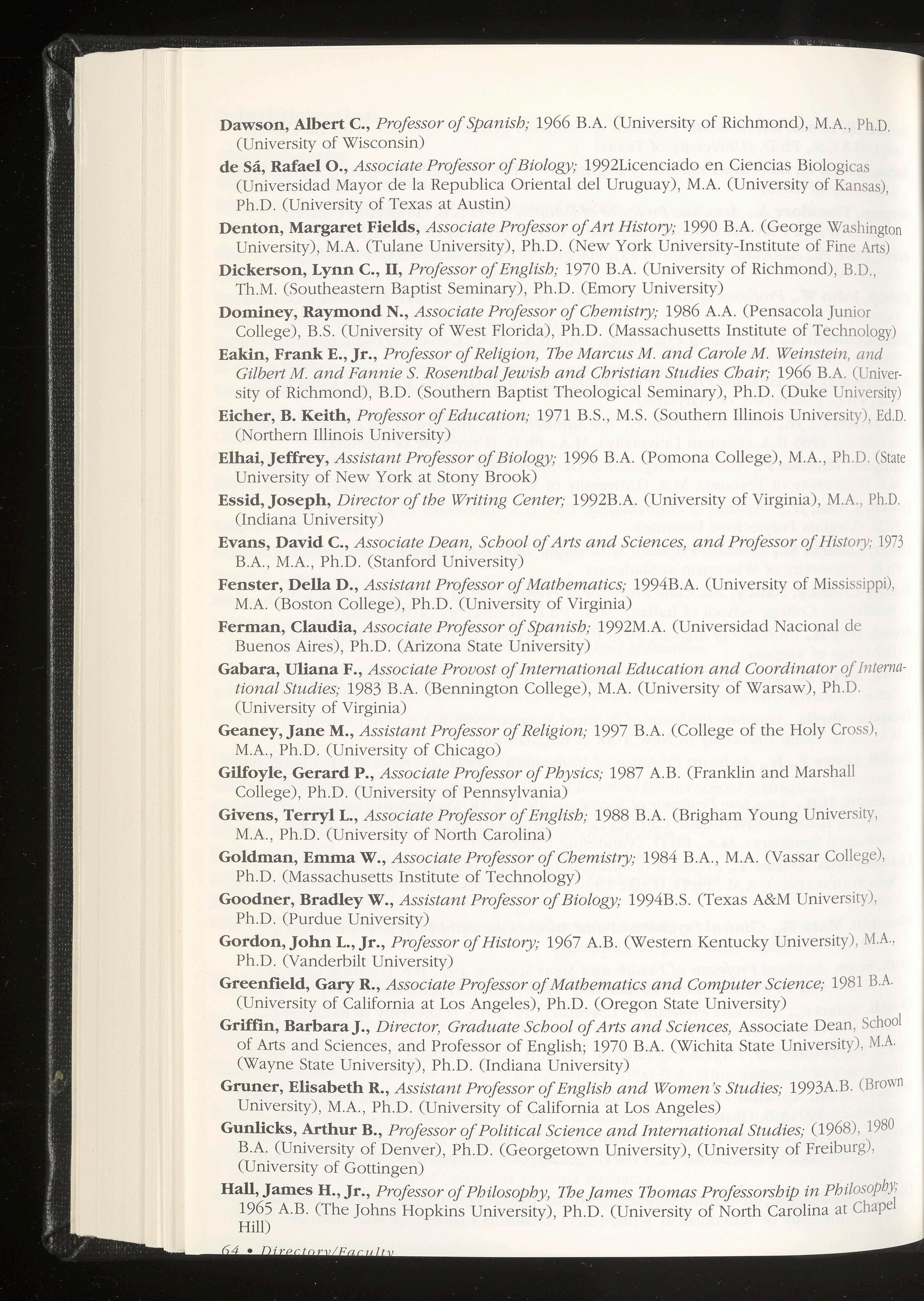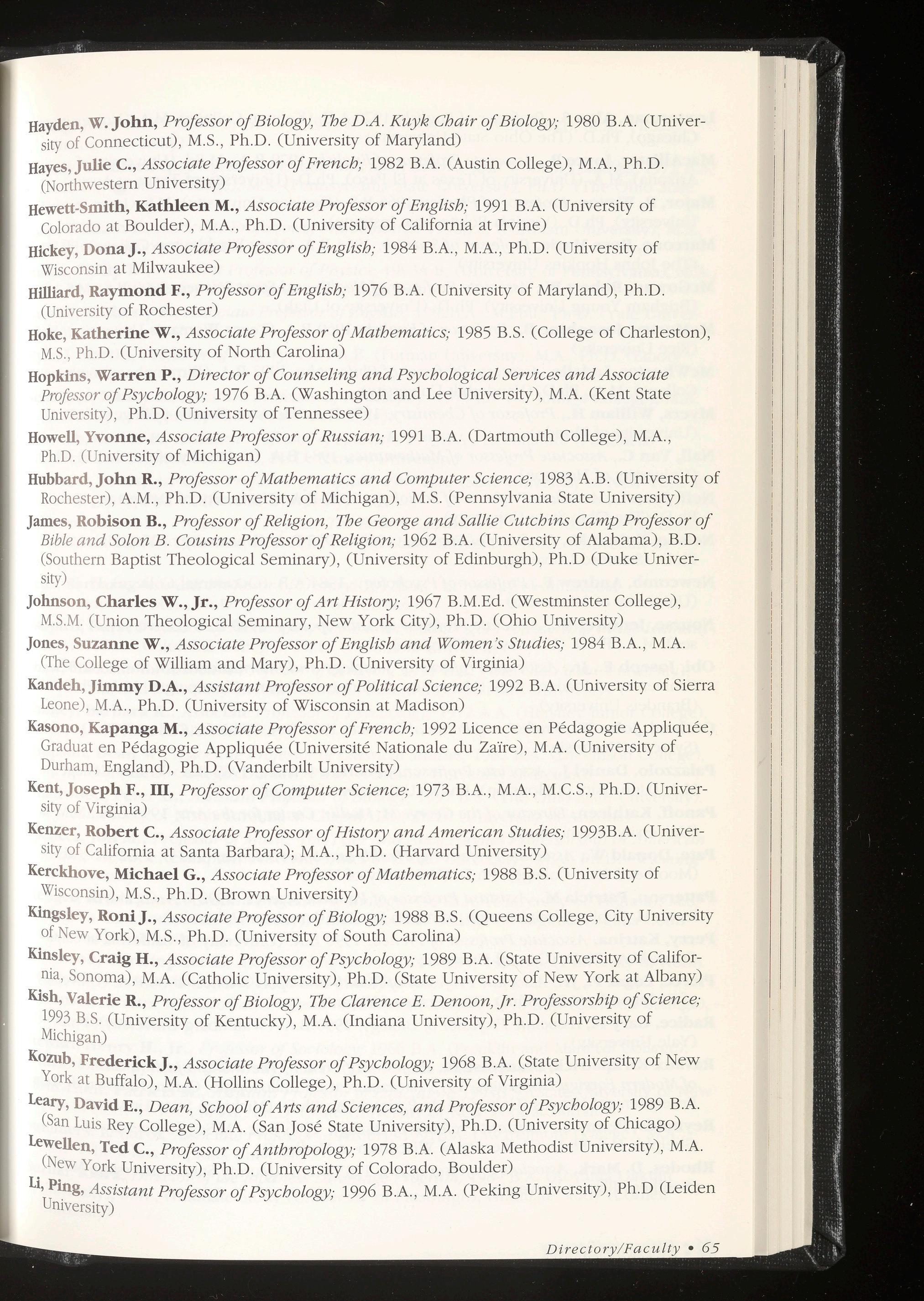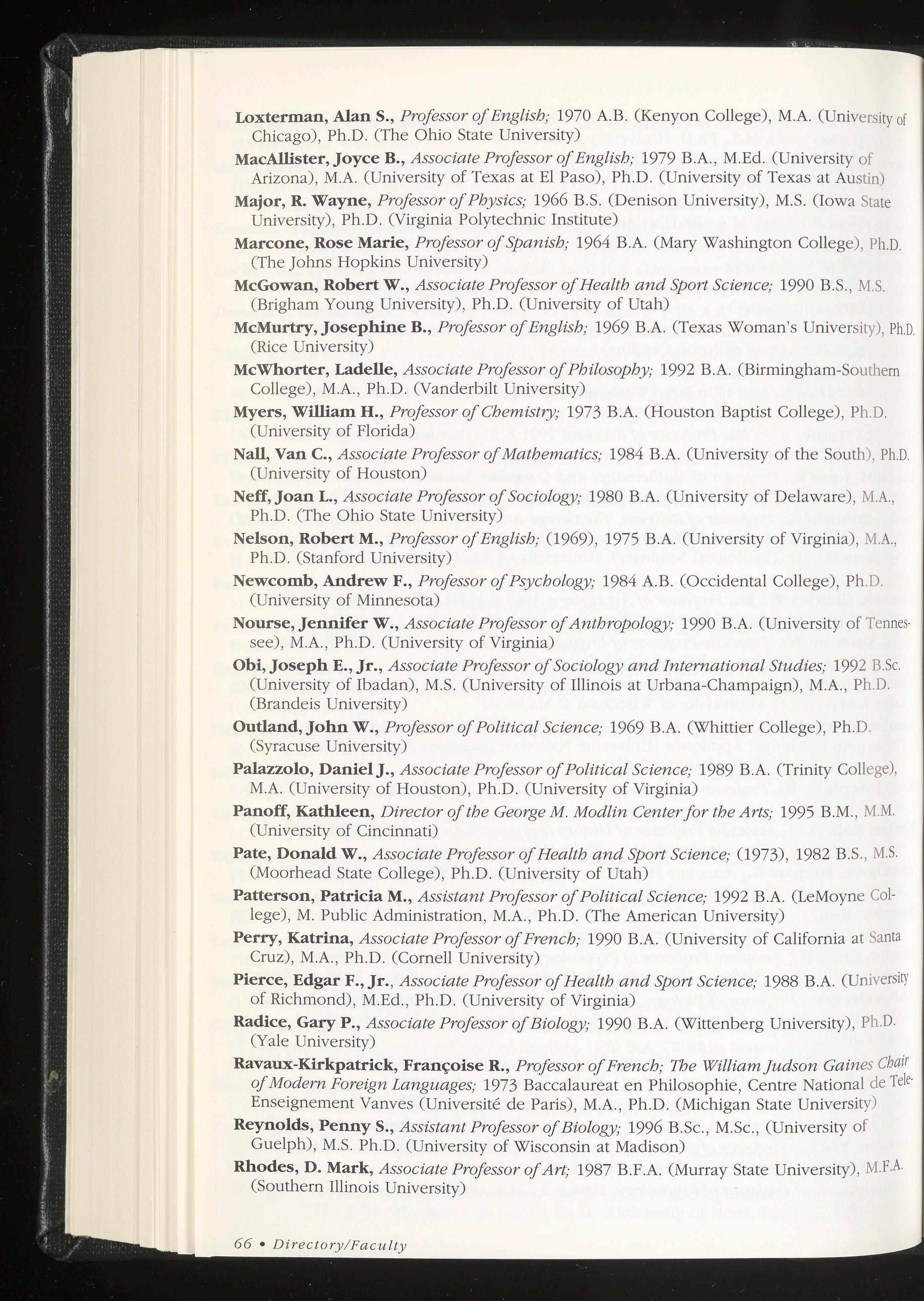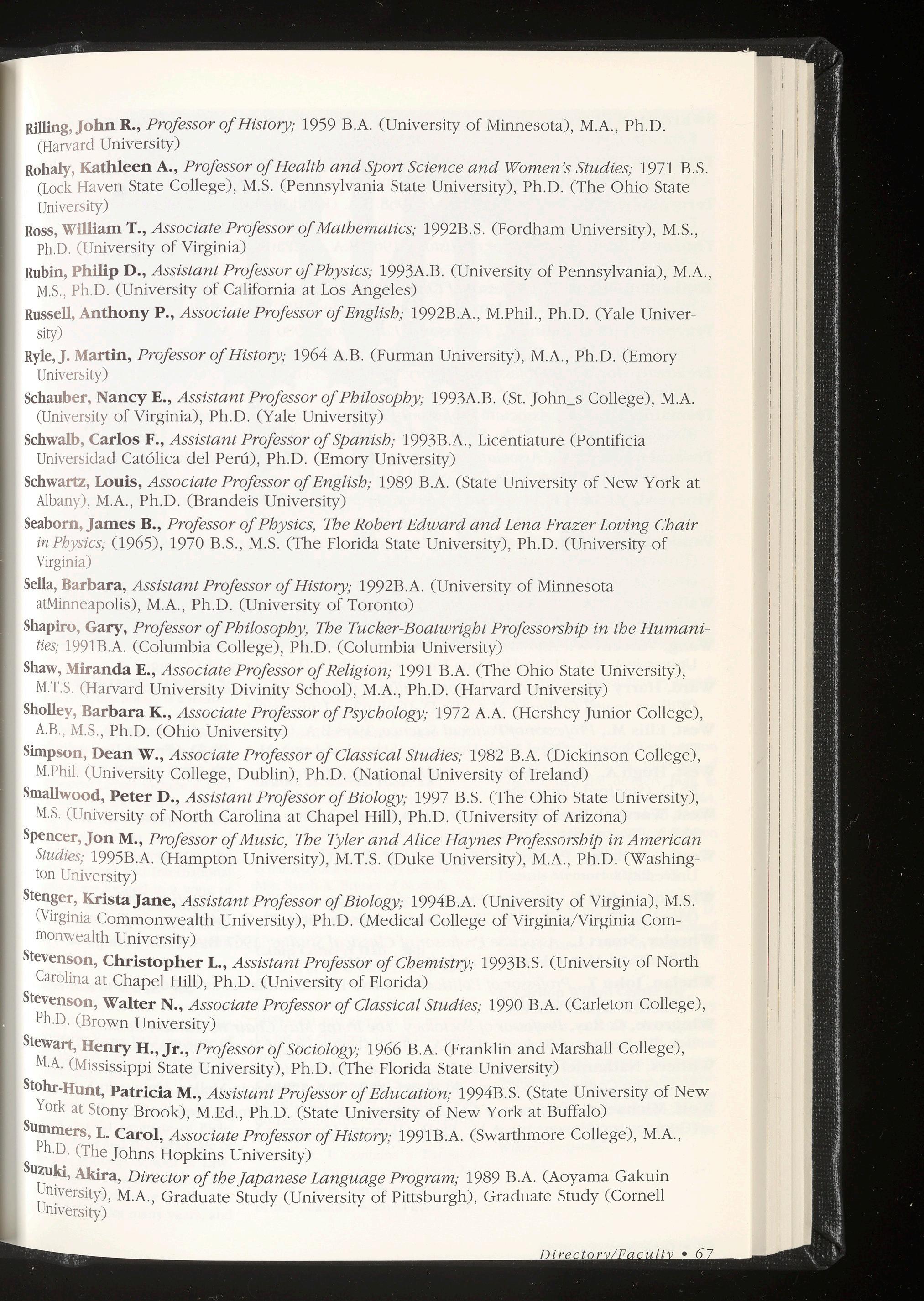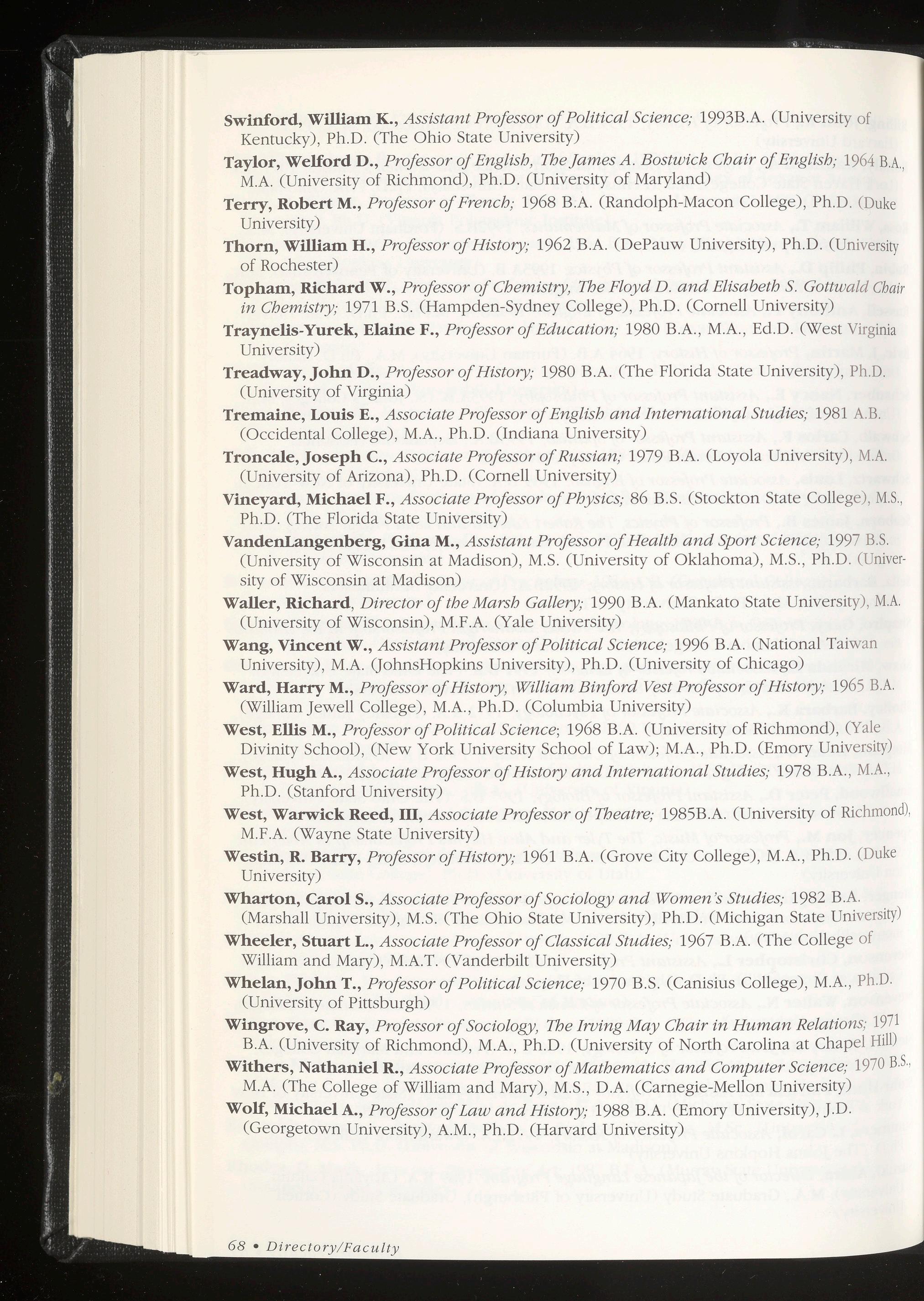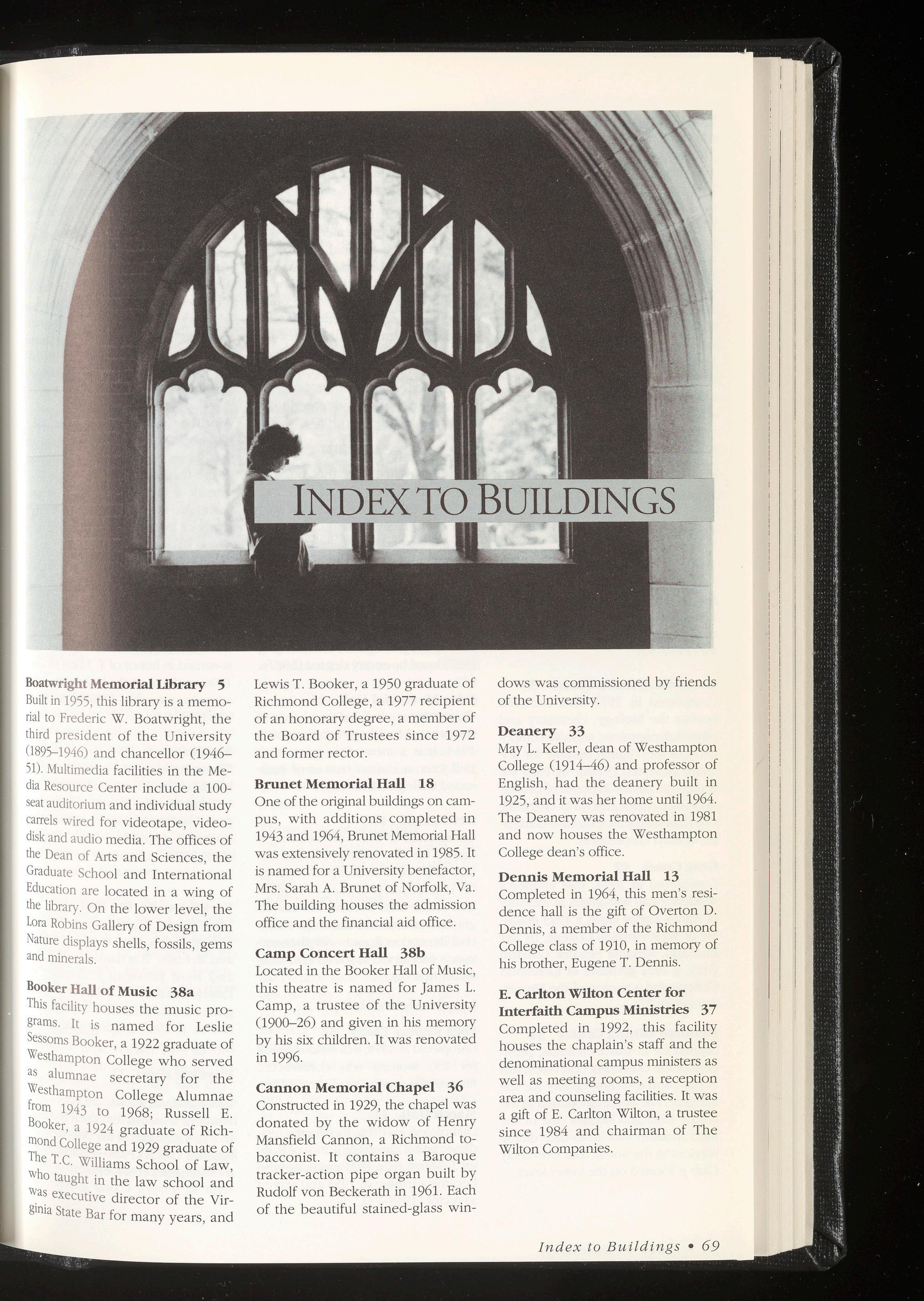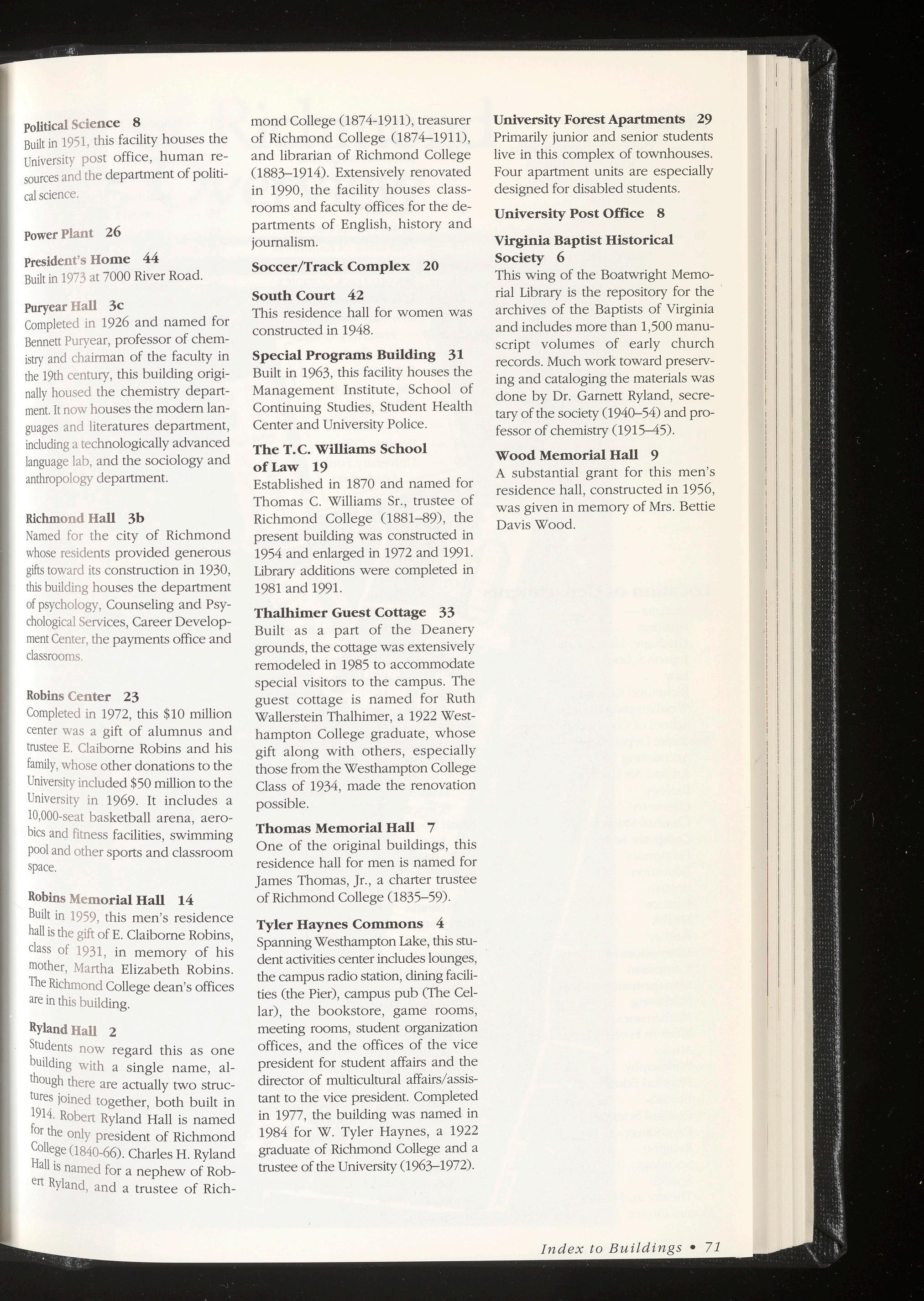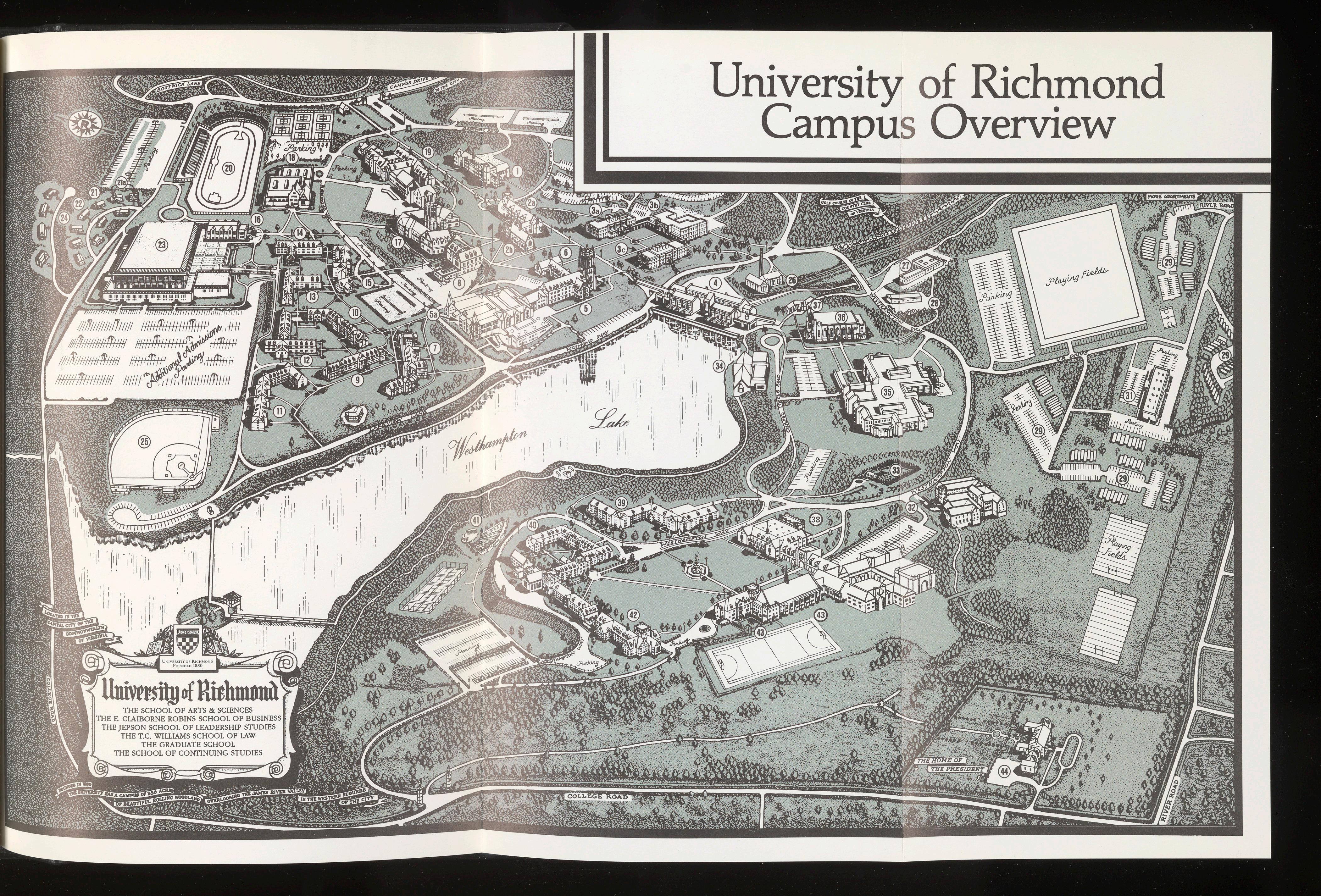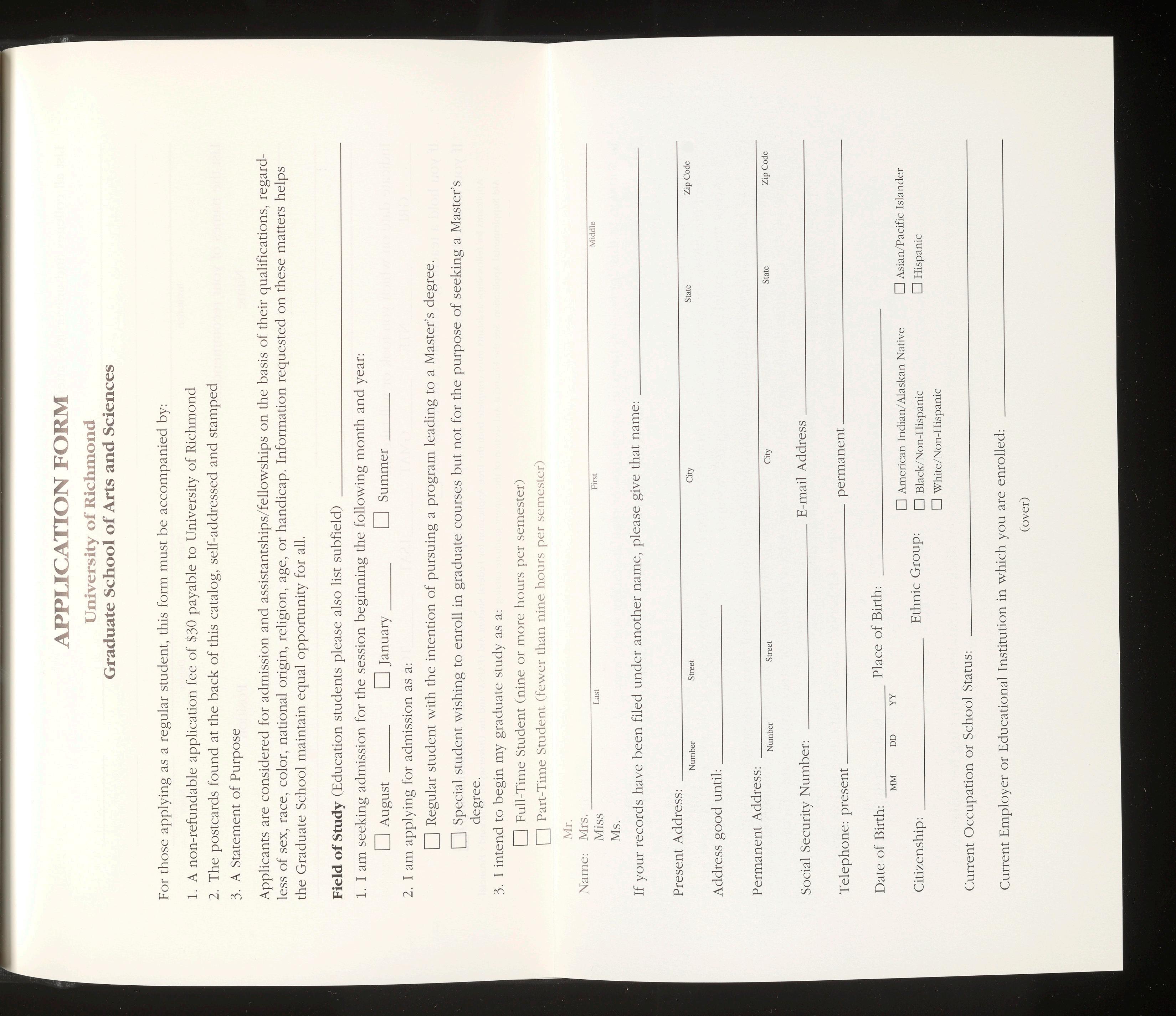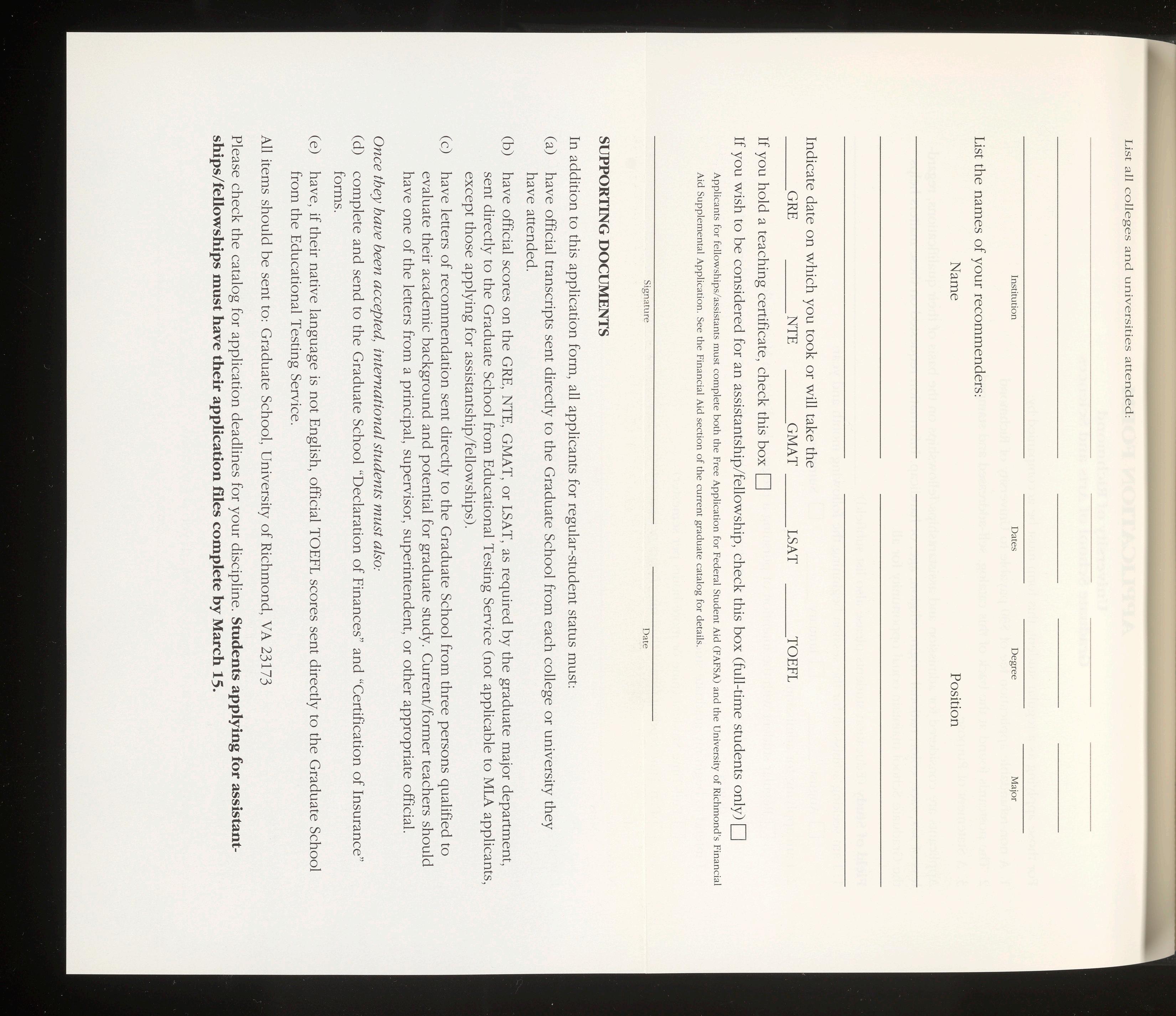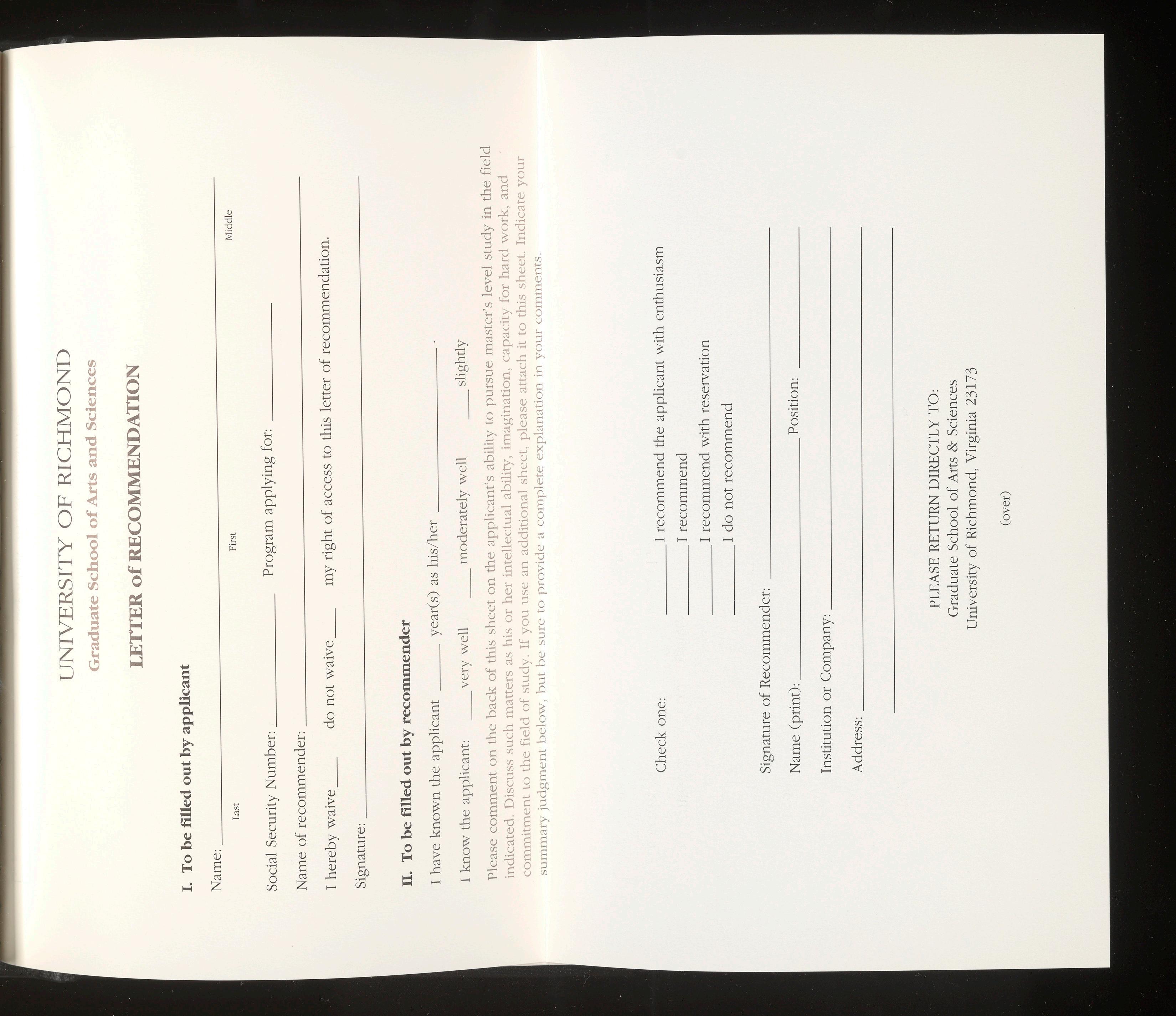FINANCIALAFFAIRS
MealPlans - Meals are served Monday thru Friday , three meals a day ; Saturday an d Sunday, brunch and dinner.
19
Singlestude nts not living on campus may pay this fee for wh ich they w ill rece ive me dica l attention and Health Center priv ileges. Students not und e r a m ea l p lan w ith the Un ive rs ity dining ce nt er will b e charged for meals while in the Hea lth Ce nt e r. The serv ices of th e University physici an a re available on ly in th e Health Center.
Information abo ut a s tud e nt accident and sickness insurance policy is available from the Controller, 202 MarylandHall, (804)289-8150
~ Regardless of th e school of the University in which a course is taken , the student pays the tuition an d fees of th e academic schoo l to which he or she has been admitted and which is co nsidered the academic school of record. Any special fee associated with a particularcourse , such as a laboratory fee, is charged based on registration in the course.
~ The University reserves th e right to incre ase the fees listed herein and the charges for room and boa rd if co nditions should make such changes necessary or advisab le The changes w ill be announced as far in advance as feasible.
~ Fees and charges will incr ease for th e 1999-00 schoo l year and will be announced as soon as pos sible.
Part-Time Students: Classification an d Fees
Graduate stu dents who take fewer than 9 semesterhours of studi es per semester a re part-time stude nts.
In order to serve as broad a spectrum of the commun ity as possib le , the Graduate Schooloffers a special tuition re mission to part-timegraduate students from the greater Richmond me tropolitan area. The resulting reduced fee for the 1998-99 session is $320 per semester hour rather than the regular $935per semes ter hour. The reduced rate appliesto the first 4 or fewer hours of enrollment of q ualifi~d part-ti~e students
Normally,a sing le course in the socia l sciences or huma nities carries 3 semester hours of graduate credit and would therefore,cost $960 at the special reduc~d rate. Mostcourses in the natural sciences and in psychologycarry 4 semester hours of credit
for a reduced rate of $1,280. Certain 1-hour courses may a lso be taken in addition to a regular 3-hour course at the reduced rate.
Note: The part-time fees apply only to students in the Graduate School of Arts and Sciences and not to graduate students in the School of Business.
Fees For Degree Candidates
A degree candidate whose program includes the thesis must pay the fees for thesis binding. Payment is due at the beginning of the semester or term when the student expects to receive the diploma
Degree candidates a lso must purchase their academic regalia for the Commencement ceremony . The fee is nominal and the regalia, including the master 's hood, are the student's to keep.
Further details are available from th e Graduate School office.
Refund Policy
Students are matriculated by semester. If a student withdraws from classes or is dropped from the University for whatever cause, a refund of fees for a fall or spring sem ester shall be made in accordance with the University 's refund policy, based on the following schedule. This schedule is adapted for summer terms. Refunds are made first to an y financial program the student may be receiving, then to any University unsettled account , and then to the student. A $100.00 administrative fee will be retained from all refunds. Sample refund calculations are available upon request in the Financial Aid Office. Note: Any special fee associated with a particular course is non-refundable after the first day of class.
Continuing and Readmitted Students (as required by the Federal Refund Policy)
Tuition, fees, room and board refund
Withdrawal on or before first day of classes
Withdrawal during first week of classes
Withdrawal during second week of classes
Withdrawal during third week of classes
Withdrawal during fourth week of classes
Withdrawal during fifth week of classes
Withdrawal during sixth week of classes
Withdrawal during seventh wek of classes
Withdrawal during eighth week of classes
Withdrawal after eighth week of classes
Entering and Transfer Students as required by Public Law 668.22
Tuition, fees, room and board refund
Withdrawal on or before first day of classes
Withdrawal during first week of classes
Withdrawal during second week of classes
Withdrawal during third week of classes
Withdrawal during fourth week of classes
Withdrawal during fifth week of classes
Withdrawal during sixth week of classes
Withdrawal during seventh week of classes
Withdrawal during eighth week of classes
Withdrawal during ninth week of classes
Withdrawal during tenth week of classes
Withdrawal after tenth week of classes
Appeals Process Financial Aid
The University of Richmond has an appeals process for students and parents who believe individual circumstances warrant exceptions from published policy. All appeals must be in writing and directed to Annemarie Hellman, Bursar, Box R, University of Richmond, VA 23173.
The University offers graduate students various forms of financial support drawing on state federal private and its own resources.' Financi~l aid is ~warded without regard to race, color, religion, national origin, sex, disability, or age. Applican ts forfinancial aid must be enrolled or accepted for
enrollment on a t least a half-time basis in a degree or ce 1tificate program at the University.There are basically three types of aid , described in further detail below, available fromthe Univers ity:
1. Graduat e Assistantships and Fellowships. These are awards which cover all or part of tuition costs and, on occasion, living expenses and which do not have to be pa id back. In most cases they require some serv ice to the University.
2. Loans. Th ese are advances of mon ey to cover all or part of tuition costs and living expe nses . These advances must be paid back. Because they are guaranteed by the governme nt , the interest rates on these loans are very favorable. They are administe red by the Financial Aid Office.
3. Workprograms. These are programs that afford studen ts th e opportunity to earn income to help defray living expenses. Somepo sitions require students to show need, o thers do not. The Financial Aid Office certifies student need ; individual departme nts do the hiring.
Although not a ll financial aid is awarded on the bas is of n ee d , all applicants interested in fin ancia l aid of any kind must have a statement of their need on record in the Financial Aid Office. This is accomplished by completing both the Free Application for Federal Student Aid (FAFSA) and the Universityof Richmon d 's Financial Aid Supplemental Application. The FAFSA should be mailed by mid-February to ensure its receipt by the proc essor no later than Februa1y 25. The Suppleme ntal Application, along with copies of tax returns and W-2 forms is mailed directly to the Financial Aid Offi~e.
Eligibility for need-based financial aid is re-evaluated an nually based upon completionof the finan cial aid applications. In addition, students must meet certain standards of satisfactory academic progress as outlined by the Financial Aid Office. Generally , graduate stude nts are eligible for need-
based financial aid for a total of four semesters if they are full-time students; ten semesters if they are part-time. All graduate students must maintain a 3.0 grade point average.
For information and applications on financial aid , write or call:
Financial Aid Office
University of Richmond , VA 23173
Telephone: (804)289-8438
Graduate Assistantships/Fellowships
The Graduate School awards a number of full-and partial-tuition assistantships on the basis of academic promise and need. Some are awarded purely on merit. They require up to 12 hours service a week to the recipient's department or to the University.
There are also a limited number of service-free fellowships available to help students with living ex penses. Among these are two endowed fellowships , the Spencer D Albright , Jr., Fellowship for a student in history , and the Robert Poore Roper Memorial Fellowship . Both these fellowships are reserved for students who demonstrate financial need
Assistantships and fellowships awarded by the Graduate School are available only to full-time students and are usually awarded for the regular academic year (late August to early May). To be considered for an assistantship or fellowship, applicants must check the appropriate box on the Graduate School Application Form and must also complete financial aid applications , as outlined above. Master of Liberal Arts students interested in an assistantship or fellowship are reminded that they must present scores on the General Test of the Graduate Record Examination.
Virginia Tuition Assistance Grant
Grant funds for up to two academic years are available to graduate students who are bona fide Virginia residents. Students must be enrolled for full-time study and making satisfactory academic progress.
The applications are subject to final approval by the State Council of Higher Education. Applications are available in the Graduate School and the Financial Aid Office.
Loans
The Federal Direct Loan allows graduate students to borrow up to $18,500 per academic grade level. The FAFSAand Supplemental Application must be filed. In addition, a separate loan application, available from the Financial Aid Office, must be filed.
Work Programs
The University provides work opportunities for graduate students through the Federal Work-Study Program . This is a need-based program in which students are awarded eligibility to work, and earn funds up to a given limit of eligibility. Normally students will work 10 hours per week to earn around $1,300 each year. The FAFSA and Supplemental Applications are required for consideration for the Work-Study Program.
There are other work opportunities available on campus through the University Work Program. This program is not need-
based and most students are eligible for employment. Students should contact various departments for whom th ey may wish to work during the academic year.
Veterans Benefits
Students eligible to receive ed ucational benefits under Veterans Readjustment Acts, or other laws for veterans, a ctive service persons , children , wives, or wid ows of deceased or disabled veterans, mu st submi t applications to the Veterans Administration prior to registration. Certificates of eligibility must be presented to the Veterans Administration Coordinator , Registrar's Office , University of Richmond, VA 23173.
Residence Life Staff Positions
Opportunities to work as Resident Assistants in undergraduate residen ce halls are available for a limited number of graduate students. Those interested in w orking in women 's residence halls should contact the Associate Dean of Westhampt on College ; those interested in working in men's residence halls should contact the Dean of Richmond College. Application for these positions must be made by Febru ary 1.
CURRICULA
Designated courses numbered below 500 are open to both graduates and un dergraduates , as explained in the section entitled "Graduate Course Credit" on page 6. Graduate students enrolled in courses numbered below 500 for graduate credit are expected to achieve at a higher level and to complete more work than the undergraduates in these courses.
Courses numbered 500 and above normally are open to graduate students only; however, undergraduates may be admitted to 500-level courses under certain circu mstances as outlined on pages 24-25.
Students may be required to take certain courses to remove deficiencies in th eir undergraduate work. Such courses are numbered below 500 and will not carry grad u ate credir in the particular student's program.
Not all courses listed by the various departments are offered every session . Schedules of specific courses to be offered will be distributed in advance of each regula r semester and the summer session. The University reserves the right to make changes in the offerings ascircumstances may dictate .
Biology
Professors Bishop, de Sa, Elhai, Fisher-Stenger, Goodner, Hayden (Coordinator), Kingsley, Kish, Radice , Reynolds, Smallwood.
A genera l description of the Master of Science prog ram, with admissions and degree requirem ents, is on pages 20-21. Applicants mus t satisfy the general admission requirements.
In order to receive the Master 's degree students mus t, in addition to completing the program of graduate courses listed below, complete the following courses at the undergraduate level:
1. Twenty -eight semester hours of approved bio logy courses
2. One yea r of college chemistry
3. One year of college mathematics, including appli cations of statistics (Mathematics 129 or equivalent).
Physicsand organic chemistry are strongly recommend ed. Students who have not completed one or more of these courses when theyare admitted must make them up. They may be take n concurrently with graduate courses, but will not count as part of the 28 hours requi red for the M.S. degree. Degree candidates must take the Advanced Biology Testof the Graduate Record Examinations.
Twenty-e ight semester hours are required for the degree, 15 of which must be at the 500 leve l, including Biology 525-528, Seminars I-N, and Biology 549-550, Thesis.
A coope rative program offered by the Department of Biology and the University of Richmond School of Law provides for a student to earn the Juris Doctor and the Master of Sciencedegrees. The program affords unusualoppo rtunities for interdisciplinary study and research, and should appeal to students mterested in environmental forensic patent and produc t liability iss~es . Info;matio~ aboutthe pro gram may be obtained from the Departmen t of Biology or the Law School.
501 Microbiology. Morphology and physiology of bacteria, with laboratory emphasis on techniques of culturing and handling organisms. Three lecture and three laboratory hours a week. 4 sem. hrs.
503 Plant Morphology. Structure , life histories, and phylogeny of major divisions of algae, fungi, and terrestrial plants Three lecture and three laboratory hours a week. 4 sem. hrs.
505 Plant Anatomy. Microscopic structure of vascular plants with emphasis on function, development, and evolution. Three lecture and three laboratory hours a week. 4 sem. hrs.
506 Systematic Botany. Identification and classification of vascular plants; emphasis on local flora; principles of systematics. Two lecture and four laboratory hours a week. 4 sem. hrs.
507 Advanced Cell and Molecular Biology. An analysis of the molecular mechanisms by which cells interact with each other and with the environment. Topics include hormonal and neurological signaling, muscle contraction and control, cell surface and gene level control in development, and molecular models of cancer, immunity and microbial pathogenesis. 3 sem. hrs.
508 Comparative Vertebrate Anatomy. Comparative anatomy and biology of several systems of organs of representative vertebrates. Two lecture and four laboratory hours a week. 4 sem. hrs.
509 Invertebrate Zoology. Morphology, physiology, development , and relationships of representative invertebrate animals. Three lecture and three laboratory hours a week. 4 sem hrs.
511 Microanatomy. Microscopic structures and functions of vertebrate tissues and organs. Laboratory emphasizes quantitative light and electron microscopy and computer-assisted image analysis. Three lecture and three laboratory hours a week. 4 sem. hrs.
512 Developmental Biology. Development of animals, including embryogenesis , metamorphosis, and regeneration . Emphasizes mechanisms of cell differentiation and pattern formation. Three lecture and three laboratory hours a week. 4 sem. hrs.
513 Biology of Amphibia. Will cover general characteristics, biodiversity, and conservation of amphibians. Discussions will focus on recent studies and advances in amphibian biology. 4 sem. hrs.
514 Molecular Genetics. Examination of DNA structure , transactions (replication, homologous recombination, transposition, repair, and mutagenesis) and function with emphasis on regu lation of gene expres-
sion in both procaryot es and e ucaryotes. Introduc es methods of recombinant DNA and th e ir app lica tion to fundamental biological problems. Thr ee lecture and three laboratory hour s a week. 4 sem hrs.
515 Plant-Microbe Interactions. Examination of pathogenic, symb iotic , and mutualistic int erac tio ns between plants and bacteria, fungi , and viruses. Mechanisms of interactions w ill be exp lored from both the microbe and plant perspective. Introdu ction to current techniques used to study th ese interactions. Three lectures an d thr ee laboratory hour s a week. 4 sem. hrs.
516 Reproductive Biology of Flowering Plants. Introduction to diverse aspects of floral biology such as eco logy of plant-pollinator interactions , wind pollination , flower development , and self-incompatibi lity. Emphasis on experimental strategies used to gather informatio n , b o th in the field and in th e laboratory. Three le cture s a nd three laborat ory hours a week. 4 sem. hrs.
517BiologyofWood. 4sem. hrs.
518 Field Biology. Introdu ction to theory and practice of field biology researc h , including sampling, monitoring , and expe riment a l design. Emp ha sis on both gathering quantitative information and understanding the natural history of the study organism. Three lectures and three laboratory hour s a week. 4 sem. hrs.
519 Mountain Ecology. (Summer o nly. ) Field oriented approach to ecology Includes extended camping in remote regions of Appalachian Mountains. (Additional fee for field trips.) Prerequisite: Permission of in stru ctor. 4 sem. hrs.
520 Bacterial Development. Genetic m ec h a ni sms by which bacteria respond to env ironmental s tresses to change their morphology and biochemical repe rtoire. Regulation of complex behavioral and morphologica l changes b y both uni ce llular and multicellular b acteria. 4 sem. hrs.
521 Advanced Cell Biology. 4 sem. hrs.
522 Advanced Developmental Biology. Development of an imals , includin g embryogenesis, metamorphosis, and regeneration Emphasizes mechanisms of cell diff eren tiation and pattern formation. Three lecture a nd thr ee laboratory h o urs a week. 4 sem hrs.
523 Advanced Physiology. 4 sem hrs.
524 Advanced Ecology. 4 sem. hrs.
525 Molecular Evolution. Introduction to molecular evo lutio n w ith focus on genome structure , mut a -
tion se lec tion , and rand o m ge netic drift at molecular leve l. Evoluti on by gene dupli ca tion , exon shuffling, and transposi tio n. Lab focu ses o n clonin g and recombinant DNA techniques. Strong lab com ponent, two lectu re and four lab oratory hours a week . 4 sem. hrs.
528 Vertebrate Zoology. Compr ehensi ve surveyof ve rte br ate classes e mph asiz ing phylogen y, natural history, and systematics Two lecture and four laboratory h ours a week. 4 sem. hrs.
530 Ecology. Int errelationships of or ganisms and th e ir enviro nments . Three lectu re and three laboratory hour s a week p lus two overn ight fie ld trips. 4 sem. hrs
531 Australian Ecology . (Summe r only.) Field studies of d iverse ecological communitie s in Australia: open wood land , ra in forest , and coral reef. Includes field trips and camping in tropical and subtropical regions o f th e North e rn Territory , Queenslan d and Great Barrier Reef, Australia. Prerequisites: Perm issionof instructor. 4 sem hrs.
532 Tropical Marine Biology. Introdu ction to marine biology and other oceanographic disciplinesusing tropical marine habitats as specifi c examples. Labora tory portion is composed of field trips andexe rcises including Spring Break field exper ience in Caribbean (extra fee required). Three lecture hours a week. 4 sem. hrs.
533 Microbial Ecology. Examination of ecologicalrole of microorganisms in terrestrial, freshwater, and marin e h abitats with em ph asis on ro le of microorganismsinflow of materials and energy through global ecosystem.Laboratory includes independent research project. 4 sem.hrs.
534 Oceanography. Integrated introduction to biologi · cal, geological, chemi cal, and ph ysical o ceanography. Multidisciplinaryapproach to ocean processes. Threelee· ture hours a week and laboratory and fieldtrips.4sem hrs
535 Freshwater Biology. Physical , ch emical, and biological properties of fresh waters. Thre e lecture and thr ee labo ratory hours a week. 4 sem. hrs
536 Plant Physiology. Exp lores roles of endogenous factors ( h ormo ne s , biological clocks, ph ytochrome) , env ironm e ntal influences (light , temper ature, water , a nd inorgan ic nutrients), and ge n e expre ssion in plant fun c tio n s , growth and deve lopment. Th ree lecture and three labor a tory hours a wee k. 4 sem hrs.
538 Comparative Animal Physiology Introduction to major c h arac teri stics of animal fun ction at the lev~ of th e whole organism a nd compo n e nt structuresan organ sys te m s . Emph as is o n physiologi cal funcuon and proc esses relat e d to s urvival in the n atural envi· ronm e nt. Topics includ e respiratory physiolog~ blood a nd oxyge n transport systems, gut anatomyan
digestion, e nergy metabolism, body size , pressure physology (altitude , deep-sea and diving), temperatureadaptation and heat balance, water relal!ons , locomotion and b iomechanics, and information control and integration. Three lectures and three laboratory hoursa week. 4 sem. hrs.
539Physiolo gy of Marine Organisms. Physiologicaladaptations of organisms to marine environments. Comparative studies of processes will be conducted fromcellular to who le organismic leve ls. Three lectureand three labora tory hours a week. 4 sem. hrs.
540Introducti on to Immunology. Overview of immunology. Curre nt theories and their exp lan ation ofpertinent conte mporary issues included. Three lectureand three labo ratory hours a w ee k. 4 sem. hrs.
541AnimalPhysiologicalEcology. Introduction to animalphysiological a daptation to th e natural environment.Emphasis w ill be on physiological responses of animal s to bo th biotic and abiotic factors and interactionwith ecology and population dynamics of species. Topicscovered w ill stress interdisciplinary relationship betweenphysiology and both the natural biological sciences(ecology, natural history , behavior , and evolution)as well as the applied sciences (popu lation management and conserva tion biology). 4 sem. hrs.
542Biologyof Cancer. Provides a historical perspectiveon principal developments in cancer resea rch . Topicsfocus on the mo lecular basis of cancer: selection and clonalevolution of cancer cells, oncogenes and tumor supressor genes, control of tumor growth and metastasis,RNAand DNAtransforming viruses, carcinogenesis induced by chemicals and radiation , and the molecularbasis of cance r tre atment. Thre e lecture and three laboratory ho urs a week. 4 sem. hrs.
544Behavioral Ecology. Introduction to ana lyses of behavior of orga nisms, includin g humans , by studies ofhowbehavior affects surviva l and reproduction. Behavior s studied include foraging, aggression, cooperalion, and rep rod uction. Verbal, graphical, and mathematical models to describe and predict behavior are studies, as we ll as results test of these models. Three lecture and three laboratory h ours a week, plus overnightfield trips. 4 sem. hrs.
545-546 Seminar I and II. Selected topics. 1-1 sem. hrs.
547-548 Semin ar m and IV. Selected topics 1-1 sem.hrs.
5h49·550 Thesis. Research problem pursued und er t e guidance of a staff member. 2-2 sem. hrs.
55h1 Special Topics. Special course areas covered w en suff · · 1C1e nt mterest. Considers subject matter not coveredin other biology courses 1-4 sem. hrs.
559-560 Research. Research problem pursued under th e guidance of a staff member. This research may not be counted as thesis research and does not count in th e 28 semester hour s required for the master's degree. 2-2 sem. hrs.
574 Evolutionary Biology of Lower Tetrapods. Introduce students interested in organismal biology to amphibians and reptiles to understand fundam e ntal transitions in vertebrate evo lution. 4 sem hrs.
583 Tropical Biology and Conservation. Introduction to tropical biology and conservation, including hi sto rica l and econom ic components. 4 sem. hrs.
584 Advanced Genetics. 4 sem. hrs.
586 Biomineralization. 4 sem . hrs.
Education
Professors M. Brown, (Coordinator), Eicher, Stohr-Hunt, Traynelis-Yurek
Professional ed u cators with particular expertise also are emp loyed as adjunct faculty members.
Master of Education
The Master of Education program is currently not accepting new students .
A general description of the Master of Education program, with admissions and degree requirements, is on pages 21-22.
The following listing shows the areas of concentration and their requirements for the Master of Education degree. All courses are education courses unless otherwise denoted.
Certain of the courses listed have prerequisites Please see the end of this section for the descriptions of education courses including their prerequisites .
EARLY EDUCATION (NK-5)
Semester hours required : 34.
Prerequisites:
Graduate of an approved teac her educa tion program or hold er of a Collegiate Professional Certificate in ea rly, middle or special education.
322 Except ional Child , 3 Core
502 Educational Statistics and Researc h Design, 3
507 Contemporary Issues in Education, 3
526 Advanced Educational Psychology , 3
Concentration
Required:
310 Characteristics of Children with Leaming Disabilities, 3
315 Foundations oflnstruction and Evaluation in Mathemetics , 3
345 Curriculum Modifications for Inclusion, 3
404 Theory and Development in Early Education , 3
451 Children's Literature , 3
510 Foundations of Reading, 3
525 Curriculum Theory and Analysis, 3
557 The Cognitive and Developmental Aspects ofLanguage , 3
590 Professional Seminar, 1
READING SPECIALIST
Semester hours required: 36.
The state requires three years of classroom experience for licensure as a reading specialist.
Prerequisites:
Graduate of an approved teacher education program or holder of a Colleiate Professional Certificate
321 The Teaching of Reading, 4 or
421 The Teaching of Reading, 3
322 Exceptional Child, 3
Core
502 Educational Statistics and Research Design, 3
507 Contemporary Issues in Education, 3
526 Advanced Educational Psychology, 3
Concentration
335 Assessment and Evaluation in Education, 3
357 Diagnosis and Correction of Reading Difficulties, 4
449 Reading in the Content Fields, 3
451 Children's Literature, 3
510 Foundations of Reading, 3
516 Practicum in Reading, 3
552 Organization and Supervision of Reading/Language Arts Programs, 4
557 The Cognitive and Developmental Aspects ofLanguage , 3
590 Professional Seminar, 1
SECONDARY EDUCATION (8- 12)
Semester hours required: 34.
Prerequisites:
Graduate of an approved teacher educa tion program or holder of a Collegiate Professional Certificate.
322 Exceptional Child , 3 Core
502 Educational Statistics and Resear ch Design, 3
507 Contemporary Issues in Educati o n , 3
526 Advanced Educational Psychology , 3 Concentration
335 Assessment and Evaluation in Edu cation, 3
510 Foundations of Reading, 3
525 Curriculum Theory and Analysis , 3
590 Professional Seminar , 1
SUBJECT MATTER COURSES
Required : 15 semester hours.
Graduate level courses (15 semesterhours ) are to be selected in the candidate 's endorsement area in consultation with an adviso r in the academic department concern ed . Areas of endorsement availabl e through the Secondary Education progra m include:
Biology
Chemistry
English
French
German
History
Latin
Mathematics
Physics
Political Science
Sociology
Spanish
Note: Comprehensive written examinatio ns will cover both Education and the student's academi c area of study.
SPECIAL EDUCATION: LEARNING DISABILITIES
Semester hours required: 35.
Prerequisites:
Graduate of an approved teacher educati on program or holder of a Collegiate Professional Certificate. o ne course in each of the following:
a. Teaching of Reading
b. Teaching of Elementary Ma thematics or Remedial Teaching Techniques for Elementary School Mathematics
c. Exceptional Child
Core
502 Educational Statistics and Resea rch Design , 3
507 Contemporary Issues in Education, 3
526 Advanced Educat ional Psychology, 3
Concentratio n:
310 Characteristics of Children with Learning Disabilities , 3
315 Foundations of Instruction and Evaluation in Mathematics, 3
335 Assessment an d Evaluation in Education, 3
345 Curriculum Modifications for Inclusion , 3
357 Diagnosis and Correction of Reading Difficulties, 4
555 Techniques for Teaching Students with Learning Disab ilities, 3
557 The Cognitive and Developmental Aspects of Language, 3
580/581 Externship in Lea rning Disab ilities , 6
590 Professiona l Seminar, 1
Master of Teaching
The Master of Teaching program serves two kindsof stude nts : (1) undergraduates at the Universityof Richmond who are becoming licensedto teach and want to remain a fifth year to earn a master's degree; and (2) those who have already earned a bachelor's degree in a fieldother than education and who now wish tobecome licensed to teach and earn a master's degree. Applican ts must have an undergraduatemajorin a liberal arts field or its equivalent. Students in the Master of Teaching program may concentrate in elementary education or secondary educa tion. University of Richmond undergraduates admitted to this program begm taking some courses for graduate credit during their senior year.
Concentrat ions
I. ELEMENTARY EDUCATION
Semester hou rs required 31
This program is predicated on completing 28 hours of undergraduate credit as outlined in the undergraduate program .
Required Courses:
345 Curriculum Modifications for Inclusion , 3
357 Diagnosis and Correction of Reading Difficulties , 4
507 Contemporary Issues in Education, 3
525 Curriculum Theory and Analysis, 3
526 Advan ced Educational Psychology, 3
536 M.T. Internship: Phase I, 1
537 M.T. Internship: Phase II, 8
Electives:
Students must tak e six hours of graduate-level courses in education or re la ted fie lds in co nsultation with their advisors Licens ure courses are ex cluded from these e lect ive choices.
II. SECONDARY EDUCATION
Semester hours required : 30
The program is predicated on completing 20 hours of undergradu a te credit as outlined in the undergraduate program.
R equ ired Courses:
335 Assess ment and Evaluation in Education, 3
345 Curriculum Modifications for Inclusion , 3
507 Contemporary Issu es in Education, 3
525 Curriculum Theory and Analysis, 3
526 Adv anced Educational Psychology , 3
536 M.T. Internship: Phase I , 1
537 M.T. Intern s hip: Phase II, 8
Electives:
Students must take six hours of graduate-level courses in education or related fields chosen in consultation with their advisors. Lice nsure co urse s a re excluded from th ese ele ct ive choices.
ill. SPECIAL EDUCATION, LEARNING DISABILITIES
Semester hours required : 31
No new students are b e ing admitted to the Learning Disbilities concentration in the Master of Teaching program. The program is predicated on completing 25 hours of und e rgraduate credit as outlined in the undergraduate program.
Requ ired Courses:
310 Characteristics and Teaching Strategies for L.D. Students, 3
315 Foundations of Instruction and Evaluation in Mathematics , 3
335 Assessment and Evaluation in Education, 3
345 Curriculum Modifications for Inclusion, 3
357 Diagnosis and Correction of Reading Difficulties, 4
507 Contemporary Issues in Education , 3
526 Advanced Educational Psychology , 3
557 The Cognitive and Developmental Aspects ofLanguage,3
580 M.T. Externship in Learning Disabilities: Elementary , 3
581 M.T. Externship in Learning Disabilities, 3
Note: Licensure is not granted automatically upon completion of the Master of Teaching degree. The candidate is responsible for filing the appropriate forms with the Education Department.
Education Courses
310 Characteristics of Children with Learning Disabilities. Explores historical background and legal aspects of field of specific learning disabilities. Major emphasis on etiological theories, symptomology , identification, and current research. Prerequisite: Education 322. 3 sem. hrs.
315 Foundations of Instruction and Evaluation in Mathematics. Procedures of construction , analysis , and evaluation of tests for mathematics instruction. Administration and interpretation of diagnostic and corrective techniques, principles, and practices of remedial mathematics teaching Teaching problems , instructional materials, learning difficulties and new programs in mathematics. 3 sem. hrs.
316 Special Topics. Accommodates special needs of teachers and school systems through the use of selected contemporary topics, resource persons, and prepared programs; supports requests for professional development. Variab le credit depending on course structure and time commitment. 1 -3 sem. hrs.
321 The Teaching of Reading. In-depth examination of developmental nature of language and reading ability and its link to literacy development. Study of methods and materials associated with reading instruction will be explored. Includes laboratory. 4sem hrs.
322 Exceptional Child. Incorporates the inter and intra individual differences of students who have unique cognitive, sensory, behavior, communication, physical, and learning characteristics. Includes students with multiple handicaps. Definitions, incidence, and placement protoco ls emphasized. 3 sem. hrs.
333 Drugs and Society. (See Health and Sport Science 333 ) 3 sem. hrs.
335 Assessment and Evaluation in Education. Considers issues surrounding assessment in the school setting. Introduction to forms of assess ment including standardized , diagnostic, authentic , p erformance and portfolio. Emphasis on procedures of construction, analysis , and evaluation of tests. 3 sem hrs.
342 Instructional Design and Evaluation. Process of establishing appropriate goals and objectives forinstruction in the middle and secondary schools including writing cognitive , affective , and psy ch omotor objectives and using these in the planning and evaluation aspects of instruction. Attention to the design , construction , use of classroom tests , and general principles of assessment. 3 sem hrs.
343 Computers in the Elementary Class room. Theory and pedagogy relat e d to using te chnologyfor instruction in all areas of elementary curriculum Instruction in practical use of computers, w ord processing , spreadsheet and database software p ackages, and multimedia. Introduction to electronic co mmunication and the Internet. Includes two hours of lecture and one hour of laboratory per week. 3 sem h rs.
344 Computers in the Secondary Classroom. Theory and pedagogy related to using tech nologyfor instruction in all areas of secondary curr iculum Instruction in practical use of computers , w ord processing , spreadsheet and database software p ackages,and multimedia . Introduction to electronic co mmunication and the Internet. Includes two hours of lecture and one hour of laboratory per week. 3 sem h rs.
345 Curriculum Modifications for Incl usion. In· eludes techniques and methodology for modifying_in · struction and assignments. Includes coll aborauve paradigms and assessment across the ex cep tionalities and the content areas , K-12. 3 sem. hrs.
357 Diagnosis and Correction of Reading Diffi· culties. Factors involved with reading d eficiencies , examining diagnostic instruments, interpr eting test re· suits , planning remedial and clinical prog rams _andes· tablishing criteria for referral , diag n osis and remediation. Includes a tutoring experie nce Prereq· uisite: Education 321. 4 sem. hrs.
358 Classroom Management. Behavio ral principks and procedures for reducing classroom p roblems,in· creasing motivation , and strengthening d esired class· room behavior. 3 sem. hrs.
375 Using Literature to Craft Classroo m Writing, Examination of theoretical and research p erspecuves Empha· of the interrelatedness of all language area s. 1 1 · a whoe sis on planmng, executing, and eva uatin g language program. 3 sem hrs.
· (cs of
385 Teaching At-Risk Learners. Chara ctens 1 1 at-risk students and identificat ion of speci al persona and educational needs. Instructional and curriculara
proaches to lea rning and teaching. 3 sem. hrs.
404Theo ry and Development in Early Education. Description of historical , theoretic and philosophical framew ork and contributions of selected educational leaders to educational thought and practice. Program models and pedagogy which lead to design of curr icula a ppropriate for young children , birththrough e ight , will be examined. 3 sem. hrs.
421The Teaching of Reading. In-depth examinationof develop me ntal nature of language and reading ability and its link to litera cy development. Study of methods and materials associated with reading instruction. 3 sem. hrs.
449Reading in the Content Fields. Reading and criticalthinking in e le mentary, middle and secondary school content area s. Specific strategies are explored that enhance compr e hension , concept development, and vocabulary knowledge. Effects of te xt organizationand relations hip between reading and writing are examined for a ll co ntent areas. 3 sem. hrs.
451 Childre n's literature. Survey of modern and traditional litera tur e with emphasis on evaluative criteriaused in se lec ting books based on school and recreational ne e d s and interest s of c hildren. Features storytelling, cre ative dramatics , ways of integrating books into the curriculum. 3 sem. hrs.
502Educatio nal Statistics and Research Design. Basicstatistical tec hniques and methods of research in education ; p la nning and c onducting a research study ; develo p ing skills in problem identification ; data collection ana lysis; co mputer techniques; interpretation and prepa ratio n of research reports. 3 sem hrs.
507Conte mporary Issues in Education. Analysis and evaluation o f current issues and trends in e ducation. Emphasis on divergent viewpoints on controversial issues in p ublic education. 3 sem hrs.
510Foundations of Reading. Historical , physiological,psychological , and sociological factors underlying development o f reading abilities. Provides insight into andevaluatio n o f th e oretical and practical implications ofthose factors for the teaching of reading. 3 sem. hrs.
512-513-514 Independent Studies. Variable credit depending o n interest, need structure of study and t' ' ' imecommitment. Respectively 1, 2, 3 sem. hrs.
515 Selec te d Topics in Education. Designed to meetspecific needs of teachers and school systems. Contempo rary topics and / or particular program requ1rements 1-3 sem . hrs.
516Practicum in Reading. Experiences in reading resource and re medial reading programs. Use of di-
agnostic information for individual prescriptive p lanning and remediation. Graded Pass / Fail. 3 sem. hrs.
525 Curriculum Theory and Analysis. Advanced course in curriculum theory and analysis ; review of theoretical and philosophical perspectives on curriculum; analysis and critique of contemporary curriculum design and practices. 3 sem. hrs.
526 Advanced Educational Psychology. Detailed analysis of current learning theories and practices relating to e ducation and areas of human development with respect to learning and classroom performance. 3 sem. hrs.
536 M.T. Internship, Phase I. Forum for discussion and examination of critical issues related to student's teaching responsibilities and competence. 1 sem. hr.
537 M.T. Internship, Phase II. Involves working directly with students in a classroom on full-time basis under dir ec tion of a cooperating teacher and University supervisor; student assumes full teacher responsibility for all instructional periods and school activities. 8 se m hrs.
552 Organization and Supervision of Reading and Language Arts Programs. Explores the role of the reading specialist in today ' s schools as administrator , resource person , program director, and evaluator. Emphasizes student assessment and placement , instructional support for students and teachers, coordination of special curricular areas, and the planning of developmental and remedial programs . Prerequisites: Education 321 , 335, and 357. 4sem. hrs.
555 Techniques for Teaching Children with Learning Disabilities. Explores special methodology for teaching all language arts areas and mathematics. Emphasis on implementing the IEP process , and understanding aspects of attention deficit. Prerequisite: Education 310 3 sem. hrs.
557 The Cognitive and Developmental Aspects of Language. Comprehensive analysis of the nature of languag e, its origin , structure , phonic , and phonetic components. Emphasis on effects of cognitive style , sensory processing, regionalism, ethnic origin, and oral language development as related to the reading process. Prerequisite: Education 321 3 sem. hrs.
580-581 Externship in Learning Disabilities. Provides experience in child study , remediation , and assessment of students with specific learning disabilities in clinical and school settings. Graded pass / fail.
580 Elementary Grades. 3 sem. hrs.
581 Secondary Grades. 3 sem. hrs.
590 Professional Seminar. Opportunity to research curr e nt topics ; present both theory and approaches to colleague s; criticize trends and isues in student's field o f spec ia lization. Prerequisite: 9 or mor e graduate hours in education. 1 sem. hrs.
591 Thesis Direction. 3 sem. hrs.
English
Professors Barza, I. Brown, Dance, Dicke rson , Givens, Griffin, Gruner, Hewett-Smith, Hickey, Hilliard, Jones , Loxterman,MacAllister,McMurtry , Nelson, Russell (Coordinator), Schwartz, Taylor, Tre maine
A general description of the Master of Arts program, with admissions and degree requirements , is on pages 20-21. For admission to the program in English , an undergraduate major in English is preferred. Those admitted without a major may be required to take certain undergraduate courses before proceeding to graduate work. Such courses will not count toward the M.A. degree.
In order to receive the Master 's degree in English, students must, in addition to completing the course work described below, show competency in one foreign language. This requirement may be satisfied by :
1. Satisfactory completion of at least 6 semester hours of the language above the elementary level at the student 's undergraduate institution.
2 . Placement at the student's undergraduate institution at a level equivalent to the end of the second year (intermediate level)
3 The completion of 6 semester hours in the language above the elementary level in the course of graduate study at the University of Richmond .
4. Satisfactoryperformance on an examination administered by the appropriate language department at the Universityof Richmond.
5. Satisfactory performance on a standardized test approved by the English Department.
Courses taken at the University of Richmond to satisfy the language requirement
will not count toward the Master's degree
Thirty semester hours of app roved English courses are required for th e degree. These should include:
- 2 courses in British literature b efore 1800 (or exemption by equival e nt undergraduate coursework)
- 2 courses in British literatur e after 1800 (or exemption by equival e nt undergraduate coursework)
- 1 course in American literatu re
- 1 course in Literary Analysis
- 1 course in Theories and Methodologies (ENGL 500)
Of the required 30 hours , n o more than 12 may be taken below the 500 level. Of those courses taken below the 500 level for graduate credit, only 400 level courses are generally allowable. (Exception s must be approved by the Graduate Coord inator.)
Students wishing to transfer graduate course credit from other instituti on s must apply to do so during the first yea r of the program. Students may transfer n o more than six graduate credit hours .
With the approval of the Graduate Coordinator , a student may write a thesis. (Students who intend doctoral work in English are strongly encouraged to write one .) Thesis writers may substitute English 550, ThesisDirection, for three of the required 30 hours.
English Courses
NOTE: With the approval of the Graduat e Coordinator , students also may take 300-level English course s for graduate credit.
390 Interdisciplinary Studies in the Middle Ages
and Renaissance. Interdisciplinary ap pro ach 10 study of Middle Ages and Renaissanc e. Medieval and Renaissance perspectives on topics such as love,poh· tics individualism and the divine will be explored , , rt through study of selected works from literature, a ' architecture, political theory, theology , and philos; phy of both periods. Modern historiogr aphical stu ies will also be examined to evaluate strengths an weaknesses of period constructions. (Same as Inter· disciplinary Studies 390.) 3 sem. hrs.
402 Chaucer. Selected early works, Troilus and Criseyde , and The Canterbury Tales , with attention to Chaucer's life in the context of late fourteenth century cultureand ideo logy. 3 sem . hrs.
403Shakespe are to 1600. The earlier plays: comedies,tragedies, histories. 3 sem. hrs.
404Shakespe are after 1600. The matur e trag e die s 3sem.hrs.
405Milton. Major poems, with emphasis on Paradi se Lost,and selecte d prose. 3 sem. hrs.
406CriticalApproaches to Shakespeare. Selected plays , with atte ntion to diff e rent modes of critical analysis.3 sem. hrs.
411Topics in Medieval Literature. 3 sem. hrs.
412Topics in Renaissance Literature. 3 sem. hrs.
413Topics in Restoration and 18th-Century Literature. 3 sem hrs.
414Topics in Romantic Literature. 3 sem. hrs.
415Topics in Victorian Literature. 3 sem. hrs.
416Topics in 20th-Century British Literature. 3 sem.hrs.
419Topics in Genre. 3 sem. hrs.
420Topics in Literary History. 3 sem. hrs.
421Topics in Comparative Literature. 3 sem. hrs.
422Topics in Literary Themes. 3 sem. hrs.
423Topics in Literary Perspectives. 3 sem. hrs.
424 Topics in Film. 3 sem. hrs.
430Topics in American Literature to 1900. 3 sem. hrs.
431Topics in American Literature after 1900. 3 sem.hrs.
433 The Americ an Novel. Representative novels fromthe late e ighteenth centu1y to Wo rld War II. 3 sem.hrs.
450 Critics since Plato. Ways of looking at art and literature· th · h. in eir p 1losoph1cal context. Theones appliedto a varety of literary texts. 3 sem. hrs.
451 Modern Literary Theory. Twentieth-century cnttcalperspec tives. 3 sem. hrs.
452 Topics in Literary Theory. 3 sem. hrs.
500 Theories and Methodologies. Introduces student s to the variety of theoretica l perspectives they will encounter whe n doing res ea rch on literary texts. 3sem. hrs.
502 Chaucer. Selected works. 3 sem. hrs.
503 Shakespeare. Selected works. 3 sem. hrs.
505 Milton. Selected works. 3 sem. hrs.
511 Medieval Literature. Selected medieval works. 3sem. hrs.
512 Renaissance Literature. Selected works. 3 sem. hrs.
513 Restoration and Eighteenth-Century Literature. Selected works of such writers as D1yden, Swift, Gay, and Pope. 3 sem. hrs.
514 Romantic Movement. Various aspects of romanti cism and selected Romantic works. 3 sem. hrs.
515 Victorian Period. Major works of the Victorian period , including poems, nov e ls, and other prose writings , considered within the context of social and inte llectual history. 3 sem. hrs.
516 Modern Literature. Selected works. 3 sem. hrs.
520 The British Novel. Selected works by such major British wr iters as Defoe , Fielding, Austen, Dickens, Eliot , Conrad , Lawrence, and Woolf. 3 sem. hrs.
521 English Drama. Various dramatists from the beginnings to the early Victorians exclusive of Shakespeare, as announced each semester. 3 sem. hrs.
531 Modern Drama. Selected British , American, and Continental dramatists since Ibsen. 3 sem. hrs.
534 Literary Criticism. Thematic history of literary critics and philosophers. Application of theories to a variety of literary tex ts. 3 sem. hrs.
541 American Literature. Varied topics in American literature as announced each semester. 3sem. hrs.
550 Thesis Direction. 3 sem. hrs.
573 Special Studies Seminar. 3 sem. hrs.
574 Independent Study. Individually designed course of study under supervision of a graduate faculty member. 1-3 sem. hrs.
Health and Sport Science
Professors McGowan, Pate (Coordinator), Pierce
Master of Sport Management Program
The Master of Sport Management program is currently not accepting new students. A general description of the Master of Sport Management program , with admission and degree requirements, is on page 23.
In orde r to receive the Master's degree in Sport Management students must, in addition to co mpleting the course work described below, complete a basic year-long course in Accounting (Accounting 201-202) at the undergraduate level. If student s have not taken such a course at their undergraduate institution , they may take it in the course of their gra duate study, but the course will not coun t toward the Master's degree.
Thirty-two hours are required for the degree, distributed as follows:
Core (26 semester hours)
Health and Sport Science
503 Research Literature and Methods of Sport, 3
504 Sport Administration, 3
510 Sport a nd Society, 3
511 Programming , Financing , and Construction of Facilities, 3
512 Sport Marke ting , 3
513 Int erns hip in Sport Management, 3
Law
690 Sport and the Law, 2
MBA
502 Principles of Marke ting , 3
530 Organizational Behavi o r Management , 3
Electives (6 semester hours)
Select two courses; selection must be approved by th e Department of Hea lth and Sport Science:
Health and Sport Science
333 Dru gs an d Society, 3
501 Media Relations, Event Management, and Finance in Sport, 3
505 Sport Psychology, 3
506 Ind e pend e ntStud y,3
507 Administration of Sports Medicine, 3
508 Phy sio logy of Sport, 3
514 Direc ted Study, 1-3
Journalism
201 News Writing , 3
206 Publi c Relation s, 3
Other courses: As approved b y th e Departmentof Health and Sport Scie n ce
Health and Sport Science Cours es
333 Drugs and Society. In-depth analysis of drugs, th e drug us e r , a nd drug-r e lated problem s in our society. (Same as Education 333.) 3 sem. hrs
354 Sport Psychology. Addresses psych ologicalaspects of sport performance. Discussion s includetheories and models pertinent to competitive involvement in games , spo rt, and at hl et ics. 3 sem. hrs.
501 Media Relations, Event Manage m ent, andFinance in Sport. The study of media relations inselected sport sett ing s with emphasis on advertisingin radio , television, and newspaper. Sport event management fund ame ntal s s u c h as tax laws and budget development are integrat e d into the cours e. The financial aspects o f spo rt w ill a lso be examined . 3 sem hrs
503 Research Literature and Meth ods of Sport Study of current literature, wr iting te chniques, and propo sa l co n stru ct ion on topics in sport. 3 sem.hrs.
504 Ethical and Leadership Issues in SportMan· agement. Organizational theories , pro blems, and functions pertaining to sport programs. 3 sem.hrs.
505 Seminar in Sport Psychology . Behavioral study of coac he s, athletes, and spectators for the pur· pos e of describing, pr e dictin g, a nd contro llingfactors invo lved in spo rt endeavor. 3 sem. hrs.
506 Independent Study and Resear ch Indepen· d e nt study of a sp ec ia l topic. 3 sem. hrs.
507 Administration of Sports Medic ine. Thead· mini strati o n a nd organization o f h ealth care withspe· cific emp h as is in the a thl etic set ting . Many medicole· gal a nd e thi ca l iss u es w ill be discussed as relatedto th e mode rn ath lete . Current topics includ e the impact of h ea lth ca re reform , drug testing, pre- participauon protoc o ls, budgetary concerns, and risk management. 3sem. hrs.
508 Physiology of Sport. A critica l analysis of the role of physical exercise in mod e rn society w!lha_t· tention givento such topi cs as: the acute and chronic effects of exe rcise, EKG int e rpretation , exerciseprescription, th e factors that d e termine championship perform a n ces, a nd ph ys ica l fatigue 3 sem. hrs.
510 Sport and Society. Examines the relat ionsh ip between co ntemporary iss ue s in s port and the institutions of society. 3 sem. hrs.
511Programmin g, Financing, and Construction of Facilities . A th eore tica l and practical approach to allaspects of progra mming , finan cing , and constructingsports facilities. 3 sem. hrs.
512Sport Marke ting. Examination of the principl es of business marketi ng as th ey apply to the fie ld of sport. 3 sem. hrs.
513Interns hip in Sport Management. 3 sem. hrs.
514Directe dStu dy.1 -3sem. hrs.
Graduate Bus iness Corses
MBA502 Prin ciples of Marketing. Intensi ve stud y of marketing processes in advanced mark et eco nomies concerning the e n vironment within which marketing decis io ns are made . Areas of co nce ntration: consumer wa nts, motivation and purcha s ing power, structure of d istribution, product- serv ice market offerings domestic and international, and mana ge m e nt of a finm's marketing e ffor t. 3 sem. hrs.
MBA530 Orga nizational Behavior. Current and classical deve lopme nt in beha vioral re sea rc h to provide a conce ptua l foundation and resu lting practical applications for su ccess ful managerial performance. 3 sem.hrs.
Journalism Courses
201 News Writin g. Intensi ve training in ba s ic writing and repo rting sk ills, n ews va lu es, and resea rch. Includes frequent writing assignments. 3 sem. hrs.
206 Public Relations. Th eory and practice of public relations. Case stu die s involving preparation of publicitycampaigns an d media re lations, e mp loyee pubhcatrons. 3 sem. hrs.
LawCours es
LAW690 Sport and the Law. Survey of the law relating to professiona l, college, and amateur sports. Includes professiona l player contracts and their enforceability throug h arb itration and litigation , the ro le of player agents in professiona l sports, application of the antitrust laws to professional leagues and p layer restrarnts, player discipline mechanisms, the rol e of the player association s as labor organizations in co llective bargaining, and federal income taxation of sports activities Al d · so covere 1s the regulation of amateur athletic s incl ct· T 1 u mg rt e IX, the role of the NCAA as we ll as tort and criminal law issues. 2 sem hrs. '
History
Professo rs Bak, Bogle, Bolt, Evans, Gordon , Kenzer, Rilling, Ryle, Sella, Summers, Thorn, Treadway (Coo rdinator), Ward, H. West, Westin
A general description of the Master of Arts program, with admission and degree requirements, is on pages 20-21. For admission to the program in history, an undergraduate major in history or its equivalent is preferred. It is strongly recommended that applicants without a history major have a minimum of 18 semester hours of undergraduate work in history.
The degree requirements are:
1. Successful completion of 27 semester hours of approved graduate courses. These courses must include History 500-Historiography, History 599-Thesis Direction , one research seminar from courses numbered 551-589, and at least two additional courses at the 500 level. Normally, all work will be done within the Department. Under certain conditions , 6 semester hours of coursework taken elsewhere or in another University of Richmond department may be accepted
2. Satisfactory performance on an oral candidacy examination administered by a three-member committee of the history faculty. This examination should be taken after the student has completed 9 semester hours. It will cover all graduate work taken prior to the examination.
3. Completion of a thesis representing the results of research in primary source materials and approved by a thesis director and two other members of the history faculty.
4. Successful oral defense of the thesis before a committee consisting of the thesis director and two faculty readers.
History Courses
302 Colonial America. Colonial histo1y from the earlies t British settlements to the end of the French and Indian War , 1763. 3 sem. hrs.
303 The American Revolution. Th e War of Independ e nce and the formation of the Republic , 17631788. 3 sem. hrs.
305 History of the Civil War and Reconstruction. Focus on slavery and the sectional controversy , sec e ss ion, and the war; political, economic , and social problems of Reconstruction 3 sem. hrs.
306 I.ate Nineteenth-Century American History. Focus on the social , economic , cultural, and political dev e lopment of the United States from 1875 to 1900. 3sem. hrs.
307 The United States, 1896-1941. American domestic history during the Progressive Era , World War I, the 1920s, the Great Depression , and the New Deal. Political, economic , and social factors affecting American society. 3 sem. hrs.
308 The United States since 1941. American domestic history since the Great De pression , with emphasis on political, economic , and social factors affecting American society. 3 sem hrs.
309 The United States in the Twentieth Century through Video andFilm. Focus on economic, political, and cultural factors that have shaped America from the 1890s to the 1980s through the me dia of film and video. Readings are used to provide structure for topics dealt with through the media sourc e s. 3 sem hrs.
311 History of Virginia since 1800. Virginia history from 1800 to the present. 3 sem. hrs.
313 Frontier and West in American History. The westward movement and the West , 1790 to the present , with emphasis on frontier life, Native Americans, and environmental impact. 3 sem. hrs.
317 The Old South. Political, economic, social , and cultural developments in the South , with emphasis on the period from 1790 to 1860. 3 sem. hrs.
320 American Social History. Topical approach emphasizing the structure of American society and the interplay of its population groups with institutions. Immigration, minorities , labor , women, marriage and family history, and eve1yday life. 3 sem. hrs.
321 American Immigration and Ethnicity. Examination , through historical and literary materials, of challenges confronting and posed by waves of immigrants who shaped American civilization. 3 sem. hrs.
322 Jews in the American Mind. Int e rdisciplinary exploration of image of Jews in sever a l sphe res of American culture , chieAy letters, high er education performing arts , and law. 3 sem . hrs. '
325 American Diplomatic History to 1900 Transformation of the former colony into a world power; emphasis on popular re actions, economi c growth,and external causes. Particular attention to controversy over American expansionism. 3 sem. hrs .
326 American Diplomatic History, 1900- 1945. American foreign re lations , 1900-1945, with attention focused on expanded interests and res p onsibility in Latin America and Asia, the two world wars, and the appeals of isolationism and internationali sm. 3 sem hrs.
327 American Diplomatic History s ince 1945. Emphasis on the Cold War , containm e nt policy,detente , and Third-World challenges to America in the Middle East , Asia, Africa, and the Caribbean. 3 sem h1 ,
328 Americans from Africa. Role pl ayed by Blacks in development of America from colon ial times to present. Though slave1y is a major topi c, emphasis is placed on the post-Civil War period. 3 sem. hrs.
329 History of Greece. Greek hist01y from end of the Bronze Age through career of Philip II of Macedon. 3 sem hrs.
330 Hellenistic Greece and Republican Rom e. Investigation of the rise of Roman hegem ony in context of the H e llenistic Mediterranean. Spe cial attention is given to role of Hellenistic kings. 3 sem hrs.
331 The Roman Empire. Study of ho w the Romans and their Byzantine followers maintain ed an empire in the hostile atmosphere of the first five centuries of our era. 3 sem. hrs.
332 Medieval Church. Cultural, social , and political aspects of religious life in the Middle Ages 3 sem. hrs
333 European Economic History to 1450. Development of the Western European econ omy from the height of the Roman Empire through th e Late Middle Ages. 3 sem. hrs.
334 High and I.ate Middle Ages. Social and intellec· tual history of Western Europe from 1100 to 1450 Em· phasis on the medieval roots of our mod em culture. 3sem. hrs.
335 Renaissance. Culture, politics, econ omics,modern science , and overseas expansion of the Renaissance. 3 sem. hrs.
336 Reformation. Protestant and Catho lic reforrna· tions and their impact on political, soci al, and eco·
nomiccondit ions. Emphasis o n re ligious and politicalthought. 3 sem . hrs.
337 Tudor Eng land, 1485-1603. Political, institutional, social, a nd cultura l s tud y e mph as izing th e reignsof Henry VIII and Elizabet h I. 3 se m. hrs.
338StuartEngland, 16o3-1714. Emphasis on co nAictbetween the Stuarts a nd Parliam e nt , Cromwe ll and the CivilWar, the Res to ration, and Revo lutiona1y settlement.3 sem. hrs.
340 History of Russia to 1855. Su1vey of Russ ian historyfrom the es tablishment of the Kievan state to the middle of the ninet ee nth ce nn11y. 3 sem. hrs.
351Modem European Thought, 1650-1850. Fo c us on nature and ro le of scie nce, art , pol itics, r e ligion, sex,emotion, a nd history. 3 sem hrs.
352Modem European Thought since 1850. Focus on liberalism, Marx ism , Freudianism , exis tentiali s m , and structuralis m . 3 sem. hrs.
354 Modem Germ any. Prussia and Germany from 1848to the prese nt. Emphasis on unifi ca tion , political movements, Naz ism , and orig in s and effects of WorldWars I and II. 3 sem. hrs.
355 Georgian Britain, 1714-1837. Constitutional, political,econo mic, socia l, and culn1raldeve lopments in England,Scotland, and Ire land from th e access ion o f die Hanoveriansd1rough the Great Refo1m Bill. 3 sem. hrs.
356 Modem Britain. Constitutional , political , economic,and soc ial deve lopments in th e Un ited Kingdom during the Victorian e ra a nd tw e ntieth cenn11y. 3sem. hrs.
357HabsburgEmpire and After. Surv ey of rise and fallof Habsburg Emp ire b eg innin g wit h developm e nt of the lands of the hou se of Habsburg from Midd le Agesto Napo leonic era ; th e po litica l, milita 1y, diplomatic,econo mic, soc ial, and c uln1ral issues in the Austrian ClaterAustro-Hungarian) Empire from Congr ess of Viennato en cl of World War I ; and th e e mpire 's s uccessorstates in Centra l Europe. 3 sem. hrs.
358 Modern Balka ns. Survey of Balkan hist o ry in modern tinies, foc using on development o f Bulgaria , Ro · I mania, A bania, the Yugoslav lands , a nd Greece 3 sem.hrs.
360 History of Russia since 1855. Survey of RusSian history from reforms of Alexand e r II to the present.3 sem. hrs.
362Topic in N" s meteenth-Century European History H' . · tstonca l prob lems from period 18 15-191 4 selected b · ' on asis o f student interest. 3 sem hrs.
363 History of Communist and Socialist Thought Utopian Socialism, Marxism , Anarchism , and Communism. Nin e tee nth -cen tury th eo ries and mov eme nts. 3 sem. hrs.
364 History of the Early Soviet Union. Un ion of Soviet Socialist Re publics from ideological and politica l roots of Bolshevik Revolution in 1917 to o utbreak of World War II. Specia l focus on the Revolution, communi s t doctrine and movem en ts , a nd Stalin 's radical dom es tic policies. 3 sem. hrs.
365 History of the Late Soviet Union. Union of Soviet Socia list Re publi cs from outbreak of World War II to co llapse of Sov iet System. Special focus on domestic impact of World War II , rise of Cold War, atte mpt s to re form and rationaliz e foreign and domestic p o lic ies under Stalin, and rapid disintegration of Soviet Union under Gorbac hev. 3 sem. hrs.
367 European Diplomacy from Bismarck to Hitler. Studies in European diplomatic history from mid-nin etee nth ce ntu1y to World War II. 3 sem. hrs.
368 Where Angels Fear to Tread: The Politics of Incompetence in the Twentieth Century. Examines twentiet h -centu 1y history through study o f perso n s o fte n deemed to have be e n incompetent, w hos e failure s carr ied significant impact. A ce ntral focus is plac ed upon defining incompetence. 3 sem. hrs.
369 The Machine in Modern Society. Interaction betw ee n soc iety an technology in Europe and Ameri ca s ince Indu s trial Revolution. Emphasis on socia l impact of selected major d eve lopments including the steam engine, transportation and communicat ion revo luti ons, hou se h o ld technology, the automob ile, nuclear power , and the computer. 3 sem. hrs.
371 Modern Asia. Political , social, and economic development during the nineteenth and twentieth centuries 3 sem. hrs.
372 Chinese Civilization. Survey of Chin ese history to the mid-nin eteent h century; intell ec tu a l, institutional , and cultural d eve lopm ent. 3 sem hrs.
373 Modern China. Western impact on China , decay o f the Qing, and revolutions of the twentieth century. 3 sem. hrs.
374 Japan in Premodern Times. Development of Japan to th e nin eteen th century. 3 sem. hrs.
375 Modern Japan. Japan 's res ponse to Western pressur es and rise to world power in the nineteenth and twentieth centuries. 3 sem. hrs.
376 Imperial Spain and the Americas. Spain 's e ncounter with the Americas: rise of Imperi al Spain , con-
ques t of indi ge n o us societies , format io n and evo lutio n of co lonia l Spa ni s h Am e rica , Spa in ' s declin e a nd break-up o f e m p ire . Emp h as is o n His p an ic a nd colonial roots of mode rn Latin Ame rica 3 sem. hrs.
377 Introduction to Modern Latin America. Intr odu ctory su rvey o f La tin Ame rica n his tory fro m ind ep endence; foc u s o n q u es t for p o litica l stabili ty, econo m ic deve lop me nt a nd so cial ch an ge 3 sem. h rs.
37 8 Women and Gender in Latin American History . History o f wo me n in Lat in Ame rica a n d ro le of ge n der in evo lut ion of soc iety , c ultur e a nd po litics ; from th e Conq ue st to p re sen t. 3 sem. hrs.
37 9 Modern Brazil. Emp h as is o n twe nti eth-ce n tu ry co nflict ove r eq u a lity, p o litica l contro l, e n vironmental iss ues a nd socia l ch a nge. 3 sem. hrs
380 Modern Latin American Social History. Social co nflict a nd socia l mov e m e n ts: peasa nt re b e llio ns , urba n labo r mov e me nts , s lavery a nd race re lat io n s , imm ig r ation a n d et h nic ity, wo m e n ' s a n d g rass roots moveme n ts. 3 se m hrs
381 The Modern Middle East. Su rvey o f Midd le East from last years of th e Ottoma n Empir e to p resen t. Emphasis o n cul tu re, Zionism, Arab n a tio n a lis m , d ip lomacy, an d th e Arab- Is rae li co nflict. 3 sem. hrs.
382 Modern Middle East Topics. In-d e pth in vestiga tio n of se lecte d Midd le East to pi cs to includ e Egyp t, Pale stin e, res ur ge nce of trad itio n a l Is la m , a nd o th e r topic s imp o rta nt to an un ders ta n din g o f th e m ode rn Middle East. 3 sem. hrs.
383 Modern Middle East Biography. In s igh ts into Mod e rn Mid dle East throug h stud y o f lives of impo rtan t ind iv id ua ls , s u ch as Nasser , Asad , Kin g H ussein , Ata turk , Reza Khan , King Abd ul Aziz Ib n Saud , Beg in and Be n Gurion. 3 sem. hrs.
384 Africa, c.1500 to c.1900 . Intro du ctio n to economi c, so cial, po litica l, a nd inte llec tu a l his tory o f Africa from time of tr an s-Atla n tic slave trad e to co lo ni a l conqu es t. 3 sem. hrs
385 Africa in the Twentieth Century . Int ro du ct io n to eco n o mic , soc ial, po litica l, an d int e llec tu a l h istory o f Africa fro m co lo nia l p e r iod to pr ese nt. 3 sem. hrs.
386 South Africa s ince 1500. South Africa fro m preco loni a l p e riod to p resent , w ith s p ec ia l atte nti o n to co nqu es t, eco n o mic d eve lo pm e nt , es ta blishm e nt o f a migrant lab o r sys te m , seg rega tio n , and rise a nd fall o f formal a p a rth e id. 3 sem. h rs
387 Women and Gender in African History . Women 's roles in a nd p e rs p ec tives on so m e o f th e
majo r iss u es in Africa n h istory , includin g slavery,colo nia lis m , a nd d eve lo pm e n t. 3 se m hrs.
392 British Empire and Commonw e alth. British imper ia lis m fro m e nd o f Am e rica n Re volution through d eve lo pm e nt o f th e m o d e rn Comm o nw ealth. Emphas izes Can ad a , India , Africa , a nd Au stra lia. 3 sem. hrs.
393 History of Canada. De ve lop me nt of Canadian society an d s ta te , e mph as iz ing facto rs o f geography, po litics, a n d eco n o mics influ e n ce s from France and Gre at Brita in ; p ro bl e m s of reg iona lism and nationalism ; a nd Can adi a n-American re la tion s 3 sem.hrs.
39 4 World War II. Su rvey of Wor ld War II. Covers n ot o nly m ilitary eve n ts b u t a lso dip lom acy, economics, a nd o th e r aspects of th e s tru ggle in an effort to s how its tra n sfo rm ative e ffec ts . 3 sem. h rs.
395 World Politics since 1945. Ov e rview of world po litics a n d in te rn at io n a l crises a n d d evelopments s ince th e e n d of th e Seco nd Wo rld War. 3 sem. hrs.
396 The Vietnam Conflict. Topical study of the Un ited States ' wa r w ith Vietn am , fro m its background to its conseq ue nces. Examinatio n of Vie tnam's historic effo rts for indepe nd ence from for e ign dominarion, us ing p rim ary doc um ents , read ings , d oc u mentaryand featu re films , and vis itin g s peak e rs 3 se m . hrs.
398 Selected Topics. Exa m p les in clud e American Biograp hy , Cont e mp orary Amer ica , Europ ean Biograp h y , Easte rn Europ e s ince 18 15, Ris e of Big Business in Ame rica , Unit e d Sta tes an d Ce ntra l America, and ot h e rs a rra n ge d b y th e d epartmen t. 3 sem . hrs.
Master of Arts Foundation Cours e
500 Historiography. Int rodu c tion to p rinciplesand prac tices o f hi sto rica l w riting. Alth o ugh some anentio n w ill be pa id to th e hi sto 1y of h is to r ical writing s ince class ica l tim es, th e focu s w ill b e o n contempora 1y m o d es o f histo rica l writin g 3 sem. h rs
Reading Seminars
510 Selected Topics in United State s His tory. Exa min atio n thr o ug h rea din gs a nd d isc uss ion of a selec ted iss u e , th e me , o r p e riod in Amer ican history.3 sem. h rs.
511 American Historiography. Th e history of histo rica l w ritin g co nc e rnin g th e Unit e d States from th e co lo nia l p e riod to cont e mp o ra ry histo rians 3 sem.hrs
522 Tudor and Stuart England. Read ing and discuss io n o f s ix tee nth-and seve nt ee nth -ce n tu ry wrirers,
nineteenth -ce ntury historians , and contemporary scholars. To pics to be studied include political thought, institutional development, social and economic concern s, and biography. 3 sem. hrs.
530s elec ted Topics in Nineteenth-Century European History . Reading and discussion on a selected aspect of Euro p e an thought and society between 1815 and 1914. Exampl e s of topics include political ideologies, industrialization , and the rise of nationalism. 3 sem.hrs.
531 Selecte d Topics in Twentieth-Century European History. Reading and discussion on a selected issueor period in the history of twentieth-centu1y Europe. Examples of topics include the origins of World WarI, World War I and the peace settlements of 1919, Fascism, the o rigins of World War II, the Second World War, th e Cold War , and post-war Europe. 3 sem.hrs.
532 Selected Topics in Modern British History. Reading and d iscussion on a selected issue or period in the history of Britain since 1714 3 sem. hrs.
540 The Mod em Middle East. Emphasis on the differen t forms o f Is lam , Arab nationalism , and the political histories of the major Arab countries. 3 sem . hrs.
542 Topics in Modem Japanese History. Examination of an issue in twentieth-century Japanese historythrough study of pertinent monographs and articles. 3 sem . hrs
544 Topics in Latin American History. Overview of major interp re tive issues in Latin American history with focus on a sel e cted theme or related themes. 3 sem.hrs.
Research Seminars
551 Coloni al America. Research and writing on selected topics in the history of colonial North America to 1763. 3 sem. hrs.
552 The Ame rican Revolution and the Early Republic. Research and writing on selected topics relatmg to the American Revo lution and early Republic. 3sem. hrs.
553 Virgini a History since 1800. Focus on methods and mech anics of research and the preparation of a substantial paper utilizing primary sources on a topicm Virginia history since 1800. 3 sem. hrs.
5 : 4 The Old South. A research seminar focusing on t e South from c. 1790 to 1860. Attention will be given to ·dgui es and sources with emphasis on methods and
mechanics of research and the preparation of a substantial paper. 3 sem. hrs.
555 The Civil War and Reconstruction. A research seminar with the focus on the years 1861-1877. In addition to a discussion of the historiography of the era, attention will be devoted to the identification of guides and sources , the methods and mechanics of research , and the preparation of a substantial paper. 3 sem. hrs.
557 Twentieth-Century America. A research course in domestic American history from 1896 to the present. Topics include industrialization, urbanization, demographic movements, growth of the federal government, reform movements, racial and ethnic problems, and political ideologies. 3 sem. hrs.
558 American Diplomatic History. Research and writing of a paper based on original sources and secondary scholarship. The focus will vary, with particular offerings on such topics as containment policy, the Vietnam Conflict, and the Cold War. 3 sem. hrs.
571 The Enlightenment. Analysis of European cultural products from the end of the seventeenth to the end of the eighteenth century in terms of the political and social context. 3 sem. hrs.
574 Modern Britain. Supervised research and writing in the field of British history since the early eighteenth century. 3 sem. hrs.
575 Twentieth-Century Europe. Introduction to research methods and sources for twentieth-century European history. A particular topic for study and research , such as Interwar Europe, 1919-1939, will be defined each time theseminar is offered. 3 sem. hrs.
Independent Study Courses
590 Directed Readings. An individually designed program of reading under the direction of a member of the graduate history faculty. Repeatable for credit toward the degree only with permission of Department. 3 sem. hrs.
591 Directed Research. An individually designed program of research and writing under the direction of a member of the graduate history faculty. Repeatable for credit toward the degree only with permission of Department. 3 sem. hrs.
599 Thesis Direction. Research and writing of a thesis under the supervision of a director assisted by two other members of the graduate history faculty.3 sem hrs.
Master of Liberal Arts
Professor Eakin (Religion , Coordinator) ; MLACommittee: Professors Calvacanti (Sociology), Givens (English) , Johnson (Art History), Simpso n (Classics), and Griffin, ex officio (English , Director of the Graduate School)
Faculty from a variety of liberal arts disciplines tea ch in this cross-disciplinary progr am.
A general description of the Master of Liberal Arts program, with admission and degree requirements, is on page 22-23.
Thirty hours of acceptable coursework are required for the degree . MLA500 (Area I) is required and should be taken no later than the second course credited toward the student 's MLAprogram. MLA 599 (Area III) must be taken as the final course in the program.
Working with the program coordinator the student chooses a topic , focus , or theme which guides the selection of the remaining eight courses. These courses may be chosen from those listed in Area II or from other courses offered for graduate credit throughout the Arts and Sciences curriculum. Students might , for example, choose to fo cus their studies on such topics as women 's experience , the American experience, Latin America , Jewish-Christian traditions , the art and literature of a particular era such as the Classical Age , the Middle Ages , or the Victorian period, or on the contemporary or historical problems of an area of the world , etc. Within this focus, the student will arrive at a narrower focus for the final project which will be completed in MLA599.
Liberal Arts Courses
Area I: One Course Reqired
500 Methods and Themes in Liberal Studies. This core course will pro vide an ove rview of mod es of inqui1y, analysis, and rese arch particular to at least two of the following fields of study: Historical Studies, Lite raiy Studies, Social Analysis , and the Visua l and P e rforming A1ts. A s pecial theme (which w ill vary from term to term) w ill provide th e focus for the pra c;tical application of these methodologies. Th e course will also emp h asize w riting s kills , relevant computer technologies , and libra1y u se . To b e offered in Fall and June summer semesters. Co ur se must be taken no later than the seco nd course credited to w ard the stude nt 's program. 3 sem hrs.
Area II: Eight courses chos en from those listed below or from ot he r approved graduate offerings.
501 Greco-Roman Basis of Western Civ ilization. Survey of Greek and Rom a n achievements in politics , lite ratur e, art and philo so phy , and critical analysisof th e legac ies of Greece a nd Rom e in th e medieval, renaissance and mod e rn worlds. Greek and Roman valu es w ill b e co ntra s te d with tho se of at lea st one nonwes tern cultur e 3 sem. hrs
502 The Drama of Ancient Athens. Surviving play s of Aeschy lu s , Soph o cles, Euripides , Aristophanes,and Menander. Conditions of the Athenian stage, contempora1y histori ca l circumstances as re lated to the plays 3sem. hrs.
503 Pagan and Christian: Conflict of Inte rest in the West, A.D. 14-430. Politi ca l manage ment of Roman Empire a nd a nom a ly of Ch ristian thoug ht working to ac hi eve dominanc e over th e chief images and ideas o f pagan litera tur e. Continuity of the bureaucracy, growth o f Christianity and synthesi s of the new theolo gy w ith Greek philosophy. Economi c and theologi cal co nflict between East and West. 3 sem. hrs
504 Greek Philosophy: A Twentieth-C entury Perspective. Historica l a nd phil oso phi ca l ex aminationof repr ese ntati ve se lec tion s tr a n s lated from the classi c Greeks. Special atte ntion to Plato-Socrates, Aristotle,the Epicureans, and the Stoics. Emphasizes those issue s w hi ch bear upon contemporary probl ems about man , soc iety, m ora ls, religion, and law . Explor ation of the roots o f co nt e mp o rary problems and solutions in the philo so phi ca l debates of Greek antiquity. 3 sem. hrs.
505 The Past as Myth and Reality . The past's relevance to th e present, probl e m s o f histor ical objectiv ity, and making of hi storical myth s. Role of mythin forming hi sto rical consciousness and determ iningpolitica l behavior. Po s itive and n eg ative asp ects of selected s ubj ec tive interpr e tation s of th e past. 3 sem.bll.
510 Jewish and Christian Basis ofWes tem Civili· zation. J ew ish and Christian re ligious experience asthe pr e ponderant expression in Western culture , emphasiz· ing issues such as th e Biblical ba ses und ergirdingand guiding the faith communities, Jewish and Christianre· lationships , the corre lation of re ligious exp erience wrrh individual and corporate values, and various cultura l manifestations of faith's commitments, as in art, literatur e, and arch itecture. 3 sem. hrs.
511 Social and Economic Life in the MiddleAges, Change and stabil ity in the m e dieval p eriod: persistenc e of rural life and customs with growth of trad~ and cities ; soc ial classes of m e dieval Europe viewe in theoretical and functional ways; role of women: nature of material life. 3 sem. hrs.
512Faithand the Church in the Middle Ages. D evelopment and ro le of institu tio nal c hur c h a nd n a tur e oflaypiety in the Midd le Ages, w ith e m p h as is o n to pics such as the papacy a n d m o n astic ism a nd be liefs and practices of lay peop le. Th e c hur c h as a n "umbrella"institution influe nc ing b e h av io r a t a ll leve ls o f society: educa tion , m a rriage , b e lie fs in d eat h a nd a fter-life,culture, et a l. 3 sem. h rs.
513Reform atio n. Protestan t and Cat ho lic reformationsand their impact on po litica l, socia l, and economicconditions. Emp h as is o n re lig io us a n d p o liticalthought. 3 sem . hrs.
51411ie Renaiss ance. Europe in ea rly mode rn times. EmphasizesItalian Rena issance, nature of humanism, andfloweringof arts, literature , and learn ing. 3 sem. hrs.
515Britain in th e Georgian Era. Selec ted top ics in theconstitutional, po litica l, d ip lo m a tic , eco n o mic , social, and cultural history of England, Scotla nd, and Ireland from the estab lishment of th e H anove rian dynastyin 1714 to the access ion of Q u een Victo ria in 1837.3 sem hrs.
51611ie Middle East, Past and Present. Islam in th e past and Arab nationa lism in th e p rese nt. Atte n tio n givento continuity of inst itutions , ideas, and p ractices fromthe simpler past to the po litica l, eco nom ic , a n d social complexities of the twentiet h century. 3 sem. hrs .
520 Italian Renai ss ance Art. Vis u a l a rts o f Italia n Renaissance as they deve lope d from ea rly thir tee nth centurythroug h ea rly sixteent h ce n tu 1y. Art of th e periodagainst politica l, socia l, econo mic, and re lig io us backgroundof the era to emphas ize th e close re lationshipbetween Italian life and a rt 3 sem. hrs.
521 Northern Re naissance Art. Fifteen th -a n d sixteenth-century Northern Ren aissa n ce art p resen tin g theworks of major art ists from J an Van Eyck th ro u g h Pieter Bruegel the Elder , cons idered wit hin th e ir hi storicaland cultural co n texts. 3 sem. hrs.
522 The Arts in Renaissance England . St 1dy o f principlewo rks of painting, scu lp tu re, a n d arc hi tecture which characte rized Re n aissa n ce deve lop m e n ts 10 England. Attentio n to po litica l , soc ia l, econo mi c, and religious backgro un d of th e e ra w ith pa rticul a r emphasison relatio n shi p betwee n litera 1y a n d a rtistic achievementsof th e tim e. 3 sem. h rs.
523 Mannerism and the Baroque. Study o f Eu ropeanan from early sixtee nt h ce ntu ry to abou t middl e of eighteenth century w ith e mph as is o n soc ia l a nd culturalbackground of se lecte d imp o rta nt wo rk s o f architecture,sculp tur e, a n d p a intin g 3 se m h rs .
524 Foundatio ns of Modern Art . Id eas th e m es and d ' ' evelop ments fro m e ig ht ee ntl1 ce ntu ry th ro u g h
t he Age of Revo lutio n th at serve as a bac kg round for con te m po rary a rt. Em p h as is o n th e vis u a l a rts w ith pertinent d eve lop me n ts in mu s ic a lso c ited. 3 se m h rs.
525 Artists, Creativity , and Aesthetics. Vis ual a rt a n d mu s ic fro m v iewpo int o f th e artist. W ha t is an artist? Wh at mo tivates th e a 1 t ist? Ho w d oes th e artist conce ive of his o r h e r work? Em p h as is o n m ea nin g o f c reativity a nd o n re lat ive im po 1ta n ce of sk ill a nd im aginat io n in a rtistic ente rpr ise. 3 sem. hrs.
526 Contemporary Theater. Th eo 1y a n d crea tive proceses of m o d e rn dra matic pro d u c tio n through semina rs, rea din g of p lays, a nd o b se rving a nd p a rticipat ing in th e p roduct io n of p lays . In trod u ct io n to major theories of p laywr itin g, ac tin g, dir ec tin g, a nd d esign. 3 sem. hrs.
527 Introduction to Music and Music History. Stu dy o f se lec te d co m pos itio n s rep rese n tative o f Wes tern m u s ica l trad itio n from e ig ht ee nth thr o ug h tw entietl1 ce n tury. Emp h asis on cu ltu ra l cl ima te lead ing to deve lopmen t of va rio us m u s ica l form s a n d styles . 3 sem. hrs.
530 America in the Twentieth Century. Sig nificant transforma tions in Amer ica n c h a racte r , c ultur e, a nd institut ions in th e recent pas t. Emp has is o n how th ese changes have affected the q u a lity of life in Am e rica 3 sem. hrs.
531 Social Conflict in Contemporary America. Co nflictin g a ttitud es a n d va lu es th at con trib u te to th e ex istence of co nt empo ra 1y Ame rican soc ia l p rob le m s a n d in te rgro u p conflic t-betwee n bl acks a n d w hit es, rich and poo r , o ld and yo un g, m e n an d wo me n , urba ni tes a nd s u b ur ba n ites, radi ca ls an d libe ra ls, a nd int e llec tu a ls and th e res t o f soc iety Exte nt to w hi ch s u c h socia l co nflict co nstitut es a thr ea t to soc ie ty, a nd o f poss ib ility a n d ways of ac hi ev in gg reate r co n se ns u s a n d coo p erat io n 3 sem. hrs.
532 Evolution and American Social Thought. Introd uction to Ch a rles Da 1w in's tl1eo 1y o f bio log ical evolutio n a nd Herb e tt Spe nce r 's theo1y o f socia l evo lution , followed b y su rvey of Am e rica n socia l tho ug ht esp ecia lly influe n ce d by evol utio n ary theory. Writin gs o f rep rese nt ative figures in vario us fie lds of c ulture , su ch as re lig io n , litera tur e , a nd law. Con cludes w im an a lys is of "soc io bio logy," a co nt e mp ora 1y atte m pt to a ppl y evo lutio na1y th eo 1y to stud y o f so cie ty. 3 sem. h rs
533 The Future of Urban Life in America. Natur e of ur ban cr is is in co n temporary Amer ica a n d th e p rospects for so lv ing prob lems m at h ave co ntrib ut e d to its ex iste nce. Rece nt c reative so lutio ns critically eva lua te d fro m th e p e rsp ec tive of vario us hum a nistic th e ori es of ur ba n life, es p ec ia lly th ose co nce rn e d w ith th e w hol e m a n a n d th e et hi ca l a n d aes m e tic prin c iples th a t und e rlie the idea l o f a good c ity. 3 sem. hrs.
534 Race and Society in America. Major ideas ab o ut and attitudes to ward e thni c min o rities, su c h as Blac k s, Indian s, J ews, and Mexica n-Ame rica n s, and h ow th ese ideas and att itud es we re impl e m e n te d or ex pr esse d in law , educa tio n , re ligio n , a nd o th e r soc ia l institutions. H istor ica l fram ewo rk for und e rsta ndin g co nt e mpo rary race re lation s in Ameri ca . 3 sem. h rs
540 Principles of Literary Criticism. Majo r a pproaches, tra ditio n a l a nd m o d e rn , to th e stu dy o f litera tur e. 3 sem . h rs
54 1 The Victorian Sage: Nineteenth-Century British Literature and Social Thought . Majo r socia l, po litica l, re lig iou s, an d scie ntific co nce rns o f late nin eteen th ce ntu ry as pr ese nt e d b y British w riters s u ch as Tennyso n , Brow n ing , Carlyle , Arno ld , Rus kin , D icke ns , Elio t, Tro llope, H ardy, and Morris. Sh ows h ow ma jo r issues of th e d ay we re sh a p e d a n d d e fine d b y th e Victorian "prop hets" a nd h ow th ese issu es in turn la rge ly d etermined form an d con te nt of ma jo r w ritings o f th e pe riod. Continu ity of th ese issu es w ith socio- p o litical co ncerns of twe ntie th ce ntu ry. 3 sem. hrs.
542 Studies in European Literature of the Twentieth Century. Selected s ubj ects in co nt e m porary Euro p ea n litera tur e 3 se m . h rs
543 Studies in American Literature of the Twentieth Century . Se lected s ub jec ts in co n temporary Ame rica n lite ratur e. 3 se m h rs.
544 Representations of Women in Literature. Femal e ex p e rie nce as p ortraye d in nove ls, plays , p oems , and sto ries. Re latio nship b etwee n literary ste reoty p es o f w om e n and so cie ty's a ttitud es towa rd wo me n Empha s is o n major ch a nges that have occ urr ed in tre atme nt o f wo me n by b o th w riters an d soc iety. 3 sem. h rs
545 Modern Chinese and Japanese Literature: The Western Impact on Asian Literary Sensibilities. H ow the ch a lle n ge o f th e Wes t crea ted new n ative litera tur e in twe nt ieth ce ntu ry Chin a a nd J a p a n. Backgro und o n trad itio nal soc ie ties ; re adin g o f Eng lish tran s lation s o f nov e ls of Lu H sun , Pa Chin , Lao Sh e , a nd Mao Tun fo r Chin a; a nd Sose ki , Oga i, Akutagawa, Ta ni za ki , a nd Kawabata fo r J a p a n ; w ith so m e mo d e rn p oetry a lso . Co nt ras t mad e w ith Wes te rn lite r a ry fo rm s and pr e supp os ition s 3 se m h rs
550 Contemporary Trends in Theology . Imp o rtant rece nt efforts to inte r p re t , justify, o r rev ise so m e main te n e ts o f J ew ish and Christian faith. 3 sem. h rs.
551 Major World Religions in the Twentieth Century: The Religious Dimensions of Life in Contemporary Faith How life is ex p e rien ce d b y th e e duc ate d , d ev out a dh e re nt o f Hindui sm Buddhi s m and Is la m . Co ntrasts w ith J ew is h an d Chri tian e mpha ~ sis . Co mpari s on o f re lig iou s th e m es su c h as int e rpr e -
ra tio n s o f d ea th ex p e rie n ces , reso u rces for meeting p e rso n a l crises, a nd a nti c ip a tio ns o f life after death.3 se m h rs.
552 Symbolism in Religion, Literatu re , and Art. Na tur e o f th e ex pr ess ive sy mb o l a n d ro le it playsin hum a n life, as o utlin e d b y two or m o re su ch thinkers as Pa ul Ricoe ur , C.G. Jun g , a nd Paul T illich. Theories app lie d , cr itic ize d , a nd ada pt ed in stud y of selected m a te ria ls fro m re lig io n , litera tur e , a n d th e plasticarts. Int e rdi sc iplin a ry atte mpt to a rrive a t adequ ate unders ta ndin g of m a n 's myt h -sy m bo l-creat ing p roclivities 3sem hrs
553 American Judaism. Ro le o f J ews from their e ntr a n ce int o New Am ste rda m in 1654 unt il present, w ith e mph as is o n m ajor im migrat ion p e riods , emerge n ce of a nti -Jew is h reac tio n s , se lect e d significant p e rso n a lities, a n d so m e m ajo r co n tr ib u tion s of Jews. 3sem. h rs.
554 Issues in Religion and Personality . Correlation of re ligio u s th o u g ht w ith th a t o f thin kers in social and be h av io ra l scie n ces as re la te d to p syc h ological and re lig io us v iews o f a lte red states o f co nsciou sness, conversio n , peak ex p e rie n ces, a nd psychic ph enomena. Re lig io n as a so ur ce of c reat ivity 3 sem h rs.
555 The Bible and Western Heritage . The origin a n d tr a n s miss io n o f th e B ible in Eng lis h , methodolog ies fo r Bib lica l inte r p re ta tio n , w ith speci a l attention to p assa g es w hich h ave ha d sig nifica nt cultu ral impact o r w h ich are th e focus o f inte rpr et ive contr oversy.3 sem h rs.
556 Philosophy of Religion . Is th e re su ch a thing as re lig io u s k n ow le d ge? Can a rat io na l indi vidual believe in God(s? Alte rn a tive co n ceptio ns of use and m ea nin g of th eo log ica l la n g u age (descr iption, ritual, be lie f form a tio n , mo ral p e rs u as io n). T ran scendence, m ys tic is m , an d log ic. 3 sem. h rs
557 The Bible as Literature. An a lys is of literary and histo rical me th o d o lo g ies fo r inte rpr e tin g Biblical text Atte nti o n to b o th int e ntio n o f auth o r(s) and message und e rstood by rec ipie n ts Empha s is to stud ent 's direct invo lve m e nt in th e exeget ica l pro cess. 3 sem. hrs.
560 The Conceptual Development of Mod em Science. His to rica l co n s ide ra tio n o f eve n ts an d philosophi es w hi ch h ave le d to esta blis h me n t of contemporary thou g ht and pr ac tice in th e sc ie n ces. 3 sem. hrs.
561 Revolutions and Reactions. Na tur e, causes, a n d ideo log ies o f revo lutio n a ry a nd count er-revolu· tio na ry m o ve m e nt s, w ith co n ce nt ra tio n on and corn· p a ris on of m ajo r re voluti o nary uph eava ls of the mod· e m e ra , including th ose w hich occ urr ed in France ( 1789 -1799) a nd Russ ia (1 905-1 92 0). Contemporal)' rev olution a ry ideas and m o ve men ts 3 sem. hrs.
562Issues in Po litical Theory. Consideration of suchquestions as: Why s hould government be respectedand laws obeyed? Ho w mu c h dis se nt s hould a societyallow? Can religious libe rty and fre edo m of conscience be defe nd e d ? To w hat extent should governmentdetermine the beliefs of th e p eop le? Is there a naturallaw or a natural right? Can society b e improvedthroug h polit ics' To what ex t e nt can and shouldthere be gove rnm e nt b y th e p eop l e? How "equal" should peo ple be? 3 sem. hrs.
563History of Human Freedom. Theoretical analysisoffreedom and a history of its exis te nc e and growth vis-a-visprimitive culture s, Jud ea-C hristian re ligion , Greekphilosophy, natural law, sc ienc e, capitalism, liberalism , Marxism,and mod e m art . 3 sem. hrs.
564Post-Modernity and Self-Identity. How individualscope w ith post-ind u strial era, crea tion of meaningfortheir lives amids t larger socia l tre nd s Transition fromindustrial, factory-or ien te d to digital/information societycompartmentalized every da y life. Study of more comple x choices individuals face about ca ree r , love , life,family, pare nting, hobbie s, re sidence, friendship s andmemberships in ca u ses and associations (church, clubs , interest groups, e tc.) in post-modem days. How humanneeds, wa nts, and hop es find different forms ofsocialexpression in process of ide ntity-making. How we develop resources to cope w ith soc ial forces of post-modernity, and co nseq u e n ces we face as we try tolivemeaningful lives. 3 sem. hrs.
565Identity an d Society. Selected readings ex plore theinterplay be tween se lf and society in formation of humanidentity. Ph ilosop hical, his tori ca l and sociologicalexplanations for th e role of society and the individualin pro cesses of socialization, soc ial integ ralion,and deve lopme nt of human identity are examined.3 sem. hrs
570Directed Study. Re quir es prior approval of the Coordinator. 1-3 sem. hrs.
598Special Top ics. Special course offered when sufficentfaculty an d student interst exists in subject matter not cov ere d in existent and/or available courses.Maybe repeated for credit when topics vary. 1-3semhrs.
AreaID: One Course Required
1 599Seminar in Liberal Studies. Discussion of seectedreading cl • cl s es 1gne to assist student's drawing meaningfu l closure to the MLAprogram. Each student Will develo f' P a ma! proiect growing out of theme in~remmt · h ' ' op 1c t at has served to integrate student's program . Sharing of preparation and resu lts of the proiectswill b
C e essen tial component of the course. ourseto be re cl o 1 ere both Spring semester and Ju ly summerte h in d rm eac year and to be taken as final course
Stu ent's prog ram. 3 sem. hrs
Political Science
Professors Carapico, Gunlicks, Kandeh , Out land, Palazzolo (Coordinator), Patterson, Swinford, Wang, E. West, Whelan.
The Master of Arts program in Political Science is currently not accepting new students. A general description of the Master of Arts program , with admission and degree requirements, is on pages 20-21.
Twenty-seven semester hours are required for the degree, including Political Science 550 - Thesis Direction and at least four other courses at the 500 level.
In addition to the courses listed below, students may, with the prior approval of the Department , take certain history or Master of Liberal Arts courses as part of their program.
Political Science Courses
300 Bureaucracy and Public Policy. Examination of natur e of bureaucracy and power of public sector bureaucrats and agencies to shape, create, implement , resolve disputes about, and eva luate public policies. 3sem. hrs.
303 Metropolitan Problems and Politics. Analysis of and practical involv e ment with major issues affectingmetropolitan governments. 3 sem. hrs.
304 Virginia Government and Politics. Virginia government at the state, county, municipal, and special district levels. Emphasis on legislative , executive, and judicial organizat ion; state politics and intergovernmental re lations. 3 sem. hrs.
306 Public Administration: Intergovernmental Relations. The administration of policy approached from an intergovernmental perspective , with emphasis on the re lationship of the cities to state and federal governments. 3 sem. hrs.
307 Public Management. Analysis of managerial strategies in the public sector through a comparative examination of public and private management. Focus on public administration as a profess ion and the public manager as a practitioner. 3 sem . hrs.
311 Political Theory: Plato to Locke. The enduring basic issues in political theory studied through the writings of Western civilization 's great ph ilosophers. 3sem. hrs.
312 Modern Political Theory. Ideas of the major po litical philosophers of the late eighteenth, nine-
teent h , and twe ntie th ce nturi es, incl udin g Ro ussea u , Burke, Hege l, Marx , J S. Mill, a nd Nietzsc h e. 3 sem . h rs.
315 American Political Theory. H istory o f p o litica l thought in America from co lo ni a l tim es to th e pr ese nt , emp h as iz ing th e th e m es o f lib e rty, indi v id u a lis m , comm u n ity, a nd n a tio n a l purp ose. 3 sem h rs
3 21 Women and Power in American Politics. Exam ines wo!Tlen 's access to and exerc ise of powe r in the United States, a nd e ffects of gove rnm e n t p owe r o n women's lives. Takes co nsc io u s acco un t of differences w ith res p ect to race, e thn icity, class, a nd sex ua lity. 3 sem. hrs
3 22 Public Opinion and Public Policy. Exa min es relations hip between pub lic op inio n a nd p u b lic po licy by identifying d e mocra tic va lu es, p ubli c pre fe re n ces, a n d interac tio n s b etwee n e lec te d o ffic ia ls a nd th e peop le they gove rn. 3 se m. h rs.
32 4 Th e Politics of Social Welfare. Deve lop m e nt an d adeq u acy of p rogra m s ad dr ess ing n ee d s o f "th e deserv ing poo r" in th e Unite d States . Ins ig h ts into w h y some programs fail and o th e rs s u ccee d. 3 sem. hrs
325 Minority Politics. Co mp arat ive exa min at io n o f th e h isto 1y, probl e ms, a nd p o litica l rol e o f min or ity gro u ps in the Un ited Sta tes. 3 sem. hrs.
326 Legislative Process. Or ga ni za tio n a nd fun ctio ns of th e Am e rica n Co ng ress 3 sem . h rs
327 The American Presidency . Po litica l lea d e rshi p in th e Ame rica n p oli tica l syste m fro m th e p e rspec tive o f th e Chi e f Executi ve. Pa rticul a r a tte nti o n to th e expa n sion an d u se of pr es identi a l powe r. 3 sem. h rs
328 American National Government. Resea r c h se min a r o n th e n at io n a l p o licy- making pro cess . For ad va n ced po litica l scie n ce stu d e nt s . 3 se m. h rs
329 Campaigns and Elections. Ana lysis o f in s titutio ns a nd pro cess of Ame rica n e lec to ral sys te m a nd b e h av io r o f th e Ame rican e lec tora te 3 sem. h rs.
331 Constitutional Law. Th e ro le o f th e Uni ted States Sup re m e Co urt in Ame rica n p o litics s tudied throu g h a n exa min a tio n of la ndm a rk co n s titutional d ec isions p e rta inin g to th e fun ctio n a l a nd te rrito ria l d istributio n of gove rnm e ntal p owers. 3 sem. h rs.
333 Civil Rights/Liberties. Ana lysis of co nt e mporary lega l s ta tu s a nd inte rpr e ta tio n of co n s tituti o n a l rig h ts a nd liberties. Empha s is o n la n d m a rk Supr e m e Cou1t d ec is ions invo lving vario u s p rov ision s o f th e Bill of Rights a nd th e Fourt ee nth Ame ndm e nt. 3 se m. hrs.
336 American Constitutional History. Th e b ac kground , a doption , a nd d e velo pm e nt of th e Con stitu-
tio n , w ith e mph as is o n the ro le of the Supreme Court a nd judi c ia l rev iew in Ame rica n histo1y, and on the c h a ng ing inte rpr e ta tio n s o f key prov is io n s in the Constitutio n 3 sem. hrs.
33 7 Politics and the Legal System. Analysisof the stru c tur e, p rocesses, a nd p e rso nn e l of the American lega l system. Emph as is o n d ec is io n making of private pa rties, ju dges, juries, a nd atto rn eys in context of civil litiga tio n and c rimin a l prosec utio ns. 3 sem. hrs.
341 Comparative Government: Great Britain, France, and Germany . Geograp hical and historical se ttings, po litica l c ul tur es, p oli tica l parties and electio n s, exec uti ves, leg is la tur es, bur ea u cracies, and lega l syste m s in th e thr ee m ajo r Western European co untri es. Compariso n s of p u b lic policies and respo n ses to th e c h a llenges of the we lfare state. 3 sem. hrs
342 Comparative Government: The CIS (former U.S.S.R.) and Eastern Europe. Geographical and his to rica l se ttin gs;et h n ic, c ultu ra l, re ligious, and econ o mi c di vers ity and te n s io n s . Simila rities and differe nces amo n g Sovie t rep u b lics as we ll as among the Sov iet bl oc s ta tes in Easte rn a n d Central Europe.3 sem. h rs.
343 Comparative Party Systems. Political parties a n d party sys tems from a co m parative perspective , w ith e mph as is o n An1e rica n a n d Eu ropean parties.3 sem. h rs
344 Europe Today: Politics, Economi cs, Institutional Development. Po litica l, social, ethnic, and eco nomi c d eve lo pm e nt s in Wes te rn Europe since WWII. Fo rm a tio n o f Euro p ea n ins titu tions such as the Eu ropea n Comm uni ty, Co u nc il of Eur ope , and NATO. Coo p e ratio n a n d co nflict a mo ng Eu ropean partiesand inte res t g rou ps. 3 sem. h rs.
345 Politics of China, Hong Kong , and Taiwan. Stud y of co n te mp ora r y po liti ca l hi story of China; a n a lysis o f p o litica l syste m s o f th e People 's Republic o f Chin a, th e H o ng Ko n g Sp e cia l Admi nistrativeReg io n , a n d th e Re publi c o f Chin a o n Taiwan ; and disc u ss io n o f key po litical , eco n o mic, a nd militaryissues. 3sem. h rs.
346 Politics of Cultural Pluralism . Comparative exa min at io n o f p o litic iza tio n of race, ethnicity, relig io n , and cas te in th e co nt e mpora ry wor ld. 3 sem.b,s.
347 Politics of Developing Nations. A comparative a na lys is o f the p o litica l, soc ia l, a nd economic develo pm e nt o r m o d e rni za tio n o f n a tio n s in Africa,Asia, and Latin Ame rica. Topi cs includ e th e influence ofideo logy, r evo lution and re form , n a tio n a l integra11on, n eo -imp e ria lis m and d e p e nd e n cy, and economic g rowth a nd e qu a lity. 3 sem. hrs.
348Politics of Africa. Comparat ive study of state formation, nation-bu ilding, political economy, soc ial structure/movements , selected regions and countr ies inAfrica.3 sem. hrs.
349Politics of Latin America and the Caribbean. Influence of historical, soc ial, and cultural forces on contempora,y politics of Latin America and the Caribbean . Effects of social structure and underdevelopment on process es of democrat izat ion, institution building,natio nal integration , and economic development. Case studies of selected countries illustrate majorthemes and issues exp lored. 3 sem. hrs.
350American Foreign Policy. Sources , substance , and purposes of U.S. foreign and defense policy. 3 sem.hrs.
352Interna tional Law and Organization. Development, processes, and functions of contemporary international law and organ izat ion. Emphasis on connictmanagement, promotion of econom ic and socia l welfare,and deve lopment of community. 3 sem. hrs.
355Foreign Aid and Development Policy. Assistancepolicies of wea lthy nations and multilateral organizations,deve lopme nt policies and problems of poor or underdeverlope d nations, and dynamics of economic, political, and cultural transactions. 3 sem. hrs.
356International Political Economy. Politics , processes,and institutions underlying contempora,y g lobaleconomic interdependence, w ith specia l focus on international trade, finance , and assista n ce; alternative theoretical mode ls for understanding these events, processes,an d institutions. 3 sem. hrs.
358The United States and the Pacific Rim. Study of changing U.S. role in the Asia-Pacific region , U.S. relationswith the major powers in the region, and salientregional and bilatera l political , sec uri ty , and economic issues. 3 sem hrs.
371Introduction to Political Research and Analysis. Approaches,0 1ientation s, theories, scope, and me thodsused in the study of politics , exemp lified primarily through practical exe rcises and readings. 3 sem. hrs.
372 Applied Research. Application of quantitative research techniques in the areas of public opinion, voting,and pub lic policy. Topics vary from year to year accordingto interests of instructor and students. Some polling, interviewing, and use of computer required. Appropriatefor stude nts who have had Political Science 371 or beginning grad uat e stude nts. 3 sem. hrs.
~:: Selected Topics Examples include Comparative he Policy, Latin American Po litics Political Te rrorism,and Comparative Federalism. 3 ;em. hrs.
390 Independent Study. 1-3 sem. hrs.
393 Seminar. Selected topics of spec ial interest to advanced students. May be repeated for credi t if topics differ. 3 sem. hrs.
395 Legislative Internship. Comb in es a weekly sem inar on the state legislative process w ith work as an ass istant to a s tate legislator , governme nt agency, interest group, or press during the session of the Virginia Genera l Assembly. 3 sem. hrs.
503 Judicial Process. 3 sem. hrs.
519 International Relations Theory. 3 sem hrs.
522 Comparative Government Seminar. 3 sem. hrs.
526 American National Government. 3 sem. hrs.
532 Political Modernization and Development. 3 sem. hrs.
539 Issues in Political Theory. (See Master of Liberal Arts 562.) 3 sem. hrs.
550 Thesis Direction. 3 sem. hrs.
590-591 Directed Study. 3-3 sem. hrs.
Psychology
Professors Allison, Berry, Blick, Churchill, Hopkins, Kinsley (Coordinator), Kozub , Li, Newcomb , Sholley, Stott
A general description of the Master of Arts program , including admission and degree requirements, is on pages 20-21. An undergraduate degree in psychology is preferred for admission; however, applicants with especially strong records in other disciplines will be considered. Completion of equivalent undergraduate coursework in introductory psychology, statistics, and experimental psycholo gy is required for matriculation.
For the Master of Arts degree:
Successful completion of competency exam and 36 semester hours of coursework acceptable to the depa1tment, including the proposal and defense of an original thesis.
During the two-year program, students will take the following courses:
First year I.first semester (10 semester hours):
Psychology 501, 502, or 503, 4
Psychology 537, 3
Psychology 540, 3
First year/second semester (11 semester hours):
Psychology 501, 502, or 503, 4
Psychology 530, 1
Psychology 538, 3
Psychology 541, 3
Second year/first semester (8 semester hours):
Psychology 501, 502, or 503, 4
Elective, 4
Second year/second semester (7 semester hours):
Elective, 4
Psychology 599, Thesis, 3
Psychology Courses
Course Series 434-449 and 500:
Prerequisites:Permission of the instructor. Students may also take elective courses outside of the Department of Psychology contingent on approval of thesis committee.
434 Tests and Measurements. Application of measurement theory to the development and evaluation of educational and psychological tests 4 sem. hrs.
435 Advanced Personality and Social Psychology. Critical examination of theory and research associated with the interface between personality and social psychology. 4sem. hrs.
436 Developmental Psychopathology. Intensive analysis of description, etiology, and development of individual patterns of behavioral maladaptation in childhood and adolescence with critical evaluation of child and family treatment approaches. 4 sem. hrs.
438 Group Processes. In-depth analysis of the psychology of group formation,group conflict, group decision making, and intergroup relations. Emphasis is on the critical analysis of current theory and research on collective phenomena. 4 sem. hrs.
439 Psychoneuroendocrinology. Th e imponan t modulatory roles the brain and hormo nes play inthe display and control of various social b eh aviors and physio logical phenomena in the huma n and other animals. 4 sem. hrs.
449 Advanced Seminar. Special inten sive seminar offerings based on student demand an d faculty availability. 4 sem. hrs.
500 Internship. Opportunity for pra ctical experience in a variety of applied community se ttin gs. 3 to 6sem. hrs. , however, hours do not count toward degreerequirements.
Course series 501-503: Cor e Area Courses.
Each course is a combination of a 400-level elective cours e and an intensive personaliz e d tu torial thatis tailored to the needs and inter e sts of the individua l student and that complements the in-class material Each tutorial will involve extensive rea d ings in the primary literature of the field.
501 Biological Bases of Behavior. In-dep th exam ination of biological and neuroscientifi c explanations of behavioral phenomena , accompani ed by compre· hensive readings in the areas of sensati o n, p erception , and neuropsychology. 4 sem. hrs.
502 Social Bases of Behavior. Critical overviewof current theory and research in social psychology , with emphasis on conceptual and empiric al work onsocial cognition, socia l influence, human d iversity,and group dynamics. 4sem. hrs.
503 Cognitive and Affective Bases o f Behavior. In-depth examination of the research an d theorythat helps to explain and define the archit ectu re andfunction of the mind. Focus is on the produ ction of infor· mation and emotion as a consequenc e of the input. encoding, and output of knowledge an d experience 4sem. hrs.
Course 530: Ethical Principl e s in PsY · chology
530 Professional Ethics. A review o f A.P.A.Elhica : Principals of Psycho logists and relevan t p rofessiona issues in psycho logy. Graded pass / fail. 1 sem.hr
Course series 537-599: Resea rch R search
537 Advanced Statistical Methods & e dde · Methods of research in psych ology an
scriptive, infere ntial, and corre lationa l statistica l approaches. Emphas is on experimenta l and corre lat iona l design s and o n ana lysis of variance and regression 3 sem.hrs.
538Multiv aria te Statistics. Multiple variable researchdesign and app lie d multivariate analyses, including multiple regression, factor analysis, and multivariat e analysis of va riance. 4 sem. hrs.
540-541 Resear ch. First-year r esea rc h project completedin collabo ration with facu lty mentor. 3-3 sem. hrs.
599Thesis. Ind ividual research project approved by departmental thes is comm ittee and supervised by departmental facu lty member. 3 sem hrs.
Course s for Graduate Credit in Departm ents not Offering a Master's Degree
With spec ial permission of his or her graduate coo rdinator, a student may select courses from the following groups either as a declared gradua te minor or as part of a graduate major. Qualified special students not in degree pro grams also may take these courses forgraduate cre dit, subject to the approval of the approp riate departmental chair.
American Studies
301The Harle m Renaissance. 3 sem. hrs.
321Americ an Immigration and Ethnicity. (Same as History 321.) 3 sem. hrs.
322Jews In the American Mind. (Same as History 322.)3 sem. hrs
398Selecte d Topics . 3 sem. hrs.
Anthro polo gy
300Gender in Cross -Cultural Perspectives. Crossculturalanalysis of masculinity and femininity. Diversityand variation. 3 sem. hrs.
301Depe d . n en cy and Development: An Introduction to the Third World. 3 sem hrs.
304 Ritual,Witchcraft, & Divination. Role of religionin tribal, peasa nt, and industrial cu ltur es, includ-
in g myth , ritual , symbolism, and relation of religion to social structure. 3 sem. hrs.
307 North American Indians. 3 sem. hrs.
308 Peoples of Latin America. 3 sem. hrs.
326-327 Directed Independent Study. 1-3, 1-3 sem. hrs.
336 Political Anthropology. 3 sem. hrs.
338 Peoples of Africa. 3 sem hrs.
339 Peoples of the Pacific. 3 sem. hrs.
379 Selected Topics. 3 sem. hrs.
388 Individual Internship. Supervised independent fie ld work. Prerequisite: Permission of department. 3 sem. hrs.
Art and Art History
313 Art of the United States. Art and arc hit ecture from 1800 to 1900. Examined in relation to cu ltur al, political and social contexts of ninet ee nth-century America. 3 sem. hrs.
317 Nineteenth-Century Art. Major art trends during nineteenth century in Europe. Special attent ion given to rep resentation of women in art and women artists. 3 sem. hrs.
318 Twentieth-Century Art. Major movements and developments of mod ern art in Europe and America from 1900 to 1980. Examination of the theoretical bases of modern art, concepts of the avant-garde and consideration of the pub lic's relationship to modern art. 3 sem. hrs.
323 Studies in the History of Photography. Combines study of the photograph and its interpretation with consideration of techn ica l developm ents . 3 sem . hrs.
379 Selected Topics. Examples include history of photograp hy, non-Western art, and o th ers as arranged by department. May be repeated for credit if topics differ. Prerequisite: Permission of instructor. 3 sem. hrs.
Chemistry
302 Analysis II. Two lecture and eight laboratory hours per week. 4 sem. hrs
326 Biochemistry I. Three lecture and three laboratory hours a week. 4 sem. hrs.
327 Biochemistry II. Three lecture hours a week. 3 sem . hrs.
418 Chemical Synthesis Laboratory. Three laboratory hours a week. 1 sem. hr.
419 Advanced Inorgaic Chemistry. 3 sem hrs.
433 Special Topics. 1-3 sem. hrs.
Classical Studies
Classics in English
301 Greek Art and Archaeology. Architecture , painting, and scu lpture of Greece ; techniques by which these were produced and are reclaimed and displayed. 3 sem. hrs.
302 Roman Art and Archaeology. Architecture, painting and scu lpture of the Roman world. 3 sem. hrs.
304 The Feminine in Greco-Roman Literature. Survey of major works from ancient Greek and Roman poetry , prose , and drama through investigation of a prominent theme and related theories of literary interpretation. 3 sem hrs.
305 Greek and Roman Values. Investigation of ancient Graeco-Roman values , artistic , religious , political, and personal , as found in eclectic survey of unusual primary texts. Focuses on methods of understanding these distant and relatively we ll-pr eserved civilizations. 3 sem. hrs.
306 The Classical Tradition. Legacy of class ica l Greece and Rome in medieval and modern worlds. 3 semhrs.
307 Myth and Film. Study of use of ancient myth in modern cinema 3 sem hrs.
308 Women in Greece and Rome. Structure of Greek and Roman societ ies based on analys is of the position of women within them. Comparison with other disenfranchised groups , particularly ethn ic minorities, is a lso made. 3 sem. hrs. (FSSA)
310 Selected Topics. Topics or themes in Classics . Examples inclu de origi n and development of historiograp h y, ancient conceptions of death and the sou l, ancient ath letics , Greek and Roman novel, pagan and Chri stian beliefs in late antiquity , Greek scul pture , the Etruscans, and Greek topography Prerequisite: Permission of department. 3 sem. hrs.
499 Independent Study. Content adapted to requirements and interests of participant. 1-3 sem. hrs.
Greek
401 Greek Historiography. Rea ding s fr om Herodotus and Thycydides. 3 sem. hrs.
402 Greek Drama. Readings from Soph ocles and Euripides. 3 sem. hrs.
403 Greek Philosophical Prose. Readings from Plato and Aristotle. 3 sem. hrs.
404 Greek Epic. Readings from Homer 's Iliad and Odyssey 3 sem. hrs.
410 Selected Topics . Topics or themes in Greek literature and history. Examp les in clud e the PreSocratics , Gree k concepts of love, Socrates, Greek orato1y, Hellenistic philosophy, Hellenisti c poetry and scho larshi , and the New Testament. 3 se m . hrs.
499 Independent Study. Content ad a pt ed to the requirements and interests of participant. 1-3 sem.hrs.
Latin
403 Roman Epic. Special emp h asis on Vergil's Aeneid. 3 sem. hrs.
404 Roman Historiography. Empha s is on Livyand Tac itus. 3 sem. hrs.
405 Latin Lyric Poetry. Emphasis on Horace. 3 sem. hrs.
406 Roman Philosophical Literature. Special emphasis on Lucretius ' De Rerum Natur a or Cicero's Tusculan Disputations. 3 sem. hrs.
407 Roman Satire. Readings from Horace and Juvenal. 3 sem. hrs.
408 The Novel. Latin novels of Pe tronius and Apuleius 3 sem. hrs.
409 Cicero. Theory and history of Roman oratory.3 sem. hrs.
410 Selected Topics. Topics or them es in Roman literature and history. Examples include historical biography , episto lograp h y, drama , Latin Christian literature , Medieval or Rena issance Lat in , art criticism in Latin literat ure. 3 sem. hrs.
499 Independent Study. Content adapt ed to therequirements and interests of the particip ant. 1-3 sem. hrs.
Computer Science
301 Computer Systems and Architec ture I. 3 sem. hrs.
302 Computer Systems and Architec ture II. Prerequisite: Computer Science 30 1. 3 sem h rs.
315 Algorithms. 3 sem. hrs.
321 Operating Systems. 3 sem. hrs.
322Software Engineering Practicum. 3 sem. hrs.
323 Desig n and Implementation of ProgrammingLanguages. 3 sem. hrs.
325Database Systems. 3 sem. hrs.
328Numerical Analysis. 3 sem. hrs.
330Theory of Computations. 3 sem. hrs.
331Computer Networks. 3 sem. hrs.
335Compu ter Graphics. 3 sem. hrs.
395Special Topics Prerequisite: Permission of instructor. 1-3 sem. hrs.
Economic s
386U Macroeco nomics for Teachers. (Summer only.) Designed to provide in-depth concentration of ecconomics for teachers who ha ve had introductory course. Comprehens ive coverage of concepts such as measuring eco nomic performance, public finance , inflation, une mployment, fiscal policy , and monetary policy. Will em phasize various theories on controlling the economy such ans Keynesian, Monetarist , and rationalexpec tations. Will includ e computer simulation on running U.S. economy and a one-day session at the Federal Reserve Bank of Richmond where Federal economists w ill discuss a variety of macroeconomic topicswith students 4 sem. hrs.
French
(SeeModern Languages and Litera tur es)
German
(SeeModern Languages and Literatures)
Greek
(SeeClassical Studies)
Interdisci plinary Studies
500 Library Bibliographic Research Methods. Materialsand methods of advanced research in the humanities w ith emp hasis on literature. Organization, retneval, and co mmunication of scholarly information. 3sem. hrs.
321 Exploring Latin America: An Interdisciplinary Seminar. 3 sem. hrs.
349-350 Selected Topics. 1-6/1-6 sem. hrs.
491 Senior Seminar. 3 sem. hrs.
Latin
(See Classical Studies)
Mathematics
315 Modern Geometry. 3 sem. hrs.
320-321 Real Analysis I and II. 3-3 sem. hrs.
323 Discrete Mathematical Models. 3 sem. hrs.
324 Continuous Mathematical Models. 3 sem. hrs.
328 Numerical Analysis. 3 sem. hrs.
329-330 Mathematical Statistics I and II. 3-3 sem. hrs.
331 Complex Analysis. 3 sem hrs.
336 Operations Research. 3 sem. hrs.
395 Special Topics. 1-3 sem. hrs.
Modern Languages and Literatures
Modern Languages
407 Introductory Linguistics. Prerequisite: Permission of instructor. (Same as French, German, and Spanish 407.) 3 sem. hrs.
409 Contemporary Literary Theory. 3 sem. hrs.
Thefollowing course is designed also to enable teachers to meet state licensure requirements.
410 The Teaching of a Modern Foreign Language. Theory and practice of teaching second or foreign language, including English as a second language , at different levels. Prerequisite: 18 semester hours in one modern foreign language or permission of department. (Same as French , German, Russian, and Spanish 410.) 3 sem. hrs.
495-496 IndependentStudy.1-3 /1-3sem . hrs.
497-498 Selected Topics. 3-3 sem. hrs.
International Studies
301 Dependency and Development: An Introduction to the Third World. 3 sem. hrs.
French
Prerequisite to courses numbered 400 - 413: French 301, 305 , or permission of instructor. See also Modern Languages, preceding.
401 French Phonetics . 3 sem. hrs.
4 02 Adv anced French Conversation . 3 sem . hrs.
4 04 Advanced Composition and Syntax. 3 sem. hrs.
4 07 Introductory Linguistics. ( See Mod e rn La nguages 407.) 3 sem . h rs.
4 09 Contemporary Literary Theory. (See Mode rn Languages 409). 3 sem hrs.
4 10 The Teaching of a Modern Foreign Language. (See Mod e rn Lan gu ages 4 10.) 3 sem. hrs.
Prerequisite to courses num bered 4 15 - 498 are two of thefollowing: Fre n ch 32 1, 322 , 323 , th e eq uivale n t, or p ermissio n o f d e p a rtm e nt.
4 11-412 The French Middle Ages: Alterity and Modernity. 3-3 se m. h rs.
4 21-4 22 Renaissance. 3-3 sem. h rs.
4 31 -432 Le Siecle Classique. 3-3 se m h rs.
44 1-442 Enlightenment. 3-3 sem. hrs
4 51-452 From Romanticism to Decadence. 3 -3 sem. hrs.
4 61-462 Experiments in Contemporary Literary Productions . 3 -3 sem h rs.
4 65 French Film . 3 sem. h rs.
471-472 Francophone Studies: From Orature to Postcoloniality. 3-3 sem hrs.
4 87-488 Contemporary Ideas. 3 -3 se m hrs.
495- 4 96 IndependentStudy.1 -3, 1-3se m h rs
497-498 Selected Topics. 3-3 se m h rs
German
Prerequ isite to cou rses numb e red 4 00 - 410: Ge rm a n 30 1-302, o r pe rmiss io n o f in stru cto r. See a lso Mod e rn Langu ages , preced ing .
402 Advanced German Conversation. 3 se m h rs.
404 Advanced Composition and Syntax. 3 se m h rs
407 Introductory Linguistics. (See Mod e rn La nguages 407.) 3 sem . hrs.
409 Contemporary Literary Theory (See Mo d e rn La ngu ages 409). 3 sem h rs
410 The Teaching of a Modern Foreign Language. (See Mod e rn Language s 4 10.) 3 sem hrs.
413 Contemporary German Civiliz ation Seminar. 3 sem. hrs .
Prerequisite to cou rses numbe red 44 1 - 49 8: German 32 1-322 , th e e qui va le nt , o r pe rm iss io n of d epa rtment.
441 Enlightenment, Storm and Stres s , Classicism. 3 se m hrs.
442 German Romanticism . 3 sem. h rs.
452 Fin-de-siecle. 3 sem h rs.
465 Responses to the Third Reich in Literature and Film . 3 se m hrs.
471 Gender and Performance in Twe n tieth -Century Literature and Film. 3 sem hrs.
472 Multiculturism, Identity, and Auth o rship in the German Context. 3 se m . hrs.
495-496 Independent Study. 1-3, 1-3 sem. hrs
497-498 Selected Topics. 3 -3 sem. hrs.
Japanese
495-496 Independent Study. 1-3, 1-3 sem . hrs.
497-498 Selected Topics. 3 -3 sem hrs.
Russian
401-402 Advanced Russian. Pre requisi te: 301-302or p e rmi ssio n of d e p a rtm e nt. 3-3 sem. hrs.
407 Introductory Linguistics. (See Mod ern Langua ges 407 .) 3 se m . hrs.
409 Contemporary Literary Theory (See Modem Lan gu ages 409). 3 sem. hrs.
410 The Teaching of a Modern Foreign Language. (See Mode rn Lang u ages 4 10.) 3 sem. h rs.
495-496 Independent Study. 1-3 sem . h rs
497-498 Selected Topics. 2-3 sem h rs.
Spanish
Pre req uis ite to co urs es numb ered 4 00 -410 : Spanish 301 and 30 5, o r p e rmi ss io n o f in s tru ctor. See also Mo d e rn Lan gu ages , prece din g.
402 Advanced Spanish Conversation. 3 sem. hrs.
404 Advanced Composition and Syn taX. 3 sem. hrs.
407 Introd uct ory Linguistics. (See Modern Languages 407.) 3 sem. hrs.
409 Contem por ary Literary Theory (See Modern Languages409). 3 sem. hrs.
410The Teachin g of a Modern Foreign Language. (SeeModernLanguages 410 ) 3 sem. hrs.
ForallSpanish courses above 410: Spanish 321 or 322 or 331 or 332 or per mi ss ion of d e partment.
421Arabs,Jews and Christians from Frontiers to Empire: Mediev al Spanish Literature. 3 sem. hrs.
431 Imperial Spain: Metaphors of Harmony and Chaos. 3 sem hrs.
432 True Il es: Fiction and Truth in Don Quijote. 3sem. hrs.
451 Literature of Exile. 3 sem. hrs.
452 Spanis h American Poetic Texts. 3 sem. hrs.
461 The Spanis h Labyrinth. 3 sem hrs.
462 Visions of Contemporary Spain. 3 sem. hrs.
471 Spanis h American Cinema. 3 sem. hrs.
472Contempor ary Spanish American Theater. 3 sem.hr.;.
475 Women and Writing in Latin America. 3 sem. hr.;.
477 Litera ture of the Spanish-Speaking Caribbean 3 sem . hrs.
481 The Arts in Spain. 3 sem. hrs.
482 The His tory of Spain. 3 sem. hrs.
485 Spanis h-Ame rican Narrative. 3 sem. hrs.
487 Latin Ame rica: Encounter and Conflict. 3 sem.hr.;.
495-496 Indepe ndent Study. 1-3/1-3 sem. hrs.
497-498 Selecte d Topics. 3-3 sem. hrs.
Philosop hy
336N ' metee nth -Century European Philosophy. 3 sem.br.;.
337 Twentieth -Century European Social Philosophy. 3 sem . hrs
339 Existe ntialis m. 3 sem. hrs.
343 Twentieth -Century Analytic Philosophy. 3 sem hr.;_
344 Twentieth-Century Continental Philosophy. 3sem. hrs.
350 Topics Seminar: Historical. 3 sem. hrs.
358 Topics in Feminist Philosophy. 3 sem. hrs.
360 Ethics. 3 sem. hrs.
361 Philosophy of Art/ Aesthetics. 3 sem. hrs.
362 Philosophy of Religion. 3 sem. hrs.
363 Philosophy of Science. 3 sem. hrs.
364 Philosophy of Law. 3 sem. hrs.
380 Topics Seminar: Issues. 3 sem. hrs.
390 Independent Study. 1-3 sem. hrs.
Physics
301 Mathematical Methods in Physics. 3 sem. hrs.
303 Mechanics. 3 sem. hrs.
305-306 Electricity and Magnetism. 3-3 sem. hrs.
308 Statistical Mechanics. 3 sem. hrs.
401-402 Quantum Mechanics . 3-3 sem. hrs.
404 Theoretical Physics. 3 sem. hrs.
479 Special Topics. 3 sem. hrs.
Religion
331 The Hebrew Prophets. 3 sem. hrs.
332 Hebrew and Christian Wisdom Literature. 3 sem. hrs.
340 Varieties of Early Christianity. 3 sem. hrs.
341 Paul and Christian Origins. 3 sem. hrs.
342John in Early Christian Literature. 3 sem. hrs.
343 Apocalyptic Visions of the End. 3 sem. hrs.
350 The Ancient Near East. 3 sem. hrs.
352 Buddhism in India and Tibet. 3 sem. hrs.
353 Buddhism in China and Japan. 3 sem. hrs.
354 The Hindu Tradition. 3 sem. hrs.
355 Selected Asian Religions. 3 sem. hrs.
356 Religious Thought of the Renaissance and Reformation. 3 sem. hrs.
357 Religion in the Development of American Society. 3 sem. hrs.
359 American Judaism. 3 sem. hrs.
360 Goddess Traditions Ancient and Modern. 3 sem hrs.
361 Christian Beliefs. 3 sem. hrs.
362 Modern Religious and Anti -Religious Thinkers . 3 sem. hrs.
363 Contemporary Christian Thought. 3 sem. hrs.
364 Cross-Cultural Psychology of Religion. 3 sem. hrs.
365 Problems in Comparative Religious Thought. 3 sem. hrs.
366 Buddhist Philosophy. 3 sem. hrs.
369 Problems in Social Ethics. 3 sem. hrs.
393-394 Selected Topics. 1-3, 1-3 sem. hrs.
395-396 Independent Study. 1-3, 1-3 sem. hrs.
Russian
(See Modern Languages a nd Literat ur es)
Sociology
301 The City. 3 sem. hrs.
302 Social Movements. 3 sem. hrs.
303 Sociology of Families. 3 sem. hrs.
305 Deviance. 3 sem. hrs.
309 Social Problems. 3 sem. hrs.
310 Criminology . 3 sem. hrs.
311Juvenile Delinquency. 3 sem. hrs.
313 Field Investigation of the Juvenile and Adult Criminal Justice System. 3 sem. hrs.
315 Population. 3 sem. hrs.
316 Race and Ethnicity in America. 3 sem. hrs.
317 Medical Sociology. 3 sem. hrs.
318 Social Stratification. 3 sem. hrs.
319 The Sociology of Sex and Gender. 3 sem. hrs.
320 Sociology of Religion. 3 sem. hrs.
321 Sociology of Leisure. 3 sem. hrs.
322 Collective Behavior. 3 sem. hrs.
323 The Black Community in Urban America.3 sem. hrs.
324 Sociology of Law. 3 sem . hrs
326-327 Directed Independent Study. Prerequisite: Pe rmission of the in stru ctor. 3-3 sem. hrs.
328 Social Gerontology. 3 sem. hrs.
329 Sociology of Education. 3 sem. hrs.
334 Sociological Theory . 3 sem. hrs.
342 Dying, Death, and Grief. 3 sem . hrs.
379 Selected Topics. 1-3 sem. hrs.
Spanish
(See Modern La nguag es and Literat ur es)
DIRECTORY
Board of Trustees
Administr ative Officers
Austin Broc kenbrough, m, Rector
Gilbert M. Rosen thal, Vice Rector
William E. Coope r, President
Carolyn R. Martin, Secretary
Herbert C. Peters on, Assistant Secretary and Treasurer
Corporate Trustees
(excludingEmer itus Trustees)
TermExpirin gJune 30, 1998
Lewis T. Boo ker,J.D., LL.D, Richmond , Va.
AnnCarol Marchant, Richmond , Va.
Lawrence E. Matthews, Vienna , Va.
RichardL Morrill,Ph.D., LH.D., Richmond. Va.
Claire M. Rosenbaum, Ph.D., ManakinSabot , Va.
GilbertM.R osenthal, Richmond , Va.
Richard 1.Sharp, Richmond , Va.
Robert S. Ukrop, Richmond , Va.
SaraR. Wilson, Richmond, Va
MarshallB. Wishnack,Richmond, Va.
Term Exp iringJune 30, 1999
OtisD.Coston, Jr., McLean , Va.
John R. Davis,Jr., Richmond, Va.
William H. Gray, m, LL.D., Fairfax, Va.
R. ClintHo pkins, Chesapeake , Va.
Thomas H. Neuhoff, Dallas, Tx.
Robert D. Seabol t, Richmond Va
8tanleyF. Pauley, Richmon/ Va.·
El · atneJ. Ye atts, Richmond , Va.
Term Exp iring June 30, 2000
Ausr B m roc kenbrough, m, Richmond , Va.
DaleP. Brown, Cincinnati, Oh.
MarthaA. Carpe nter, M.D., D.Sc., Charlottesvillee Va.
Grace E. Harris, Ph.D., Richmond , Va.
Walter A. Harrow ,Jr., Deltaville, Va.
Robert E. Rigsby, Richmond, Va.
E. Claiborne Robins, Jr., LL.D. Richmond , Va.
Susan G. Quisenberry, Richmond , Va .
Term ExpiringJune 30, 2001
Robert F. Brooks, Sr., Richmond, Va ..
RobertL. Burruss, Jr.,J.D., Richmond , Va ..
John B. Clarke, Richmond , Va.
Edward Eskandarian, Boston, Ma.
John D. Gottwald, Richmond , Va.
J. Earlene Jessee, Richmond, Va.
Thomas C. Leggett, D.C.S., South Boston , Va .
Dennis A. Pryor, Richmond , Va.
FrederickP. Stamp,Jr., Wheeling, West Va.
H. Norman Schwarzkopf, D.L.S., Tampa, Fl.
Trustees Emeriti
FloydD. Gottwald,Jr., D.C.S., (1999), Richmond , Va
William B. Graham, (1998), Irvington, Va
Joseph A.Jennings, D.S.C. (1997), Richmond, Va.
Robert C. King, Sr. (1999) , Richmond , Va.
W. Dortch Oldham, LL.D. (2000), Nashville , Tn.
David P. Reynolds, D.C.S. (1999) , Richmond , Va.
Charles H. Ryland, LL.B., LL.D. (1998), War.saw, Va .
Frances A. Stallard, D. Hum. (1999), Richmond, Va.
Henry F. Stern, (2000), Richmond. Va.
F. Carlyle Tiller, D.C.S. (1999) , Palm Cty, Fl.
C. PorterVaughan,Jr., D.C.S. (1999), Richmond , Va.
Clinton Webb, D.C.S. (2000), Richmond, Va.
E. Carlton Wilton, (1998), Richmond , Va.
*Term expires June 30 of year listed.
Administration
The University
William E. Cooper, President
Richard L. Morrill, Chancellor and University Professor
E. Bruce Heilman, Chancellor
George M. Modlin, Chancellor Emeritus
Zeddie P. Bowen, Vice President and Provost
Leonard S. Goldberg, Vice President , Student A.ffairs
Louis W. Moelchert,Jr., Vice Presid e nt , Investments
Herbert C. Peterson, Vice President , Business and Finance and Treasurer
D. Chris Withers, Vice President , Development and University Relations
Carolyn R. Martin, Executive Assistant to the President
Carolyn S. Boggs, University Registrar
Charles S. Boone, Director of Athletics
David D. Burhans, Chaplain to the University
James Rettig, University Librarian
University Deans
Patricia C. Harwood, Dean, Westhampton College
David E. Leary, Dean , School of Arts and Sciences
Richard A. Mateer, Dean , Richmond College
James L. Nardozzi, Dean , School of Continuing Studies
J. Randolph New, Dean , The E. Claiborne Robins School of Business
John R. Pagan, Dean , University of Richmond School of Law
John W. Rosenblum, Dean , Jepson School of Leadership Studies
Pamela W. Spence, Dean of Admission
Undergraduate Academic Associates
Albert E. Bettenhausen, Associate Dean , The E. Claiborne Robins School of Business
David C. Evans, Associate Dean , School of Arts and Sciences
Uliana F. Gabara, Associate Provost/or International Education
Barbara}. Griffin, Associate Dean , School of Arts and Sciences
Anne W. Perkins, Associate Dean , Jepson School of Leadership Studies
John F. pfaff, Director of International Business Studies
Ellen Waite Franzen, Associate Provost/or Information Services
Faculty of the School of Arts and Sciences
The ye ar given de s ignates the year of appointment.
The year with ( ) is the year of first appointment.
Abrash, Samuel A., Associate Professor of Chemistry ; 1990 B.A. (University of Chic ago) , Ph.D. (University of California at Berkeley)
Addiss, Stephen, Professor of Art History , Tucker-Boatwright Professor in the Hum anities; 1992 M.A. (Harvard University) , M.A., Ph.D. (University of Michigan)
Allison, Scott T., Associate Professor of Psychology; 1987 B .A. (University of Californ ia at San Diego), Ph.D. (University of California at Santa Barbara)
Bak, Joan L., Associate Professor of History and International Studies; 1978 B.A. (Stanford University), M.Phil., Ph.D. (Ya le University)
Barnett , B. Lewis, III, Associate Professor of Computer Science; 1990 B.S. (Furman University), M S.C.S., Ph D. (University of Texas)
Barza, Steve n L., Associate Professor of English; 1978 B A. (Cornell University) , M.F.A., Ph.D. (University o f Iowa)
Bergren, Th e odore A., Associate Professor of Religion; 1991 A.B. (Princeton University), M.T.S . (Ha rvard University Divinity School) , Ph.D. (University of Pennsylvania)
Berry , Jane M., Associate Professor of Psychology; 1991 B.A., M A , Ph.D. (Washington University)
Bishop ,John W., Professor of Biology ; 1966 B.A. (Rutgers University), M S., Ph.D. (Corne ll University)
Blick, Kenne th A., Professor of Psychology; 1967 B.A. , M.A. (University of Richmond) , Ph.D. (Tulane Unive rsity)
Bogle, Emo ry C., Associate Professor of History; 1967 B.A. (Dakota Wesleyan University), M.A. , Ph.D . ( University of Maryland)
Bolt, Ernest C. , Jr., Professor of History , The Samuel Chiles Mitchell-Jacob Billikopf Professor in History; 1966 B A (Furman University) , M A. , Ph.D. (University of Georgia)
Bonfiglio, Th omas P., Associate Professor of German ; 1984 B.S. (University of Rochester) , M.A.(Unive r sity of Toronto), M.A. (University of Wisconsin) , Ph.D. (Indiana University)
Bowen ,J. Va n,Jr., Professor of Mathematics , 1968 B.S . (University of Richmond), M.S., Ph.D. (Virginia Polytechnic Institute)
Bower, Kathr in M., Assistant Professor of German ; 1995 B.A. (University of Vermont), M.A., Ph.D. (Unive r s ity of Wisconsin at Madison)
Bradley-Cro mey, Nancy, Associate Professor of French ; 1992B A (Wells College), M.A. (Middlebury College School of Italian) , M A. , Ph D. (University of Wisconsin)
Brown , Irby B., Professor of English ; 1959 B.A. (University of Richmond), M.A., Ph.D. (University o f Virginia)
Brown , Mavi s H., Associate Professor of Education; 1978 B.S. , M.S. (Radford College) , Ph.D. (Texas Wo man's University)
Carapico, Sh eila, Associate Professor of Political Science; 1985 B .A. (Alfred University), M.A. , Ph. D (State University of New York at Binghamton)
Caudill , Les ter F., Jr., Assistant Professor of Mathematics; 1995B.S. , M.S., Ph.D., (Texas A&M University)
Cavalcanti , H.B., Associat e Professor of Sociology; 1993 B.Th. (Seminario Teol6gico Batista de Norte), B.Law (Universidade Cat6lica de Pernambuco), M.Div. (Southern Baptist Theologica l Se minary), M.A. , Ph.D. (Vanderbilt University)
Charle swo rt h, Arthur T., Professor of Mathematics and Computer Science ; 1976 B S. (Stetson Un iversity) , A M. , Ph D (Duke University) , M.S., Computer Science (University of Virginia)
Churchill, Mary M., Clinical Psychologist and Adjunct Assistant Professor of Psychology; 1989 B.A., M.A., Ph.D. (University of Cincinnati)
Clark, Sean , Assistant Professor of Health and Sport Science; 1997 B S. (Gordon College), MS. (Unive rs ity of Massachusetts at Amherst) , Ph.D (Oregon State University)
Clough, Stua rt C., Associate Professor of Chemistry; 1973 B.S. (University of Richmond), Ph.D. (Un iversity of Florida)
Dance , Da ry l Cumber, Professor of English; l992A.B., M.A. (Virginia State College) , Ph D. (University of Virginia)
Davis, G. Sco tt, Associate Professor of Religion , The Lewis T. Booker Professorship of Religion and Ethics; 1994A.B. (Bowdoin College) , Ph.D . (Princeton University)
Dav_is,James A., Associate Professor of Mathematics , The Roger Francis and Mary Saunders Richardson Chair in Mathematics; 1988 B.S. (Lafayette College), M.S., Ph .D. (University of Virginia)
Davison, Mic hael A., Associate Professor of Music; 1986 B.M E. (Eastman Schoo l of Music), MS T. (University of Wisconsin at Whitewater), D.M.A. (Un ivers ity of Wisconsin at Madison)
Dawson, Albert C., Professor of Spanish; 1966 B.A. (University of Richmond) , M.A., Ph.D. (University of Wisconsin)
de Sa, Rafael O., Associate Professor of Biology; 1992Licenciado en Ciencias Biologi cas (Universidad Mayor de la Republica Oriental de! Uruguay), M.A. (University of Kansas) , Ph.D. (University of Texas at Austin)
Denton, Margaret Fields, Associate Professor of Art History ; 1990 B.A. (George Washington University), M.A. (Tulane University), Ph .D. (New York University-Institute of Fine Arts)
Dickerson, Lynn C., II, Professor of English; 1970 B.A. (University of Richmond) , B.D., Th.M (Southeastern Baptist Seminary) , Ph.D. (Emory University)
Dominey, Raymond N., Associate Professor of Chemistry; 1986 A.A. (Pensacola Ju nior College), B.S. (University of West Florida), Ph.D. (Massachusetts Institute of Tech nology)
Eakin, Frank E., Jr., Professor of Religion, The Marcus M. and Carole M. Weinstei n, and Gilbert M. and Fannie S. Rosenthal Jewish and Christian Studies Chair; 1966 B.A. (University of Richmond) , B.D. (Southern Baptist Theological Semina1y), Ph.D. (Duke University)
Eicher, B. Keith, Professor of Education; 1971 B.S., M.S. (Southern Illinois Univer sity), Ed.D. (Northern Illinois University)
Elhai, Jeffrey, Assistant Professor of Biology; 1996 B.A. (Pomona College) , M.A., Ph.D. (State University of New York at Stony Brook)
Essid,Joseph, Director of the Writing Center; 1992B.A . (University of Virginia) , M.A., Ph.D. (Indiana University)
Evans, David C., Associate Dean, School of Arts and Sciences, and Professor of His tory; 1973 B.A., M.A., Ph.D. (Stanford University)
Fenster, Della D., Assistant Professor of Mathematics; 1994B.A. (University of Mississippi), M.A. (Boston College), Ph.D. (University of Virginia)
Ferman, Claudia, Associate Professor of Spanish ; 1992M.A (Universidad Nacional de Buenos Aires) , Ph D. (Arizona State University)
Gabara, Uliana F., Associate Provost of International Education and Coordinator of International Studies; 1983 B.A. (Bennington Co llege) , M .A. (University of Warsaw) , Ph .D. (University of Virginia)
Geaney, Jane M., Assistant Professor of Religion , 1997 B.A. (College of the Holy Cross), M.A., Ph.D. (University of Chicago)
Gilfoyle, Gerard P., Associate Professor of Physics; 1987 A.B. (Franklin and Marshall College), Ph.D. (University of Pennsylvania)
Givens, Terryl L., Associate Professor of English; 1988 B.A (Brigham Young Univ ersity, M.A., Ph.D. (University of North Carolina)
Goldman, Emma W., Associate Professor of Chemistry; 1984 B.A. , M.A. (Vassar College), Ph .D. (Massachusetts Institute of Techno logy)
Goodner, Bradley W., Assistant Professor of Biology; 1994B.S. (Texas A&M Univ e rsity), Ph.D. (Purdue University)
Gordon, John L., Jr., Professor of History; 1967 A.B. (Western Kentucky University ), M A , Ph.D (Vanderbilt University)
Greenfield, Gary R., Associate Professor of Mathematics and Computer Science ; 1981 B.A. (University of California at Los Angeles) , Ph.D. (Oregon State University)
Griffin, Barbara}., Director, Graduate School of Arts and Sciences , Associate Dean , School of Arts and Sciences, and Professor of Eng lish; 1970 B.A. (Wichita State Universit y), M.A. (Wayne State University), Ph.D. (Indiana University)
Gruner, Elisabeth R., Assistant Professor of English and Women's Studies; 1993A.B . (Brown University), M.A., Ph.D. (University of California at Los Angeles)
Gunlicks, Arthur B., Professor of Political Science and International Studies; (196 8), 19SO B.A. (University of Denver), Ph.D. (Georgetown University), (University of Freibu rg), (University of Gottingen)
Hall, James H., Jr., Professor of Philosophy , The James Thomas Professorship in Phi losophy; 1965 A.B. (The Johns Hopkins University), Ph.D. (University of North Carolina at Chapel Hill)
Hayden, W. John, Professor of Biology , The D.A. Kuyk Chair of Biology; 1980 B.A. (Un iversity of Connecticut) , M S., Ph.D. (University of Maryland)
Hayes, Juli e C., Associate Professor of French; 1982 B A (Austin College), M.A., Ph.D. (Northweste rn University)
Hewett-Smi th, Kathleen M., Associate Professor of English; 1991 B A. (University of Colorado at Boulder), M.A . , Ph.D . (University of California at Irvine)
Hickey, Do naJ., Associate Professor of English; 1984 B.A., M.A., Ph.D. (University of Wisconsin at Milwaukee)
Hilliard, Raymond F., Professor of English; 1976 B A. (University of Mary land), P h .D. (University of Rochester)
Hoke, Kath erine W., Associate Professor of Mathematics; 1985 B.S. (College of Charleston), M.S. , Ph.D . (University of North Carolina)
Hopkins, Warren P., Director of Counseling and Psychological Services and Associate Professorof Psychology ; 1976 B.A. (Washington and Lee University), M.A. (Kent State University), Ph.D. (University of Tennessee)
Howell, Yv onne, Associate Professor of Russian; 1991 B.A. (Dartmouth College), M.A., Ph.D. (Un iversity of Michigan)
Hubbard, J ohn R., Professor of Mathematics and Computer Science; 1983 A .B. (University of Rochester), A.M., Ph.D. (University of Michigan) , M.S. (Pennsylvania State University)
James, Rob ison B., Professor of Religion , The George and Sallie Cutchins Camp Professor of Bible and Solon B. Cousins Professor of Religion ; 1962 B.A. (University of Alabama), B .D. (Southern Baptist Theological Seminary) , (University of Edinburgh) , Ph.D (Duke University)
Johnson, Charles W., Jr., Professor of Art History; 1967 B.M.Ed. (Westminster College) , M.S.M.(Union Theological Seminary, New York City), Ph.D. (Ohio University)
Jones, Suz anne W., Associate Professor of English and Women 's Studies; 1984 B.A., M.A. (The Colle g e of William and Mary) , Ph.D (University of Virginia)
Kandeh, J immy D.A., Assistant Professor of Political Science; 1992 B.A. (University of Sierra Leone), M.A., Ph .D. (University of Wisconsin at Madison)
Kasono, Kapanga M., Associate Professor of French; 1992 Licence en Pedagogie Appliquee, Graduat e n Pedagogie Appliquee (Universite Nationale du Zai:re), M A. (University of Durham, England), Ph.D (Vanderbilt University)
Kent, Jose ph F., III, Professor of Computer Science; 1973 B.A., M.A., M.C.S. , Ph.D. (University of Virg inia)
Kenzer, Robert C., Associate Professor of History and American Studies; 1993B.A. (University of California at Santa Barbara); M.A. , Ph.D. (Harvard University)
Kerckhov e, Michael G., Associate Professor of Mathematics; 1988 B S. (University of Wisconsin), M.S., Ph.D. (Brown University)
Kingsley, RoniJ., Associate Professor of Biology; 1988 B.S. (Queens Co llege , City University of New York), M.S., Ph.D. (University of South Carolina)
Kinsley, Craig H., Associate Professor of Psychology; 1989 B.A. (State University of California, Sono ma), M.A. (Catholic University), Ph.D. (State Un iversity of New York at Albany)
Kish, Vale rie R., Professor of Biology, The Clarence E. Denoon , Jr. Professorship of Science; 1993 B.S ( University of Kentucky), M.A. (Indiana University), Ph.D. (University of Michigan)
Kozub, Fre derick]., Associate Professor of Psychology; 1968 B.A. (State University of New York at Buffalo), M.A. (Hollins College) , Ph.D . (University of Virginia)
Leary, Dav id E., Dean , School of Arts and Sciences , and Professor of Psychology; 1989 B.A. (San Luis Rey College) , M.A. (San Jose State University), Ph.D. (University of Chicago)
Lewellen, Ted C., Professor of Anthropology; 1978 B.A. (Alaska Methodist University), M.A. (New York University), Ph.D. (University of Colorado, Boulder)
Li,Ping, Assistant Professor of Psychology; 1996 B.A., M A. (Peking University), Ph.D (Leiden University)
Loxterman, Alan S., Professor of English ; 1970 A.B. (Ke nyon Colleg e ), M A. (Uni versity of Chicago) , Ph.D. (The Ohio State University)
MacAllister, Joyce B., Associate Professor of English ; 1979 B.A. , M.Ed. (University of Arizona), M A. (University of Texas at El Paso) , Ph.D. (University of Texas at Au stin)
Major, R. Wayne, Professor of Physics ; 1966 B .S. (Denison University) , M.S. (Iow a State University) , Ph.D. (Virginia Polytechnic Institute)
Marcone, Rose Marie, Professor of Spanish ; 1964 B.A. (Mary Washington Colleg e) , Ph D. ( The Johns Hopkins University)
McGowan, Robert W., Associate Professor of Health and Sport Science ; 1990 B.S. , M.S. ( Brigham Young University) , Ph.D. (University of Utah)
McMurtry, Josephine B., Professor of English ; 1969 B.A. (Texas Woman ' s Univ e rsity), Ph.D. ( Rice University)
McWhorter, Ladelle, Associate Professor of Philosophy; 1992 B .A. (Birmingham-S outh ern Coll e ge) , M.A , Ph.D. (Vanderbilt University)
Myers, William H., Professor of Chemistry ; 1973 B.A. (Houston Baptist College) , Ph .D ( University of Florida)
Nall, Van C., Associate Professor of Mathematics ; 1984 B.A. (University of the Sou th), Ph.D. (University of Houston)
Neff, Joan L., Associate Professor of Sociology ; 1980 B A ( University of Delawar e) , M.A., Ph.D. (Th e Ohio State Univ e rsity)
Nelson, Robert M., Professor of English; (1969) , 1975 B.A. (Univ e r sity of Virginia ), M.A., Ph.D. (Stanford University)
Newcomb, Andrew F., Professor of Psychology ; 1984 A.B. (Occidental College) , Ph .D. ( University of Minnesota)
Nourse, Jennifer W., Associate Professor of Anthropology ; 1990 B.A. (University of Tenness ee) , M.A., Ph.D. (University of Virginia)
Obi, Joseph E., Jr., Associate Professor of Sociology and Int e rnational Studi es; 1992 B.Sc (University of Ibadan) , M.S. (University of Illinois at Urbana-Champaign) , M.A., Ph.D . (Brand e is University)
Outland, John W., Professor of Political Science; 1969 B.A. (Whittier Coll e ge) , Ph. D (Syracuse University)
Palazzolo, Daniel]., Associate Professor of Political Science ; 1989 B.A. (Trinity College), M.A. (University of Houston) , Ph.D. (University of Virginia)
Panoff, Kathleen, Director of the George M. Modlin Center for the Arts ; 1995 B .M. , M.M. (University of Cincinnati)
Pate, Donald W., Associate Professor of Health and Sport Science ; 0973) , 1982 B. S., M.S (Moorhead Stat e College) , Ph.D. (University of Utah)
Patterson, Patricia M., Assistant Professor of Political Science ; 1992 B .A. (LeMoyn e College) , M. Public Administration , M.A., Ph.D. (The American University)
Perry, Katrina, Associate Professor of French ; 1990 B.A. (University of California a t Santa Cruz), M.A. , Ph .D. (Cornell University)
Pierce, Edgar F., Jr., Associate Professor of Health and Sport Science; 1988 B.A . ( Un iversity of Richmond) , M.Ed. , Ph.D. (University of Virginia)
Radice, Gary P., Associate Professor of Biology; 1990 B.A. (Wittenberg University) , Ph.D (Yale University)
Ravaux-Kirkpatrick, Fram;oise R., Professor of French; The William Judson Gain es Chair of Modem Foreign Languages; 1973 Baccalaureat en Philosophie , Centre National de TeleEnseignement Vanves (Universite de Paris) , M.A., Ph.D. (Michigan State Universi ty)
Reynolds, Penny S., Assistant Professor of Biology; 1996 B.Sc. , M.Sc. , (University of Guelph), M S. Ph.D. (University of Wisconsin at Madison)
Rhodes, D. Mark, Associate Professor of Art; 1987 B.F.A. (Murray State University) , M.F.A. (Southern Illinois University)
Rilling, Jo hn R., Professor of History ; 1959 B.A. (University of Minnesota), M A., Ph D. (Harvard University)
Rohaly, Kat hleen A., Professor of Health and Sport Science and Women 's Studies ; 1971 B.S. (Lock Hav e n State College), M.S. (Pennsylvania State University) , Ph.D. (The Ohio State University)
Ross, Willi am T., Associate Professor of Mathematics; 1992B.S. (Fordham University), M.S., Ph.D. (Un ive rsity of Virginia)
Rubin , Phili p D., Assistant Professor of Physics ; 1993A.B (University of Pennsylvania), M.A., M.S., Ph.D (University of California at Los Angeles)
Russe ll, An thony P., Associate Professor of English ; 1992B.A., M.Phil. , Ph.D. (Yale University)
Ryle,J. Martin, Professor of History ; 1964 A.B. (Furman University), M.A., Ph D (Emory University)
Schauber, N ancy E., Assistant Professor of Philosophy ; 1993A.B. (St. John_s College), M.A. (University o f Virginia) , Ph.D. (Yale University)
Schw alb, Carlos F., Assistant Professor of Spanish ; 1993B.A., Licentiature (Pontificia Universida d Cat6lica de! Peru) , Ph.D. (Emory University)
Schw artz, Louis, Associate Professor of English ; 1989 B.A. (State University of New York at Albany), M.A., Ph D. (Brandeis University)
Seabo rn, Ja mes B., Professor of Physics, The Rob ert Edward and Lena Frazer Loving Chair in Physics; (1965) , 1970 B.S. , M.S. (The Florida State University) , Ph.D. (University of Virginia)
Sella, Barb ara, Assistant Professor of History ; 1992B.A. (University of Minnesota atMinnea po lis) , M.A , Ph.D. (University of Toronto)
Shapiro, Gary, Professor of Philosophy , The Tucker-Boatwright Professorship in the Humanities; 1991B.A. (Columbia College) , Ph.D . (Columbia University)
Shaw , Mira nda E., Associate Professor of Religion; 1991 B.A. (The Ohio State University) , M.TS. (Ha rvard University Divinity School) , M.A., Ph.D. (Harvard University)
Shotley, Barbara K., Associate Professor of Psychology; 1972 A A. (Hershey Junior College), A.B., M.S., Ph.D. (Ohio University)
Simp son, D ean W., Associate Professor of Classical Studies; 1982 B A (Dickinson College), M.Phil. (Univ e rsity College , Dublin) , Ph D (National University of Ireland)
Smallwoo d, Peter D., Assistant Professor of Biology; 1997 B.S. (The Ohio State University), M.S. (Unive rs ity of North Carolina at Chapel Hill) , Ph.D. (University of Arizona)
Spencer, J o n M., Professor of Music, The Tyler and Alice Haynes Professorship in American Studies; 1995B A (Hampton University) , M.T.S. (Duke University), M.A., Ph.D. (Washington University)
Stenger, Kri sta Jane, Assistant Professor of Biology ; 1994B A. (University of Virginia) , M.S. (Virginia Commonwealth University) , Ph.D. (Medical College of Virginia / Virginia Commonwea lth University)
Steven son , Christopher L., Assistant Professor of Chemistry; 1993B.S. (University of North Carolina at Chapel Hill) , Ph.D. (University of Florida)
Steven son , Walter N., Associate Professor of Classical Studies ; 1990 B.A. (Carleton College) , Ph.D. (Brow n University)
Stewart, He nry H., Jr., Professor of Sociology; 1966 B.A. (Franklin and Marshall College), M.A . (Mississippi State University), Ph.D (The Florida State University)
st0 hr-Hunt, Patricia M., Assistant Professor of Education ; 1994B.S. (State University of New York at Sto ny Brook) , M.Ed , Ph.D (State University of New York at Buffalo)
Summers, L. Carol, Associate Professor of History ; 1991B.A. (Swarthmore College), M.A., Ph.D. (The Johns Hopkins University)
Suzuki , Akir a, Director of the Japanese Language Program; 1989 B.A . (Aoyama Gakuin University), M.A., Graduate Study (University of Pittsburgh), Graduate Study (Cornell University)
Swinford, William K., Assistant Professor of Political Science, 1993B.A. (Universit y of Kentucky) , Ph.D (The Ohio State University)
Taylor, Welford D., Professor of English , Tbe James A Bostwick Chair of English , 1964 B.A., M.A. (University of Richmond), Ph.D. (University of Maryland)
Terry, Robert M., Professor of French , 1968 B.A. (Randolph-Macon College) , Ph.D. (Duke University)
Thorn, William H., Professor of History , 1962 B.A. (DePauw University), Ph .D. (University of Rochester)
Topham, Richard W., Professor of Chemistry, The Floyd D. and Elisabeth S. Gottwald Chair in Chemistry , 1971 B.S. (Hampden-Sydney College), Ph.D. (Cornell University)
Traynelis-Yurek, Elaine F., Professor of Education, 1980 B.A. , M.A., Ed.D . (West Virginia University)
Treadway, John D., Professor of History , 1980 B.A. (The Florida State University) , Ph D (University of Virginia)
Tremaine, Louis E., Associate Professor of English and International Studies, 1981 A.B. (Occidental College), M.A , Ph D. (Indiana University)
Troncale, Joseph C., Associate Professor of Russian, 1979 B A (Loyola University ), M.A. (University of Arizona), Ph.D. (Cornell University)
Vineyard, Michael F., Associate Professor of Physics, 86 B.S. (Stockton State Colle ge), M.S, Ph .D. (The Florida State University)
VandenLangenberg, Gina M., Assistant Professor of Health and Sport Science, 1997 B.S. (University of Wisconsin at Madison) , M.S. (University of Oklahoma ), M.S. , Ph.D. (University of Wisconsin at Madison)
Waller, Richard , Director of the Marsh Gallery, 1990 B.A. (Mankato State Universit y), M.A (University of Wisconsin) , M.F A. (Yale University)
Wang, Vincent W., Assistant Professor of Political Science , 1996 B.A (National Taiwan University) , M.A. QohnsHopkins University) , Ph.D (University of Chicago)
Ward, Harry M., Professor of History , William Binford Vest Professor of History , 1965 B .A (William Jewe ll College), M.A., Ph.D. (Columbia University)
West, Ellis M., Professor of Political Science; 1968 B.A. (University of Richmond) , (Yale Divinity School) , (New York University School of Law) ; M.A. , Ph.D. (Emory Univ ersity)
West, Hugh A., Associate Professor of History and International Studies , 1978 B.A., M A., Ph.D. (Stanford University)
West, Warwick Reed, III, Associate Professor of Theatre, 1985B.A (University of Richmond), M.F.A. (Wayne State University)
Westin, R. Barry, Professor of History , 1961 B.A. (Grove City College) , M.A. , Ph.D . (Duke University)
Wharton, Carol S., Associate Professor of Sociology and Women's Studies , 1982 B.A. (Marshall University) , M .S. (The Ohio State University) , Ph.D. (Michigan State University)
Wheeler, Stuart L., Associate Professor of Classical Studies, 1967 B.A. (The College of William and Mary), M.A.T. (Vanderbilt University)
Whelan, John T., Professor of Political Science, 1970 B.S (Canisius College) , M.A., Ph.D. (University of Pittsburgh)
Wingrove, C. Ray, Professor of Sociology, Tbe Irving May Chair in Human Relation s, 1971 B.A. (University of Richmond), M.A., Ph.D. (University of North Carolina at Chap el Hill)
Withers, Nathaniel R., Associate Professor of Mathematics and Computer Science , 1970 B.S. , M.A. (The College of William and Mary), M.S., D.A. (Carnegie-Mellon University)
Wolf, Michael A., Professor of Law and History, 1988 B.A. (Emory University), JD. (Georgetown University), A.M., Ph .D. (Harvard University)
Boatwright Memorial Library 5
Builtin 1955, this library is a m e morialto Frede ric W . Bo at w right , the third p reside nt o f th e Univer s ity 0895-1946) and chancellor (194651).Multimedia facilities in the Media Resource Cent e r includ e a 100seatauditorium a nd individual study carrel s wired for v id e otap e, vid e odiskand audio me dia. Th e o ffices of the Dean of Arts a nd Scie nc es th e Graduate Schoo l a nd Int e rnational Education are loca te d in a wing of the library. On th e lower le vel th e LoraRobins Galle ry of Design from Naturedisp lays s h e lls, fossils , gems and minerals
Booker Hall o f Music 38a
Thisfacility houses the music programs. It is named for Le slie Sessom s Booker a 1922 graduate of \VI , esthampton Co lle ge who served as alumnae sec retary for the Westhampton Colleg e Alumnae from 1943 to 1968· Russell E Booker, a 1924 grad~1ate of Rich: 010ndCollege a nd 1929 graduate of The T.C. William s Schoo l of Law who taught in the law schoo l and was executive director of the Virg1n1a State Bar for many years, and
Le wi s T. Booker , a 1950 graduate of Richmond Colle ge , a 1977 recipient of an honorary d e gr ee, a member of th e Board of Trust e e s since 1972 and former re ctor.
Brunet Memorial Hall 18
One of th e original building s on campu s, with addition s c ompleted in 1943 and 1964, Brun e t Memorial Hall wa s ext e nsively renovat e d in 1985. It is nam e d for a Univ e rsity benefactor , Mrs. Sarah A. Brunet of Norfolk , Va. Th e building houses the admi ssion office and the financial aid office
Camp Concert Hall 38b
Locate d in the Book e r Hall of Music, this theatre is nam e d for Jame s L. Camp , a trustee of the Un iversity (1900-26) and give n in his memory by his six children. It was renovated in 1996.
Cannon Memorial Chapel 36
Constructed in 1929 , the chapel was donated by the widow of Henry Mansfield Cannon, a Richmond tobacconist. It contains a Baroque tracker-action pipe organ built by Rudolf von Beckerath in 1961. Each of the beautiful stained-glass win-
<lows was comm issioned by friends of th e University.
Deanery 33
May L. Kelle r, dean of We sthampton Colle ge (1914-46) and professor of English , had the dean e ry built in 1925, and it wa s her home until 1964. The Dean e ry was renovated in 1981 and now houses the Westhampton College d e an 's office
Dennis Memorial Hall 13
Completed in 1964 , this men 's residence hall is the gift of Ov e rton D. Dennis , a member of the Richmond College class of 1910, in memory of his brother , Eugene T. Dennis.
E. Carlton Wilton Center for Interfaith Campus Ministries 37
Complet e d in 1992 , this facility houses the chap lain 's staff and the denominational campus ministers as well as meeting rooms, a reception ar e a and counseling facilities. It was a gift of E. Carlton Wilton, a trustee since 1984 and chairman of The Wilton Companies.
The E. Claiborne Robins School of Business 1
The University 's business school in 1979 was named The E. Claiborne Robins School of Business in honor of the University's distinguished trustee and benefactor. In 1978, the graduate sc hool of business was named to honor Richard S. Reyno lds. Both are housed in this 1961 building made possible by a substantial bequest of L.U Noland, a ewport News , Va. , businessman. A wing completed in 1984 enhances the building 's capacity. A major upgrade of the building's technology infrastructure was begun in 1998, to include ten multimedia classrooms with desktop access for each student to network serv ices, a new computer lab and student gro up study space.
Fraternity Lodges 22 & 24
Freeman Hall 10
This men 's residence hall was built in 1965. It is named for Douglas Southall Freeman, class of 1904 and former editor of The Richmond News Leader , who served as a trustee of the University 0925-50) and as rector 0934-50).
Gottwald Science Center 35
Completed in 1977, this comp lex houses the biology , c h e mist ry and physics departments, and also components of the Virginia Institute for Scientific Research (VISR). In 1979 the center was named in honor of Universitytrustee emeritus Floyd D. Gottwald, vice chainnan of the executive committee of Ethyl Corporation.
Gray Court 39
Completed in 1974 , this women 's residence hall was given in memory of Agnes Taylor Gray, a 1923 graduate of Westhampton College , by her husband , Virginia Senator Garland Gray, a 1921 graduate of Richmond College and a trustee of the University 0949-77).
Heilman Dining Center 34
Named for E. Bruce Heilman, president of the University 0971-86), this is the central dining facility for the campus. The building opened in the fall of 1982 and houses one of the most modern and up-to-date dining services in the South. The University Club is located on the lower level.
Jenkins Greek Theatre 41
This amphitheater was built in 1929 with funds given by a prominent Richmond businessman , Luther H. Jenkins , L' 52.
Jepson Alumni Center 49
The Jepson Alumni Center began with the gift of the original "Botto mley Hou se" to the University by Mr. and Mrs. William H. Goodwin Jr. The facility includes a state-of-the-art conference center , elegant entertainment space and overnight guest suites. It is named for Robert S. Jepson Jr. , a 1964 graduate of The E. Cla iborne Robins School of Business , holder of a graduate business degree 0975) and honorary degree 0987).
Jepson Hall 17
Completed in 1992, thi s bui lding hou ses the Jepson School of Leadership Studies, the nation 's first such school for undergraduates. University Computing and the mathematics and computer science department also are located in this 70,000-square-foot building. It is nam ed for Robert S. Jepson Jr. , a 1964 graduate of The E. Claiborne Robins School of Business , holder of a graduate business degree 0975) and honorary degree 0987).
Jeter Memorial Hall 15
This res ide n ce hall for men is one of the original buildings constructed in 1914. It is a memorial to Jeremiah Bell Jeter , a charter trustee of Richmond College 0840-80).
KellerHall 43
Constructed in 1937, the bui lding is named for May Lansfield Keller , the first dean of Westhampton Co llege 0914-46) , and professor of English. The residential section for undergraduate women includ es the Keller Hall Recep tion Room. Another section is co nn ected to th e Mod lin Center for the Alts.
Law Residence Hall 21
Lora Robins Court 32
Completed in 1979, this residence hall for 250 women was constructed through d1egenerosity of Lora Robins.
Marsh Hall 11
Completed in 1973, this men 's residence hall is named in honor of Robert T. Marsh Jr. , a 1921 graduate who becam e a trustee in 1953 and served as rector 0958-73).
Maryland Hall 3a
Built in 1932 and named for its generous donors , the Maryland Baptists , this building h ouses the University ' s admini s trative office including the president 's suite and University Relations.
Millhiser Memorial Gymnasium 16
Constructed in 1921 with funds given by Mr. and Mrs. Clarence Millhiser in memory of the ir son, Roger , a fonner student at Richmon d College , this building houses the Office of the Registrar and me Milita,y Science department.
Modlin Center for the Arts 38
This spectacu lar stat e-of-t he-ar t facility was comp leted in 1996,and is the focus for th e arts at the Univers ity It includ es th e at res, art galleries , a music-listeni ng library, practice rooms and t eachi ng studios. It is named for Geo rge M. Modlin , president of th e Cniversi~' (1946-71) , chancellor 097 1-86), and chancel lor emeritu s since 1986.
Moore Memorial Hall 12
Built in 1969, this men' s residencehall is named in honor ofT J ustinMoore, 1908 graduate of the University,who served as a trustee 0936- 58)andrec· tor 0951-58).
North Court 40
Constructed in 1914, th is women's residence hall is one o f me original buildings on d1e Westh ampton cam· pus. The four residenc e sections are grouped around a large English court, with a classroom section con · nected by a rower and cloisters.
Perkinson Recital Hall 40
The original Westhamp ton Colleg e Dining Hall is now used for recital s and lect ur es. It is named for William and Byrd Boisseau Perkinson, of Lawrenceville, Va. He is a 1938 graduate of Richmond Collegeand she is a 1940 gradu ate of WeSI· hampton College.
Physical Plant 27
Pitt Baseball Field 25
The field is named for Coach Malcolm U Pitt a member of the classof 1915• b~seb; ll coac h 0928-71 ), and direC· tor of ad1letics0944-67).
Political Scie nce 8
Builtin 1951, this faci lity h ouses the University p os t office, hum an resources and the depart m en t o f political science.
PowerPlant 26
President 's Home 44
Builtin 1973 a t 7000 River Road.
Puryear Hall 3c
Completed in 1926 and named for Bennett Pu ryea r , professor of c h e mistry and ch airman of the faculty in the 19th cen tury, thi s building originally housed the c hemistry department.It now ho uses the mod e rn languages and lite ratures department , including a tech nologica lly advanced language lab, and the soc io logy a nd anthropology de partment.
Richmond H all 3b
Named for the city of Richmo nd whose reside nts provided generous giftstoward its construct ion in 1930, this building ho uses the department of psychology, Counseling and Psychological Services , Caree r DevelopmentCenter, the payments office an d classrooms.
Robins Cent er 23
Completed in 1972 , this $ 10 million center was a g ift of a lumnu s and trustee E. Claib orne Robins and hi s family, wh os e o ther donations to the University inclu ded $ 50 million to the Univers ity in 1969. It includ es a 10,000-sea t bas ketba ll arena aerobics and fitness fac ilities , sw i~ng pooland ot her sport s and classroom space.
Robins Me m ori al Hall 14
Built in 1959 , this men 's res id ence hallis the gift o f E. Claiborn e Ro bin s, class of 193 1, in memory of hi s mother, Martha E lizabet h Robins. The Richmond College d e an 's o ffices are in this build ing.
RylandHall 2
stude nts n o w regard thi s as one building w ith a s ingl e nam e a lth0ugh there ar e actua lly two s~ctures joined to get h e r both built in 1914 ' f · Robert Rylan d Hall is named or the only pr e s ident o f Richmond College (1840-66). Char les H. Rylan d Balli s d f name or a n e phew of Robert Ryland , an d a tru s tee of Rich-
mond Co llege (1874-1911) , treasurer of Richmond Co llege (1874-1911) , a nd librari a n of Richmond Co llege (1883-1914). Extens ively renova ted in 199 0 , the facility hou ses classrooms and faculty offices for the departments of English , hi story a nd journalism.
Soccer / Track Complex 20
South Court 42
This res id ence hall for women was construct e d in 1948.
Special Programs Building 31
Bui lt in 1963 , this fac ility h ouses the Management In st itut e , Sc h oo l of Co ntinuin g Studies , Stud e nt Health Center and Un iversity Polic e
The T.C. Williams School ofLaw 19
Estab lished in 1870 and n amed for Thomas C. Wil liams Sr. , trustee of Richmond Co llege (188 1---89), th e present building was co n structed in 1954 and enla rged in 1972 and 1991. Library add itio n s were co mpl eted in 1981 and 1991.
Thalhimer Guest Cottage 33
Bu ilt as a part of the Dea ner y gro und s , the co tt age was extensively remodeled in 1985 to accommoda te spec ia l v isitors to the campus. Th e g u es t co tt age is n ame d for Ruth Wallerstein Thalhimer , a 1922 Westh am pton Co llege grad u ate , whose gift along with othe r s , espec iall y those from the Westhampton Co llege Class of 1934 , m ade the renovation possible
Thomas Memorial Hall 7
One of the or ig inal buildings, this res id e n ce hall for men is n amed for J ames Thomas, Jr., a charter trustee of Richmond College (1835-59).
Tyler Haynes Commons 4
Spanning Westhampton Lake , thi s student activities center includes lo un ges , th e ca mpu s ra di o sta tio n , dining facilities (the Pier) , campus pub (TI1e Cellar), th e bookstore , game roo m s , meeting rooms, student organization o ffices, and the offices of th e v ic e pr es ident for stu d ent a ffairs a nd th e director of multicultural affairs / assista nt to th e vice pr es id e nt. Comp leted in 1977, th e buildin g was n amed in 1984 for W. T y ler H ay n es , a 1922 gra duat e of Richm on d College and a tru stee of th e University (196 3- 1972).
University Forest Apartments 29
Primarily junior and sen ior stu dent s live in this comp lex o f townhouse s. Four apartment unit s are espec iall y designed for disabled s tud ents.
University Post Office 8
Virginia Baptist Historical Society 6
This w in g of the Boatwright Memoria l Library is th e rep ository for the a rc hi ves of th e Baptists of Virgini a an d in clud es m o re than 1,500 manuscr ipt vo lum es of early church reco rd s. Much work tow a rd preserving and ca ta lo g in g the m ater ials was done b y Dr. Garnett Ry land , sec retary of the society (1940-54) and professor of c h e mi stry (1915-45).
Wood Memorial Hall 9
A s ub sta ntial grant for this men 's res id ence h a ll , cons tru cted in 1956 , was given in memory of Mrs. Bettie Davis Wood.
Location of Departments
